
You are using an out of date browser. It may not display this or other websites correctly.
You should upgrade or use an alternative browser.
You should upgrade or use an alternative browser.
Tilea IC2401 (Campaign#8)
- Thread starter Padre
- Start date
.Grungni.
Serf
Padre I apologise I haven't returned with a list of the typos in you story I was collecting ... I am printing your story out to keep as a book that I can read away from my internet connection ... I think it brilliant and I hope that you continue ... I will share a story of my own with you in the future ... Kudos Padre!
Padre
Lord
Funny if you should ask if I was continuing the campaign. I finally rediscovered my mojo (I was somewhat distracted for a long while by the current world we live in!!!) and started GMing, painting, modelling, photographing and writing again. Here's the next story finished today and just an hour ago checked through by the skaven player to see if he liked it. He did!
...
Examples
Ravola, Spring 2404
Gradger sounded breathless when he arrived in the square, but this indicated nothing for certain as the wheezing function of his mask always made him sound so. He made his way immediately to the chattel overseer, Adragash.
“I have order-commands from the lord-master himself. You must obey prompt-quick. Yes, yes?”
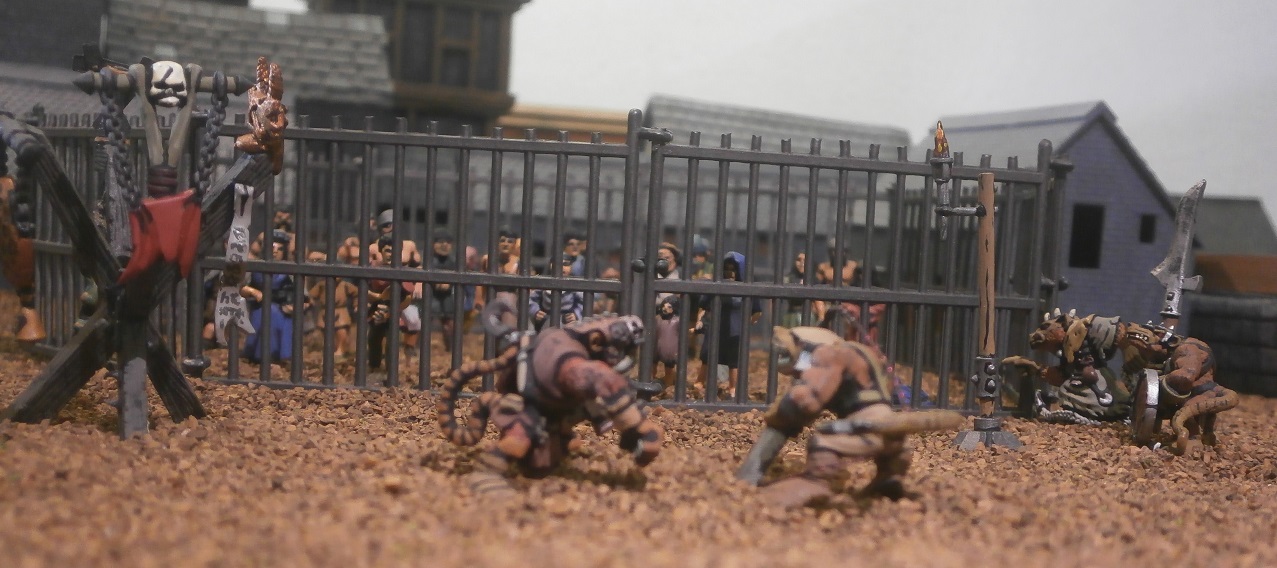
Adragash’s lips parted to bare his teeth. He clutched a long whip as did all his helps, the handle of which he rested upon his shoulder so that the twisted hemp and wire cord hung down his back. Upon his head he had a leather cap with little iron cheek plates a-dangling at the sides, and in his other hand he carried a blade in the way in which one might carry a cane.
“Calm yourself,” Adragash hissed. “I always obey and never delay. You have no need to deliver such advice-warnings. Just-simply say what should and must be done, and it will be.”
Gradger now remembered how much he disliked the overseer. Admittedly, there were few skaven, if any, he did like, but there were gradations to his antipathy, from minor irritation to deep loathing, and Adragash was on the higher end of the scale. Still, this was the overseers’ domain, and all the skaven around were his to command, and so (as almost always) his dislike was something he had to make at least some effort to conceal.
“The chattel-slaves,” he said, pointing needlessly at the crowded cage that had been erected in the square, “they needs-must be prepared.”
Agradash did not move, nor did he speak, merely narrowed his eyes a little.
“Well,” said Gradger more loudly. “Prepare them!”
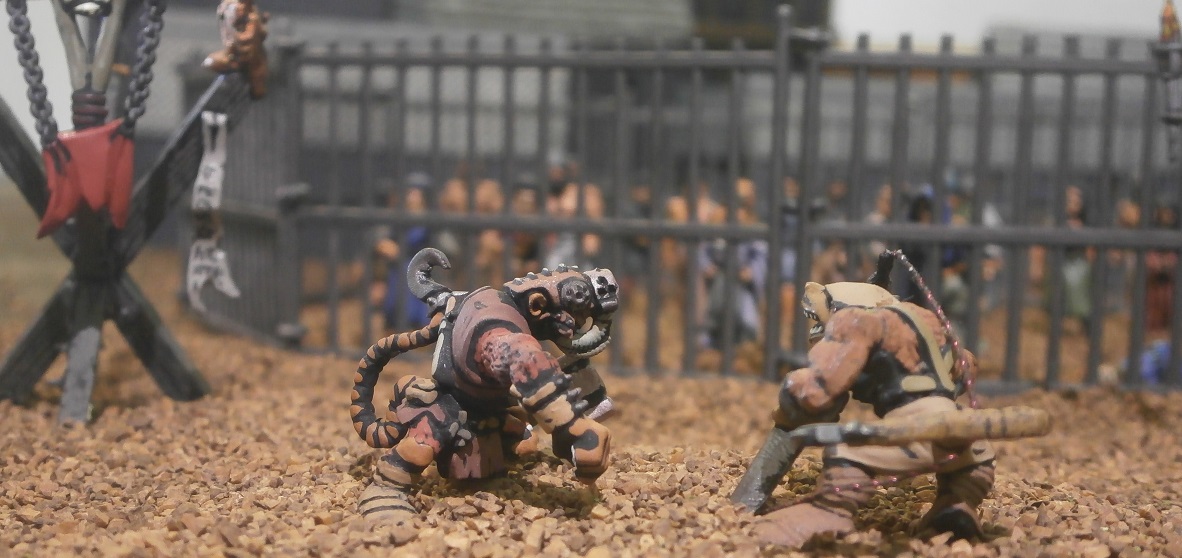
“I will do so, most keen and carefully. But you must speak-say more, Gradger-friend. For here they are, penned and patient, awaiting our command-orders. But what is the order? Are they to be fed? Moved? Made ready for labour-work? Speak-reveal exactly what the lord-master requires.”
Gradger was mentally lifting Adragash’s name up his list, to join those he despised the very most.
“They must be moved, made ready to be butchered if-when the order is given,” he said.
“Then they will be, I promise and assure,” answered the overseer. “But where to go? And how to kill?”
“They are to be made examples of, if necessary-needed” said Gradger. “Outside the city walls. I will show you where.”
“Examples ‘if necessary’? ‘If needed’?” said Adragash, in a curious tone. “How so? For whom? And why?”
“No question-talk is required. Only dutiful obeisance, yes?” said Gradger in a commanding manner.
“At least,” asked the overseer, “if nothing more, reveal-tell how they are to be butchered, so that preparations might be made for a suitable, satisfactory and swift execution of their execution.”
“Their corpses are to adorn-decorate the land around the city, to strike fright-fear into any foe that approaches.”
“Is this enemy expected or one that might merely perhaps come?” asked Adragash.
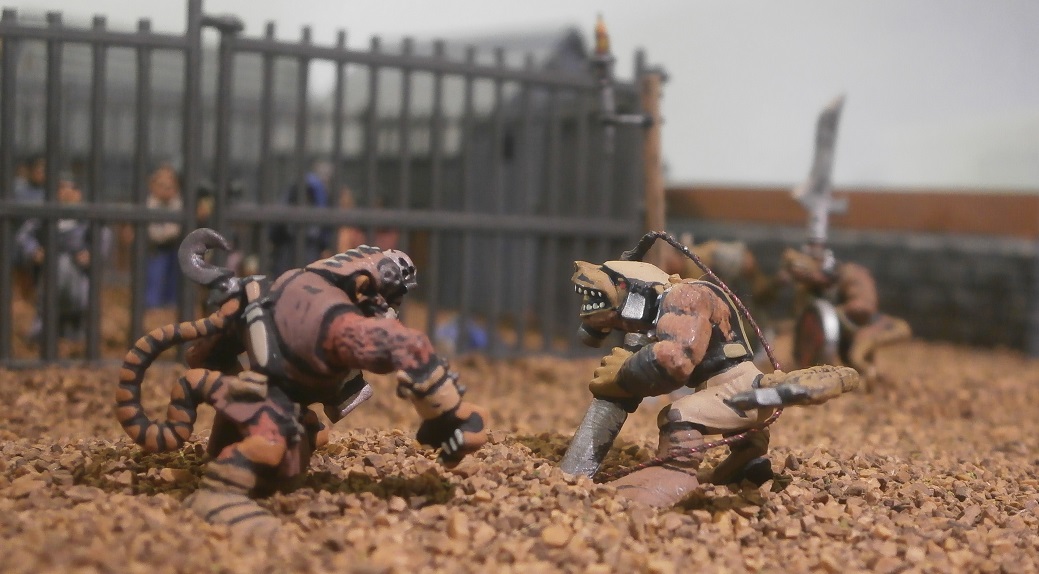
For a moment Gradger’s urge to appear important and informed got the better of him, and instead of again insisting on Adragash’s immediate action, he said,
“Manthing riders have been seen close-near to the city. Perhaps outrider-scouts for an army bringing aid-relief too late? If-when that army does arrive, they are to witness what is promised to be done to them, so they know terror-fear.”
“Grisly deaths and mangled corpses?” suggested Adragash.
“Yes, yes! They are to be stake-skewered and left to stink-rot,” said Gradger.
“Stakes, you say-speak,” said the overseer, his curious tone carrying a hint of sarcasm. “Stakes yet to be made?”
“Yes, yes. You must make them and you must place them. The soldiers have much else to do and are to be ever and always ready for battle.”
“The chattel-slaves will make their own stake-skewers,” said Adragash. “If necessary, if needed, then they will be put upon them. If not, then both stakes and chattel will further serve the lord-master howsoever we wish-desires.”
Momentarily satisfied that at last the order had been delivered and apparently accepted, Gradger looked over at the iron-railed pen. He was confused. It would be sufficient to hold meat animals like swine and goats, but surely, if they tried, the manthings could climb over? Then he noticed two of the overseers’ servants close the cage, and inside, a manthing lying prone, and he understood immediately what happened to those foolish enough to attempt to climb the iron railings - one sharp thrust of a halberd and the attempted escape would be ended.
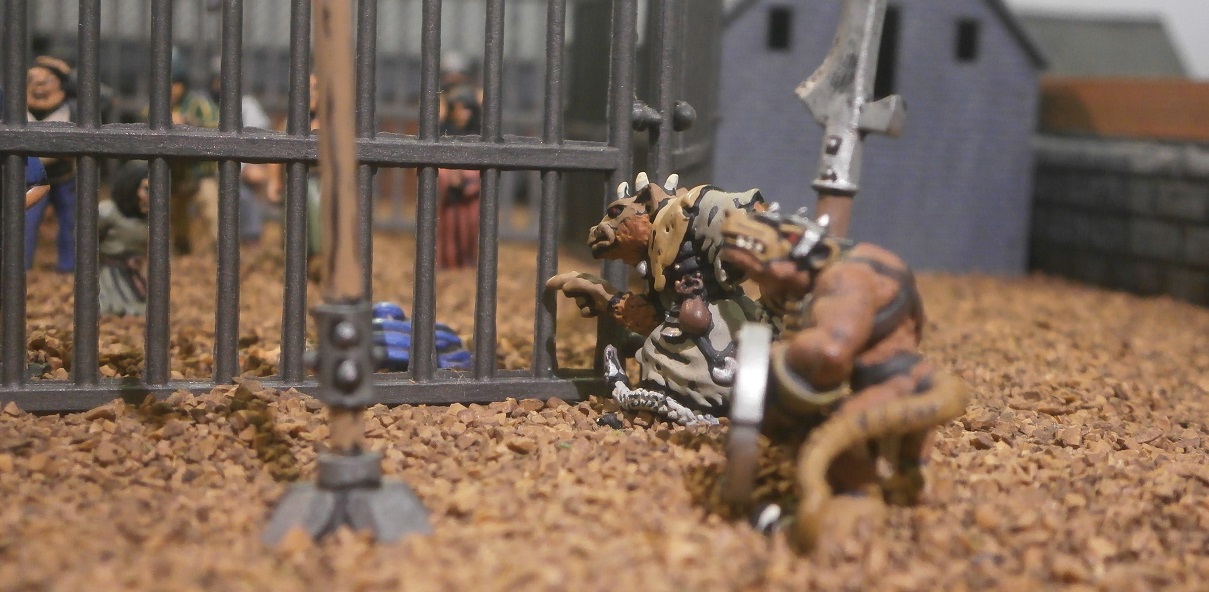
Suddenly he noticed that most of the living chattel-slaves were looking not at the freshly fashioned corpse, but at him and Adragash.
“They stare and glare,” he said. “Those there and there, they are looking at us. They have defiance-rebellion left in them, yes, yes?”
Adragash grinned. “They do. Yet, Gradger friend, this is not so bad. What strength of will they harbour-possess reveals a strength left also in their bodies. That will be necessary-needed to cut, carry and carve well.”
Gradger was not convinced. One of the females had fixed her gaze upon him, and despite her lack of fangs and the absence of red in her eyes, he could clearly see her hate-anger. “If they have such resistance-rebellion left in them, then they will surely not make their own skewer stakes.”
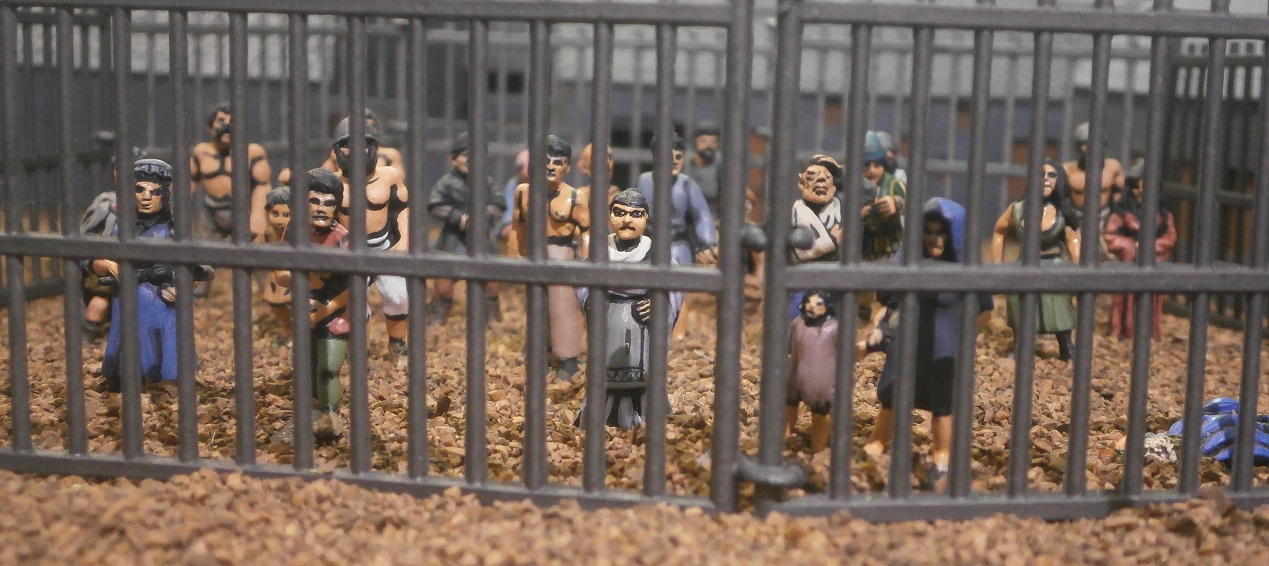
“No, they will not. But when they are told to make stakes for a palisade meant to skewer-spit the enemy’s horses, and that if their work-labour is done fast-quick they will be allowed to eat, then they will have motive to work as well as the required strength.”
In that moment, despite his dislike of the overseer, Gadger understood why Adragash had been given command of the chattel-slaves.
...
Examples
Ravola, Spring 2404
Gradger sounded breathless when he arrived in the square, but this indicated nothing for certain as the wheezing function of his mask always made him sound so. He made his way immediately to the chattel overseer, Adragash.
“I have order-commands from the lord-master himself. You must obey prompt-quick. Yes, yes?”

Adragash’s lips parted to bare his teeth. He clutched a long whip as did all his helps, the handle of which he rested upon his shoulder so that the twisted hemp and wire cord hung down his back. Upon his head he had a leather cap with little iron cheek plates a-dangling at the sides, and in his other hand he carried a blade in the way in which one might carry a cane.
“Calm yourself,” Adragash hissed. “I always obey and never delay. You have no need to deliver such advice-warnings. Just-simply say what should and must be done, and it will be.”
Gradger now remembered how much he disliked the overseer. Admittedly, there were few skaven, if any, he did like, but there were gradations to his antipathy, from minor irritation to deep loathing, and Adragash was on the higher end of the scale. Still, this was the overseers’ domain, and all the skaven around were his to command, and so (as almost always) his dislike was something he had to make at least some effort to conceal.
“The chattel-slaves,” he said, pointing needlessly at the crowded cage that had been erected in the square, “they needs-must be prepared.”
Agradash did not move, nor did he speak, merely narrowed his eyes a little.
“Well,” said Gradger more loudly. “Prepare them!”

“I will do so, most keen and carefully. But you must speak-say more, Gradger-friend. For here they are, penned and patient, awaiting our command-orders. But what is the order? Are they to be fed? Moved? Made ready for labour-work? Speak-reveal exactly what the lord-master requires.”
Gradger was mentally lifting Adragash’s name up his list, to join those he despised the very most.
“They must be moved, made ready to be butchered if-when the order is given,” he said.
“Then they will be, I promise and assure,” answered the overseer. “But where to go? And how to kill?”
“They are to be made examples of, if necessary-needed” said Gradger. “Outside the city walls. I will show you where.”
“Examples ‘if necessary’? ‘If needed’?” said Adragash, in a curious tone. “How so? For whom? And why?”
“No question-talk is required. Only dutiful obeisance, yes?” said Gradger in a commanding manner.
“At least,” asked the overseer, “if nothing more, reveal-tell how they are to be butchered, so that preparations might be made for a suitable, satisfactory and swift execution of their execution.”
“Their corpses are to adorn-decorate the land around the city, to strike fright-fear into any foe that approaches.”
“Is this enemy expected or one that might merely perhaps come?” asked Adragash.

For a moment Gradger’s urge to appear important and informed got the better of him, and instead of again insisting on Adragash’s immediate action, he said,
“Manthing riders have been seen close-near to the city. Perhaps outrider-scouts for an army bringing aid-relief too late? If-when that army does arrive, they are to witness what is promised to be done to them, so they know terror-fear.”
“Grisly deaths and mangled corpses?” suggested Adragash.
“Yes, yes! They are to be stake-skewered and left to stink-rot,” said Gradger.
“Stakes, you say-speak,” said the overseer, his curious tone carrying a hint of sarcasm. “Stakes yet to be made?”
“Yes, yes. You must make them and you must place them. The soldiers have much else to do and are to be ever and always ready for battle.”
“The chattel-slaves will make their own stake-skewers,” said Adragash. “If necessary, if needed, then they will be put upon them. If not, then both stakes and chattel will further serve the lord-master howsoever we wish-desires.”
Momentarily satisfied that at last the order had been delivered and apparently accepted, Gradger looked over at the iron-railed pen. He was confused. It would be sufficient to hold meat animals like swine and goats, but surely, if they tried, the manthings could climb over? Then he noticed two of the overseers’ servants close the cage, and inside, a manthing lying prone, and he understood immediately what happened to those foolish enough to attempt to climb the iron railings - one sharp thrust of a halberd and the attempted escape would be ended.

Suddenly he noticed that most of the living chattel-slaves were looking not at the freshly fashioned corpse, but at him and Adragash.
“They stare and glare,” he said. “Those there and there, they are looking at us. They have defiance-rebellion left in them, yes, yes?”
Adragash grinned. “They do. Yet, Gradger friend, this is not so bad. What strength of will they harbour-possess reveals a strength left also in their bodies. That will be necessary-needed to cut, carry and carve well.”
Gradger was not convinced. One of the females had fixed her gaze upon him, and despite her lack of fangs and the absence of red in her eyes, he could clearly see her hate-anger. “If they have such resistance-rebellion left in them, then they will surely not make their own skewer stakes.”

“No, they will not. But when they are told to make stakes for a palisade meant to skewer-spit the enemy’s horses, and that if their work-labour is done fast-quick they will be allowed to eat, then they will have motive to work as well as the required strength.”
In that moment, despite his dislike of the overseer, Gadger understood why Adragash had been given command of the chattel-slaves.
Lands Annex
Vassal
Superb as always!
Hope you have a good festive season!
Hope you have a good festive season!
symphonicpoet
Moderator
Delightful and terrifying Padre. As always.  I understand that this plague has been a bale to us all, but the year of the rat will pass soon and with luck the ox will treat us better. Let us work-prepare for a new game-contest.
I understand that this plague has been a bale to us all, but the year of the rat will pass soon and with luck the ox will treat us better. Let us work-prepare for a new game-contest.
Be well, Padre. And thank you for this.
Be well, Padre. And thank you for this.
Padre
Lord
Thanks, Symphonic and Lands! I hope you two can extract some merriment out of the holidays too!
I wanted to get this next story out of the way so that I can then get the GMinng out of the way and maybe even run a play by-e-mail battle over the holidays.
This one, deceptively simple, was an ambitious one to put together. Hope you all like it.
------------------------------------------------------------------------------------------------------------------------------------
Some Too Late and One Too Early
Northern Tilea, Spring 2404
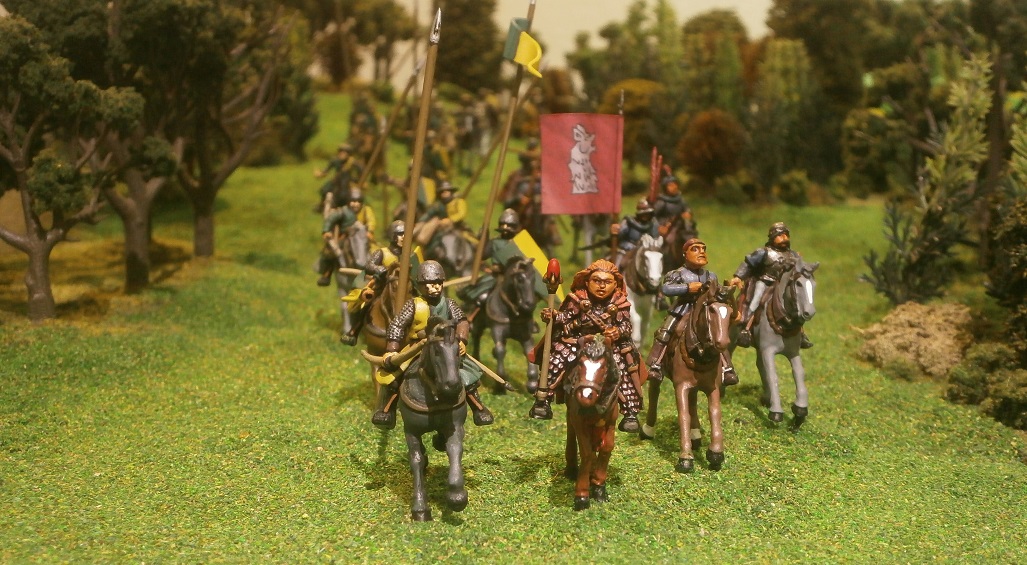
They made their way along the lesser-known paths in the woods, some of which were so well hidden that they had to push their way through the undergrowth to access them. Their new friends asked them not to cut the branches as they did so. Once they were on the secret sylvan byways, however, they were able to ride at a pace. Captain Gesualdi had informed Perrette that some of the paths, the wider and more level ones, were the remains of ancient roads from the time when Remas ruled the entire peninsula and many lands beyond. The stonework had long since sunk beneath the ground, but for considerable stretches there was a surprising lack of trees, even saplings, to hinder them. She began to suspect this was not by chance, and that their new companions had a hand in ensuring these passageways remained relatively clear, all the better to enable speedy, secretive forays.
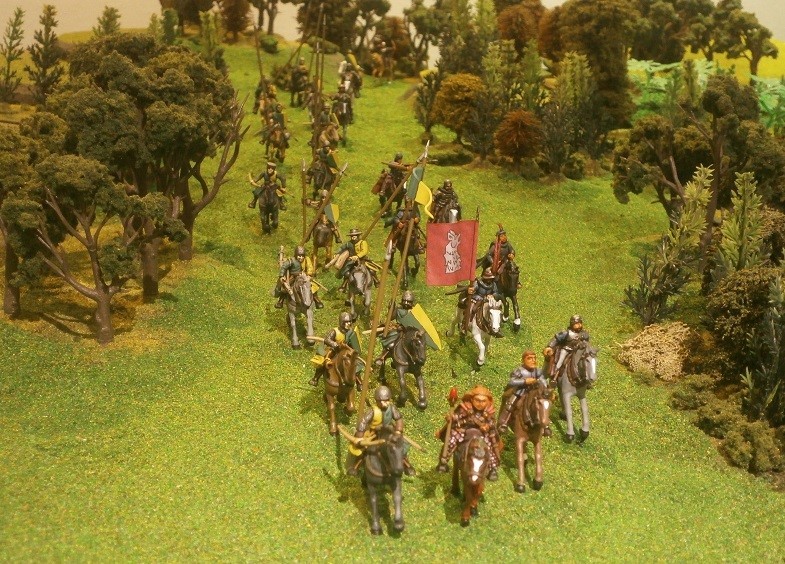
Having met their new friends a week ago, Perette and the last of her Brabanzon had spent most of the intervening time searching for any other comrades who had escaped the assault on Ravola, with some success. She now had with her most of the company’s riders, a small band of archers and a handful of the camp followers. She was afraid that no-one else had escaped. They had failed to find even one of the young baron’s retinue of knights. It pained her to think of the poor souls she and the baron had led to the city, and all the others who came there when told it was safe to return now that the ogres were gone. A surprising number had come out of hiding, bedraggled and thin, like wilderness hermits on the edge of starvation. All these were now most likely suffering cruelties at the ratmen’s clawed hands. Horrifying as the thought was, it occurred to her that perhaps the best they could hope for was a quick death, being butchered for their flesh. During the fight she had seen several monstrous creatures amongst the enemy’s number that bore horrible scars and blemishes, with patches of iron somehow riveted onto their very skin, even piercings to allow intestine-like tubes to penetrate their bodies! If they could do that to their own kind, what might they do to prisoners? Better death than such mutilation.
Every night since the flight she had slept badly, even when her new friends had offered her relative safety. She would toss and turn for two hours or so as her mind raced, considering what she could and should have done different, and when she finally slipped into brief, fretful sleep she dreamt only of the battle. She had come to Tilea expecting to face ogres, ostensibly to assist in the reclamation of a realm for a less cruel master and to save what poor souls had been enslaved by the brutes. When that work had been done, however, she had first learned that vampires were also ravaging great swathes of Tilea, and had then, only weeks after ridding Ravola of ogres, been driven from the city by an army of ratmen. This land had been cursed thrice over!
Although it was less than a year ago, it felt like a decade since Perrette had departed Bretonnia. When she set off to cross the high pass into Tilea, she merely wanted to escape Bretonnia, to put her old life behind her and find a new, hopefully better one. Joyously carousing with the Brabanzon one raucous night she found them to be better company than either peasants or noblemen, and not at all as uncouth and callous as one might expect of such a mercenary band. Indeed, she had discovered that the Brabanzon, at least those there that night, possessed an unexpected yet welcome decency, however deeply concealed beneath their swaggering bravado, cruel jests and coarse language. When they told her they were employed to travel to Tilea she had not hesitated in choosing to go with them, despite having no contract herself. Leaving Bretonnia as little better than a camp follower, since the second assault on Campogrotta (and by the Brabanzon’s own choosing) she had come to command the whole company. At least, what was left of it now.
The Brabanzon’s new allies were a mysterious bunch, whose number she had yet to estimate, nor had she ascertained who truly commanded them. The particular band they travelled with had a leader, being the burly Captain Valfrido Gesualdi, but although he had said nothing concerning the matter, something told her that he served another. The name they called themselves – the Arrabbiati, or ‘Angry Ones’ – she had heard during her brief time in Campogrotta when one of the city’s inhabitants had asked her if the reason the Arrabbiati were not amongst the army was because the dwarfs refused to accept their help. During the short conversation that followed she had learned that during the Campogrottans’ time as slaves of Boulderguts’ ogres there had been several incidents of sabotage and assassination against the brutes and it had been generally believed that the Arrabbiati had been behind the deeds. For more than a decade, the brigand band had earned a reputation amongst the common, labouring folk for robbing the most arrogant and tyrannical of the nobility and the greediest of the merchant families – leaving nothing behind but bodies and whichever of their red-fletched arrows had snapped. What with Boulderguts being the very worst of tyrants, his man-eating brutes the most merciless of oppressors, then surely, said her informant, the Arrabbiati would target them? Although at the time she thought it sounded like wishful thinking, it seemed likely that for want of anyone else to rob a band of outlaws might be forced to rob instead from the ogres. Later she learned that they might indeed possess some truly noble motivations, for it was said they been decimated when they had ridden out of nothing but love for the Duchess Maria (regarded as an enlightened and fair ruler, before she became a vampire) to assist in the fight against the vampire Duke Alessandro’s army.
A broad-shouldered man, with a chin as wide as his cheeks, Captain Gesualdi was armed with a bow like the rest of his men but had a scarf about his head instead of a helmet. Like his entire company, he wore dark clothes - his tunic being a dull shade of purple, his scarf burgundy.
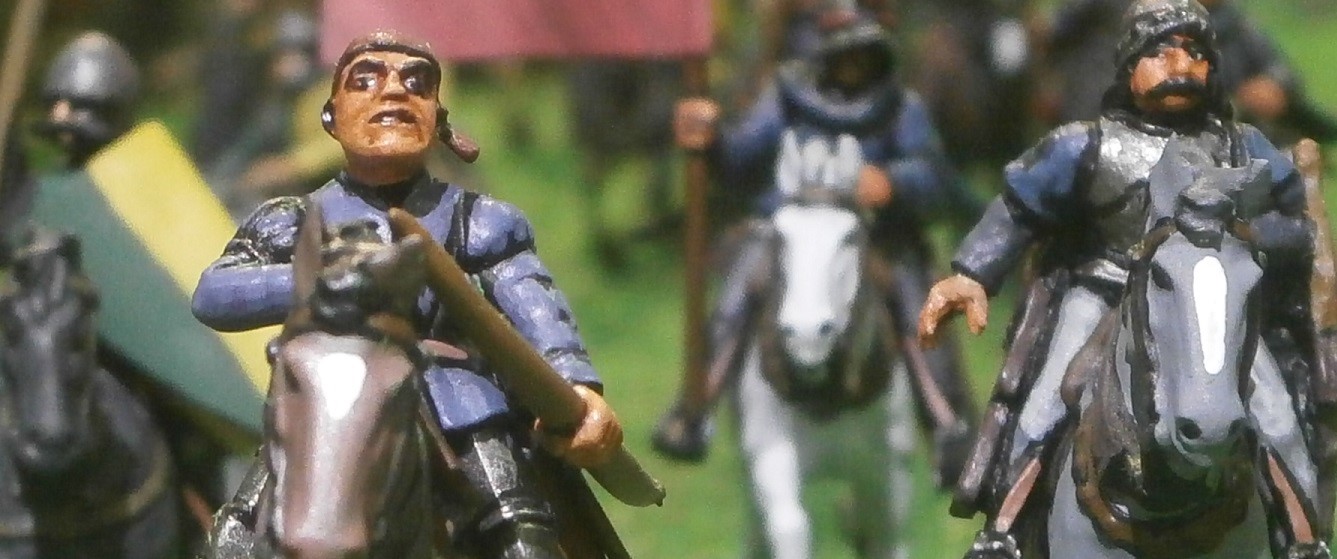
Back in Campogrotta Perrette heard one inhabitant refer to the Arrabiatti as the Brotherhood of the Shadows, and it seemed they were indeed suitably dressed to lurk unseen during their nocturnal and crepuscular activities. Some of their horses, however, were white, so either they only hid in shadows when creeping about on foot, or the habit was an affectation to suit their reputation, or, and this surely was most likely, they were loath to waste good horses when they got them.
Their standard was that of a wolfshead, argent upon a sanguine field.
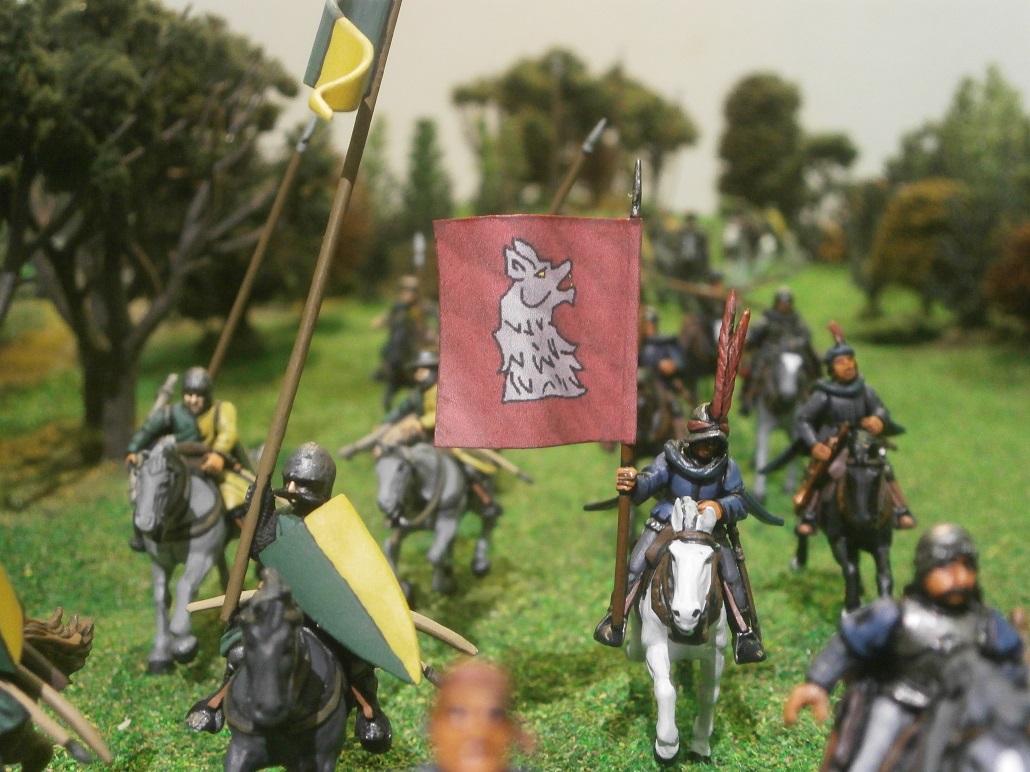
Their modus operandi indicated that this was not a wolf like the white one of Middenland – the forever brawling, bloody, winter wolf of Ulric. Instead, this was a hungry wolf, carefully choosing which prey to stalk and howling at the moon when there were none for miles to hear. The Arrabiatti disparagingly called it the mutt. When the mutt was mounted, they all had to make ready to move. Twice now she had heard them say, ‘Meet at the mutt’, an action made all the easier by the fact that the company’s horn blower always travelled with their standard bearer. Of course, the horn had a sound like a wolf howling.
Now Perette had met them, they seemed so far to warrant their heroic reputation. ‘Goodfellows all,’ they had called themselves at their first encounter, and they did not hesitate to help her and the fleeing Brabanzon. They had offered victuals and shelter, then assisted in the finding of the other Brabanzon survivors. Now they were guiding them by way of these obscure paths away from the city to put them safely on the road back to Campogrotta. In return, they had asked for nothing - at least, not yet. Her own Brabanzon would also have found it in them to help strangers in need, but the matter of remuneration would definitely have been broached long before now! Captain Gesualdi had even gifted her a coat of scale armour which he said would not interfere with her magics for it had once been the property of a wizard. When she asked how it had come into his possession, he answered with a grin that she should not look a gift horse in the mouth.
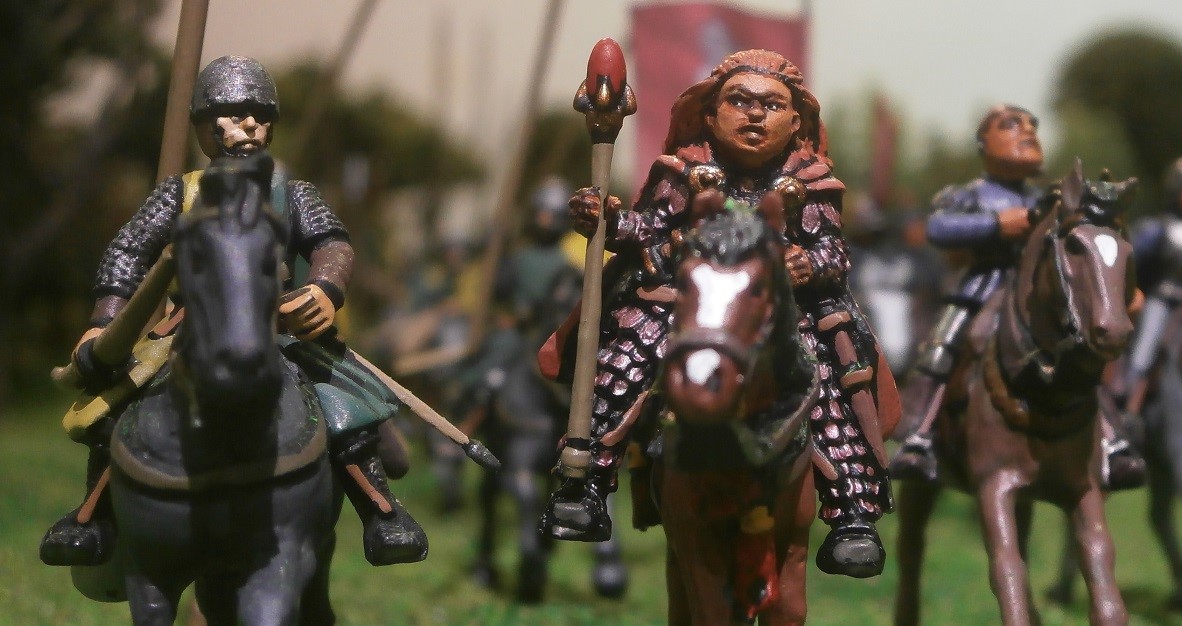
Three days before, with surely little prospect of profit from a city that had nothing of value left in it when they arrived, and with even less now that the ratmen had infested and consumed it, the captain had dispatched several of his men to scout much closer to the city, out of concern that the ratmen might be preparing to march from the city. She offered some of her own soldiers to accompany the Arrabbiati scouts, for they had recent knowledge of the lay of the land, but Gesualdi had insisted that his men knew the area like the ‘back of their hands’ and that the Brabanzon would do better to scout ahead as they made their way south, searching for any last remaining escapees wandering the wilds.
Perette’s second in command, Osmont, rode much of the way beside her. The riders had previously been commanded by a Sergeant Huget, but he was missing in action, believed to have been shot from his horse by one of the enemy’s long-barrelled muskets before getting out of sight of Ravola’s walls. The man who reported this had died of his wounds only minutes after imparting the news, and so none could now ask him if he was certain! Even if Huget turned up, however, Perrette would keep Osmont as her second, which would put him in command of the riders.
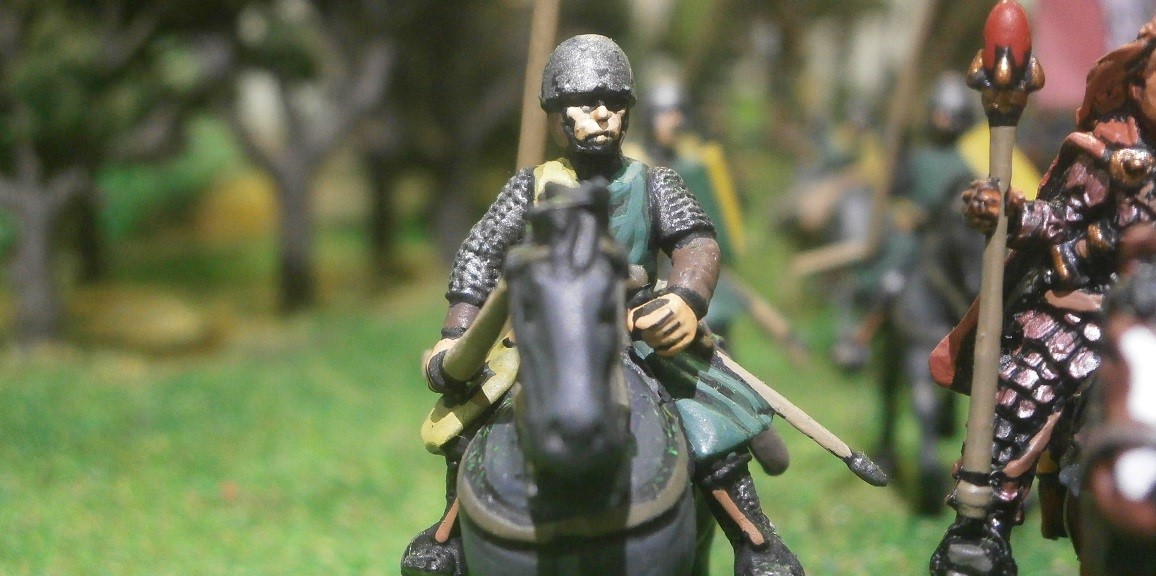
Osmont had an easy relationship with her, often joking - doing so whenever he thought she needed such to lift her spirits but falling quiet when she had a need for sombre contemplation. He had been there in the typpling room of the inn when she first met the company and from the start he seemed to see something in her that she herself had not really been aware of. He was also quite protective. On two occasions, including that first night, he had, with the slightest shake of his head, subtly signalled that the man she was getting close to was not someone she should favour! A veteran of many a war, or at least, many a bloody squabble between this baron and that marquis, he had a calm confidence about him, and a watchfulness. During the fall of Ravola it was he who had understood it was time to leave – not in the sense of being panicked into fleeing, but rather in assessing the situation and recognising that they were beaten.
…
Early in the afternoon a cry was heard from the column of riders behind.
“Ho! Riders! To the left.”
At first, Perrette could see nothing but trees, but then she caught a flashing glimpse of something in motion through the foliage.
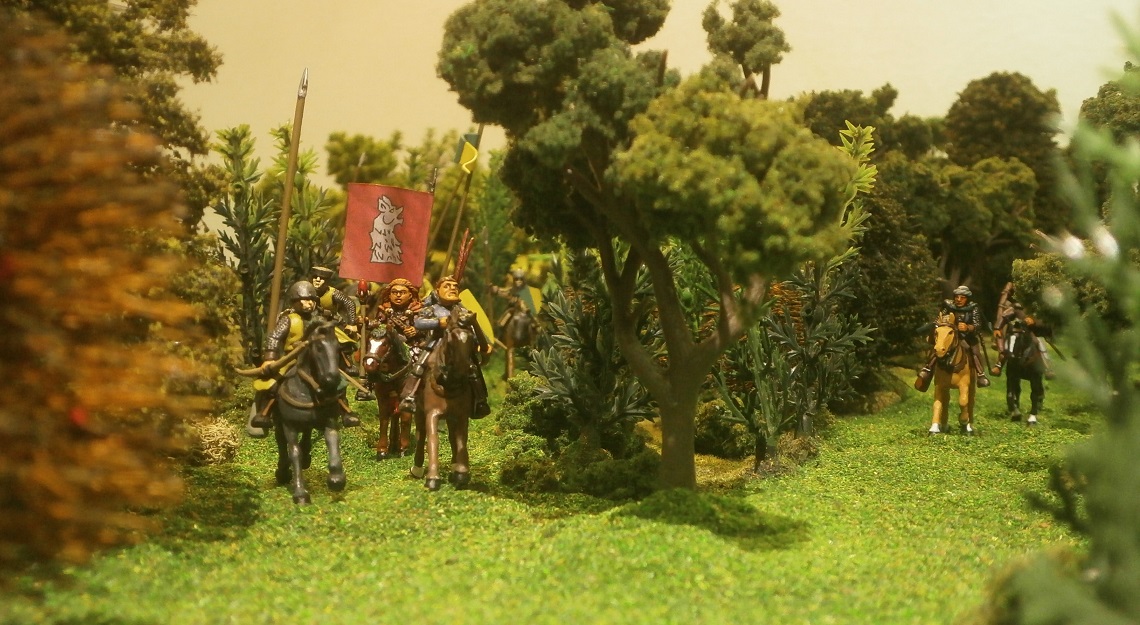
“It’s Iginio!” came the same voice again.
“That it is!” came an answering cry. A few moments later the three Arrabiatti scouts emerged from a smaller path which joined the main group’s own route like a tributary stream might merge with a river.
The chief scout, Iginio, wore a dark cloak like many of his comrades and rode a chestnut mount. He came right up to the front of the column to ride beside Perrette and Captain Gesualdi.
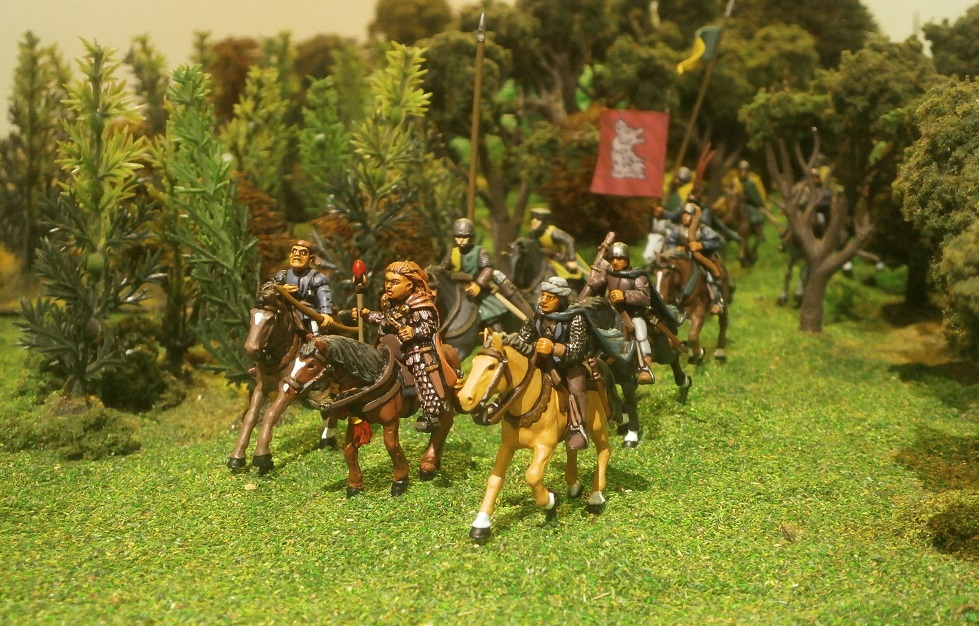
“Good captain, my lady, well met!” he said by way of greeting.
“Glad to see you back, Iginio,” said the captain. “Did you get close to the city? The enemy?”
“And the people? What about them?” added Perrette.
“We got close, captain,” said the scout. “Close enough for some of the ratmen to espy us, which is when we left. Apart from a few poor wretches, no more than a dozen, shifting stones under guard where a tower has collapsed, we saw no other people, my lady. There was acrid smoke coming from within, the stink of burning hair and flesh. They must have been burning either beasts or people.”
“Is their entire force still present?” asked the captain.
“Aye, I reckon it is,” said Iginio. Then he addressed Perrette directly. “My lady, you told us they had no war machines?”
“None,” said Perrette. “They took the walls by weight of numbers and had just enough to do so. We battered them badly, killing so many, yet still they came. I pray to all the gods it was their fur you smelled burning.”
“I wish I could affirm that. What I can report is that they do have machines now.”
“They must have lagged behind on their march,” suggested the captain. “Which means they attacked before their full force was mustered, before they had that which could shoot upon the walls.”
“Perhaps arrogance convinced them they would win?” said Perrette. “And that we would not prove a troublesome foe.”
“If so, they learned their lesson, my lady,” said the captain. “From all accounts you put them to far more trouble than an equal number of any other soldiers could have done. The ratmen are bullies, cruel and cunning. They do possess a species of arrogance, for they think they are the only creatures worthy of living in the world. But they are not brave. They rely on strength of numbers in battle, and on terrible machines that can conjure lightning itself. They first bombard their foes, then quickly swarm to overwhelm them before they can recover. There must have been a pressing reason for their haste. It’s likely they were worried you were soon to be reinforced.”
“We did send for help, from Campogrotta. But they attacked long before our messengers could possibly have arrived.”
“My lady, help was sent,” said the scout. “We met with a force from Campogrotta, both heavy and light horsemen, and even some dwarfs following them, catching up every night to sleep for half the time the men did.”
“Compagnia del Sole soldiers?” asked Perrette.
“Aye, my lady, they were. Dispatched from Campogrotta to relieve Ravola but arriving four days too late. They’d scouted the enemy too and were about to return.”
This made little sense to Perrette. Neither the messengers she sent to Campogrotta nor any force of mounted men at arms and dwarfs could possibly have travelled fast enough. The distance was too great. She knew because she had made the journey herself. Even on secret paths such as these for part of the way, it could not be done. Which meant the Compagnia soldiers must have set off long before her messengers arrived. Then it occurred to her – perhaps the soldiers were already on their way for some other reason, and they met her messengers part way?
“Master scout,” she asked. “When you spoke to them, did they say they were ordered from Campogrotta to ride to Ravola’s relief?”
“Yes, my lady. Someone from Ravola came to them and begged that the whole Compagnia go north to your aid. Their captain general sent the riders and dwarfs ahead to learn what they could. They claimed not to know if the commander was following with the rest of the army.”
Perrette held her tongue, but what the man was saying was impossible. Apparently Osmont had not considered the mathematics of the claim, for he asked,
“Master scout, the dwarfs – did you meet with them?”
“Not to speak to. Their commander, I think, was named Greyfury.”
Osmont laughed which made the others look. “He could not bear to be parted from his true love,” he said.
While the others wondered what he could mean, Perette just rolled her eyes and gave Osmont a look meant to silence him. She did not think these men were currently in the mood to entertain private jests. Almost as if she were precognitive, the scout Iginio’s tone changed.
“There was something else we saw. Strange indeed, if truth be told. When we drew close to the city we passed over a long patch of poisoned ground, where all the plants had withered as if baked by a hot sun for many days.”
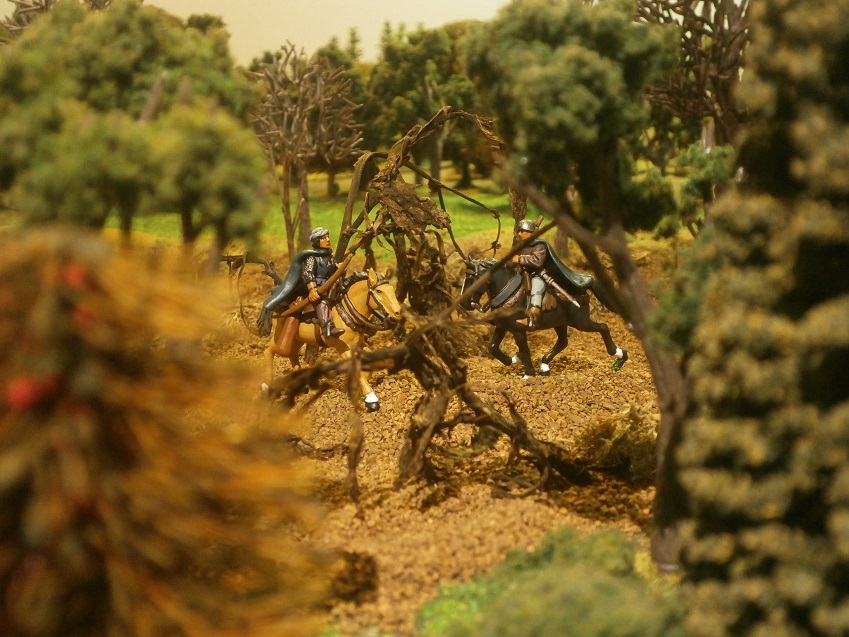
“We could plainly see no animals had trespassed upon it. There were tracks passing along it, as if left by three large wagons. They had crushed some small trees while brushing past others, so that their blackened remnants still remained erect but sagging. Our mounts became fearful, acting most contrary and we ourselves felt a sudden imbalance in our humours …”
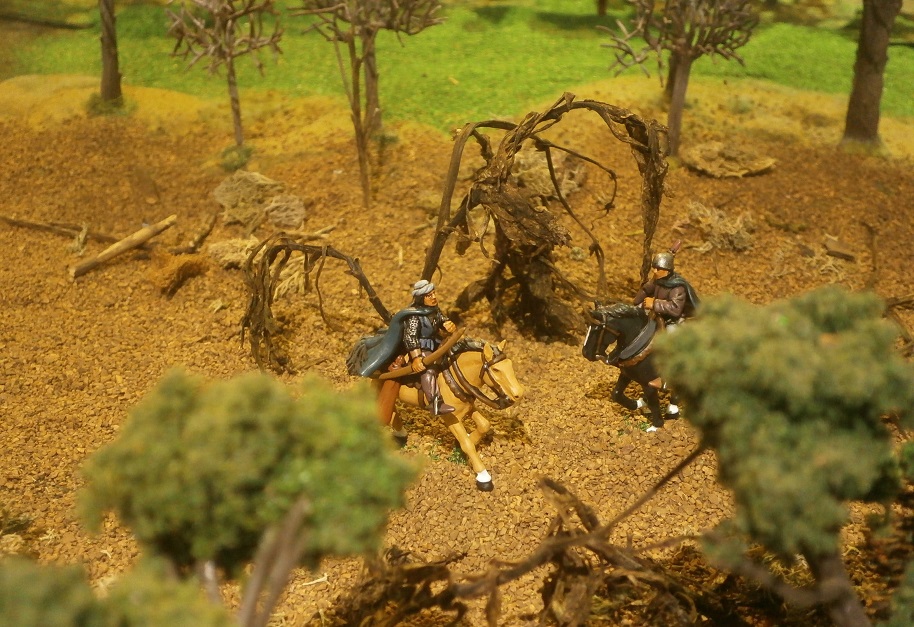
“We did not linger. I don’t think we could have done if we tried. Saladino’s stomach ain’t been right since. We went over it and on, thinking that some poisonous ratman taint must have been released there, a magical curse cast by something on the wagon or some spillage of aqua fortis or the like. Perhaps the ratmen spread corruption from the wagons, as if scattering the very opposite of seeds - sowing death instead of new life? After spying upon the city walls, we chose a different path back, all the better to learn as much as we could of the enemy’s disposition, but mostly to avoid the tainted ground. Yet we again encountered an exactly similar strip of corruption! Loathe to cross it, men and mounts alike, we thought to skirt around it this time. But there was no going around, for the poisoned land proved to be like unto a path, which stretched all the way at least to the first place we had crossed.”
Iginio fell momentarily silent, while the others just waited to hear what else he said.
“I cannot say for certain, but the dead path looked to follow a curved course around the city. We were unable to discover if this was true, for to linger so close to the enemy would surely have meant we were attacked, and to travel any length of time even just beside the corruption may have meant we became too ill to return. But, before we crossed back over, I reckon we got the measure of it. I’d lay all the gold I have that it goes around the entire city.”
“Some sort of magical barrier, perhaps, meant to prevent approach?” suggested Perrette.
“I think not, my lady, for we crossed it twice, there and back again, howsoever loath we were to do so the second time. I doubt anyone could travel along the length of it for more than an hour, yet crossing it takes only a few moments and so is bearable.”
Perrette now noticed the darkness around Iginio’s eyes. She saw too that his horse was sweating noticeably more than her own or the captain’s mount.
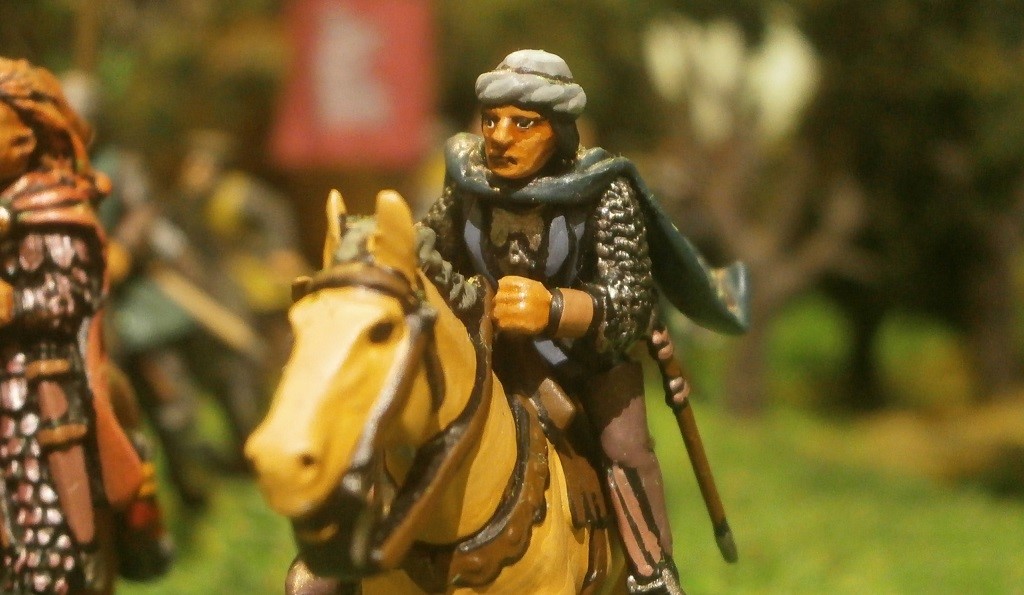
“You were exceeding brave to do so,” she said. “And all that you learned of the ratmen, the poor inhabitants and the poisoned band could prove vital to our plans.”
“Iginio,” asked the captain, “how long did you linger in that poisoned place?”
“When we first crossed, just enough time to dismount and look closely at the ground, to notice that the wagons that passed seemed to have differently sized wheels, and some very large, and that they apparently not hauled by draught animals, but of course we could have worked that out without noticing the lack of prints. When we crossed back, we wasted not a moment’s time in getting to the other side.”
“I don’t think it likely they were wagons, but rather some sort of war engines,” said Osmont. “Probably came up with the others you did see. Perhaps they were like giant censers, emitting a cloud of noxious, noisome vapour, which they intend to push at the enemy in battle? As to why they travelled round the city, I know not. Seems a great waste of effort to me just to kill a few trees and weeds.”
“We shall have to take a look at whatever made the dead path,” mused the Arrabiatti captain. “Perhaps then we will learn its true nature and purpose? In the meantime, if your friends the Compagnia soldiers are making their way back to Campogrotta, then we should take you to them.”
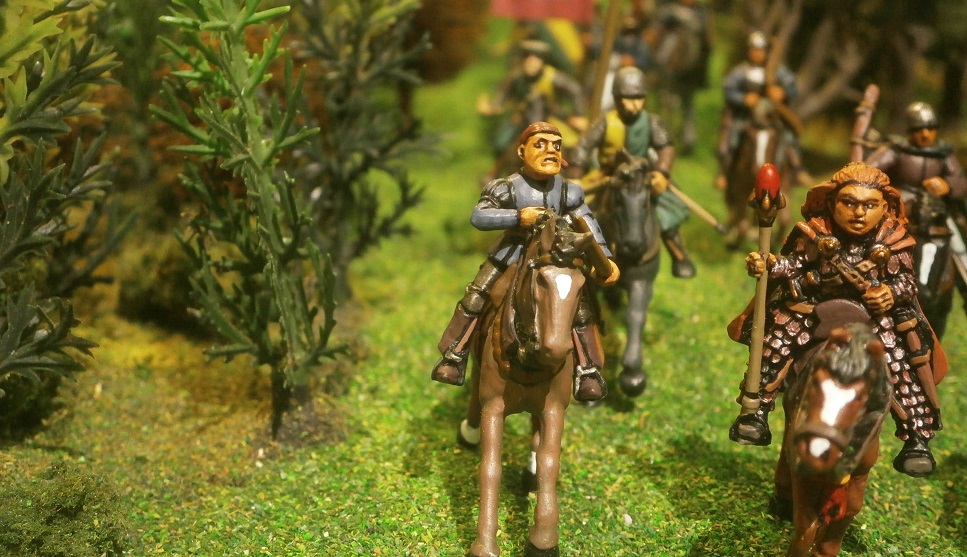
“They are not far away, captain,” said the chief scout. “Only two hour’s ride, I reckon.”
“But don’t they have a head start on us?” said Perrette.
“They do, my lady,” agreed the scout. “But they do not know the paths as well as us, and they travel with a long journey in mind, at a pace they can maintain, while we can make a dash to catch up with them.”
…
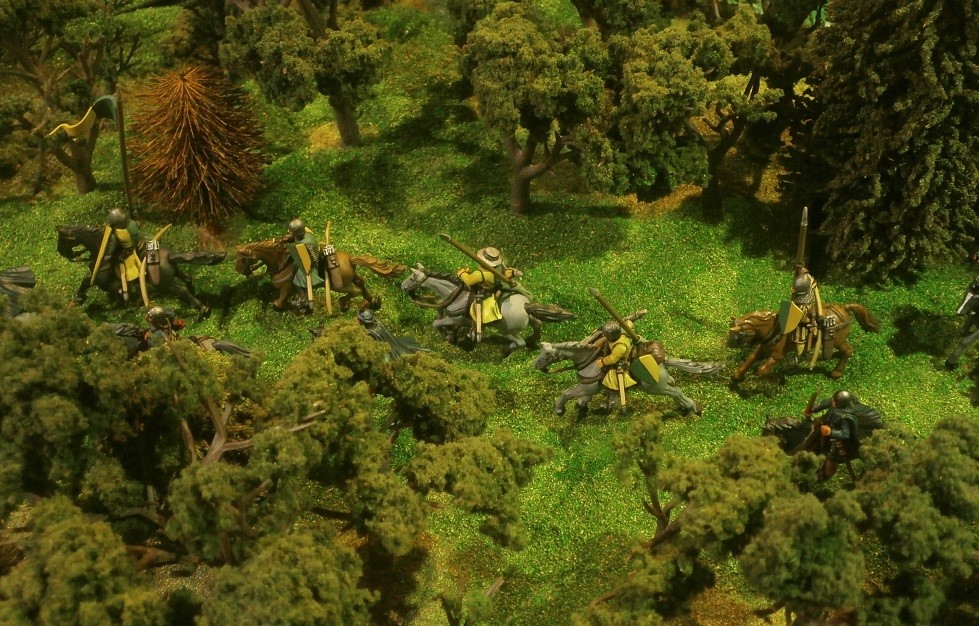
…
Two hour’s later the riders descended from a high path and rode out towards the even higher hills between them and Campogrotta. Ahead of them, where their present path met with another, they could see a company of horsemen.
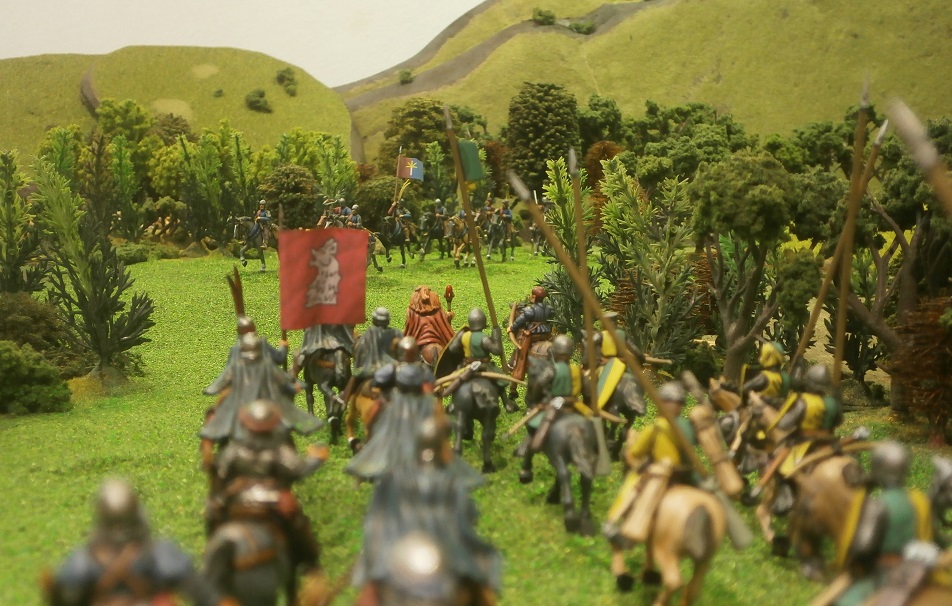
Their banner bore the white baton and half-sun emblem of the Compagnia del Sole. They looked surprised at first …
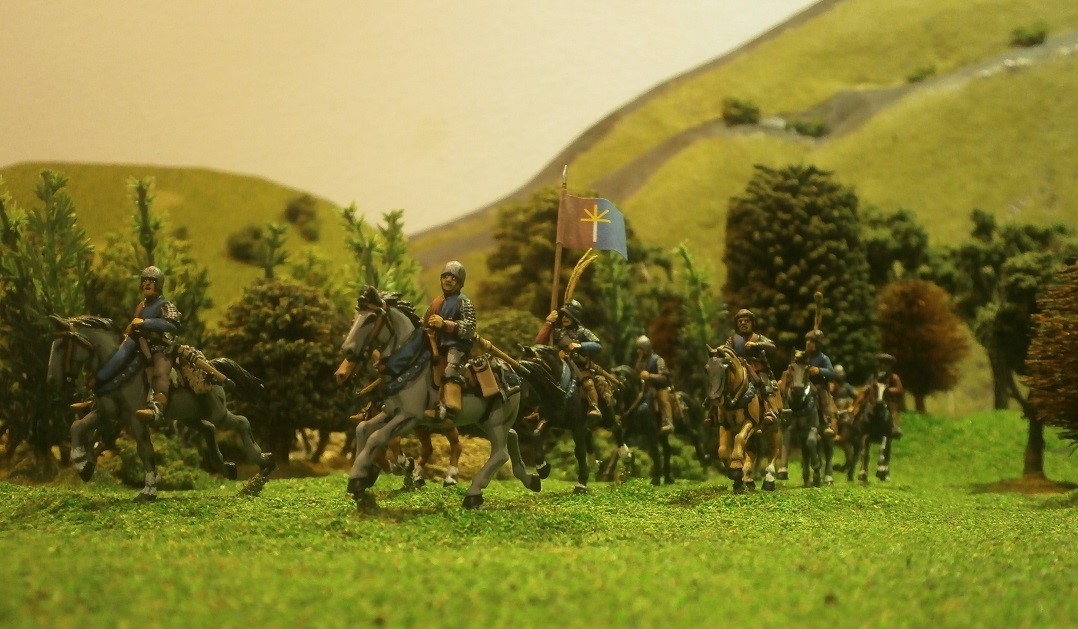
… but Perrette urged her horse out beyond the body, knowing that the soldiers would recall her from Campogrotta. Indeed, the fellow at their fore had drunkenly tried to woo her the night before she left for Ravola!
I wanted to get this next story out of the way so that I can then get the GMinng out of the way and maybe even run a play by-e-mail battle over the holidays.
This one, deceptively simple, was an ambitious one to put together. Hope you all like it.
------------------------------------------------------------------------------------------------------------------------------------
Some Too Late and One Too Early
Northern Tilea, Spring 2404

They made their way along the lesser-known paths in the woods, some of which were so well hidden that they had to push their way through the undergrowth to access them. Their new friends asked them not to cut the branches as they did so. Once they were on the secret sylvan byways, however, they were able to ride at a pace. Captain Gesualdi had informed Perrette that some of the paths, the wider and more level ones, were the remains of ancient roads from the time when Remas ruled the entire peninsula and many lands beyond. The stonework had long since sunk beneath the ground, but for considerable stretches there was a surprising lack of trees, even saplings, to hinder them. She began to suspect this was not by chance, and that their new companions had a hand in ensuring these passageways remained relatively clear, all the better to enable speedy, secretive forays.

Having met their new friends a week ago, Perette and the last of her Brabanzon had spent most of the intervening time searching for any other comrades who had escaped the assault on Ravola, with some success. She now had with her most of the company’s riders, a small band of archers and a handful of the camp followers. She was afraid that no-one else had escaped. They had failed to find even one of the young baron’s retinue of knights. It pained her to think of the poor souls she and the baron had led to the city, and all the others who came there when told it was safe to return now that the ogres were gone. A surprising number had come out of hiding, bedraggled and thin, like wilderness hermits on the edge of starvation. All these were now most likely suffering cruelties at the ratmen’s clawed hands. Horrifying as the thought was, it occurred to her that perhaps the best they could hope for was a quick death, being butchered for their flesh. During the fight she had seen several monstrous creatures amongst the enemy’s number that bore horrible scars and blemishes, with patches of iron somehow riveted onto their very skin, even piercings to allow intestine-like tubes to penetrate their bodies! If they could do that to their own kind, what might they do to prisoners? Better death than such mutilation.
Every night since the flight she had slept badly, even when her new friends had offered her relative safety. She would toss and turn for two hours or so as her mind raced, considering what she could and should have done different, and when she finally slipped into brief, fretful sleep she dreamt only of the battle. She had come to Tilea expecting to face ogres, ostensibly to assist in the reclamation of a realm for a less cruel master and to save what poor souls had been enslaved by the brutes. When that work had been done, however, she had first learned that vampires were also ravaging great swathes of Tilea, and had then, only weeks after ridding Ravola of ogres, been driven from the city by an army of ratmen. This land had been cursed thrice over!
Although it was less than a year ago, it felt like a decade since Perrette had departed Bretonnia. When she set off to cross the high pass into Tilea, she merely wanted to escape Bretonnia, to put her old life behind her and find a new, hopefully better one. Joyously carousing with the Brabanzon one raucous night she found them to be better company than either peasants or noblemen, and not at all as uncouth and callous as one might expect of such a mercenary band. Indeed, she had discovered that the Brabanzon, at least those there that night, possessed an unexpected yet welcome decency, however deeply concealed beneath their swaggering bravado, cruel jests and coarse language. When they told her they were employed to travel to Tilea she had not hesitated in choosing to go with them, despite having no contract herself. Leaving Bretonnia as little better than a camp follower, since the second assault on Campogrotta (and by the Brabanzon’s own choosing) she had come to command the whole company. At least, what was left of it now.
The Brabanzon’s new allies were a mysterious bunch, whose number she had yet to estimate, nor had she ascertained who truly commanded them. The particular band they travelled with had a leader, being the burly Captain Valfrido Gesualdi, but although he had said nothing concerning the matter, something told her that he served another. The name they called themselves – the Arrabbiati, or ‘Angry Ones’ – she had heard during her brief time in Campogrotta when one of the city’s inhabitants had asked her if the reason the Arrabbiati were not amongst the army was because the dwarfs refused to accept their help. During the short conversation that followed she had learned that during the Campogrottans’ time as slaves of Boulderguts’ ogres there had been several incidents of sabotage and assassination against the brutes and it had been generally believed that the Arrabbiati had been behind the deeds. For more than a decade, the brigand band had earned a reputation amongst the common, labouring folk for robbing the most arrogant and tyrannical of the nobility and the greediest of the merchant families – leaving nothing behind but bodies and whichever of their red-fletched arrows had snapped. What with Boulderguts being the very worst of tyrants, his man-eating brutes the most merciless of oppressors, then surely, said her informant, the Arrabbiati would target them? Although at the time she thought it sounded like wishful thinking, it seemed likely that for want of anyone else to rob a band of outlaws might be forced to rob instead from the ogres. Later she learned that they might indeed possess some truly noble motivations, for it was said they been decimated when they had ridden out of nothing but love for the Duchess Maria (regarded as an enlightened and fair ruler, before she became a vampire) to assist in the fight against the vampire Duke Alessandro’s army.
A broad-shouldered man, with a chin as wide as his cheeks, Captain Gesualdi was armed with a bow like the rest of his men but had a scarf about his head instead of a helmet. Like his entire company, he wore dark clothes - his tunic being a dull shade of purple, his scarf burgundy.

Back in Campogrotta Perrette heard one inhabitant refer to the Arrabiatti as the Brotherhood of the Shadows, and it seemed they were indeed suitably dressed to lurk unseen during their nocturnal and crepuscular activities. Some of their horses, however, were white, so either they only hid in shadows when creeping about on foot, or the habit was an affectation to suit their reputation, or, and this surely was most likely, they were loath to waste good horses when they got them.
Their standard was that of a wolfshead, argent upon a sanguine field.

Their modus operandi indicated that this was not a wolf like the white one of Middenland – the forever brawling, bloody, winter wolf of Ulric. Instead, this was a hungry wolf, carefully choosing which prey to stalk and howling at the moon when there were none for miles to hear. The Arrabiatti disparagingly called it the mutt. When the mutt was mounted, they all had to make ready to move. Twice now she had heard them say, ‘Meet at the mutt’, an action made all the easier by the fact that the company’s horn blower always travelled with their standard bearer. Of course, the horn had a sound like a wolf howling.
Now Perette had met them, they seemed so far to warrant their heroic reputation. ‘Goodfellows all,’ they had called themselves at their first encounter, and they did not hesitate to help her and the fleeing Brabanzon. They had offered victuals and shelter, then assisted in the finding of the other Brabanzon survivors. Now they were guiding them by way of these obscure paths away from the city to put them safely on the road back to Campogrotta. In return, they had asked for nothing - at least, not yet. Her own Brabanzon would also have found it in them to help strangers in need, but the matter of remuneration would definitely have been broached long before now! Captain Gesualdi had even gifted her a coat of scale armour which he said would not interfere with her magics for it had once been the property of a wizard. When she asked how it had come into his possession, he answered with a grin that she should not look a gift horse in the mouth.

Three days before, with surely little prospect of profit from a city that had nothing of value left in it when they arrived, and with even less now that the ratmen had infested and consumed it, the captain had dispatched several of his men to scout much closer to the city, out of concern that the ratmen might be preparing to march from the city. She offered some of her own soldiers to accompany the Arrabbiati scouts, for they had recent knowledge of the lay of the land, but Gesualdi had insisted that his men knew the area like the ‘back of their hands’ and that the Brabanzon would do better to scout ahead as they made their way south, searching for any last remaining escapees wandering the wilds.
Perette’s second in command, Osmont, rode much of the way beside her. The riders had previously been commanded by a Sergeant Huget, but he was missing in action, believed to have been shot from his horse by one of the enemy’s long-barrelled muskets before getting out of sight of Ravola’s walls. The man who reported this had died of his wounds only minutes after imparting the news, and so none could now ask him if he was certain! Even if Huget turned up, however, Perrette would keep Osmont as her second, which would put him in command of the riders.

Osmont had an easy relationship with her, often joking - doing so whenever he thought she needed such to lift her spirits but falling quiet when she had a need for sombre contemplation. He had been there in the typpling room of the inn when she first met the company and from the start he seemed to see something in her that she herself had not really been aware of. He was also quite protective. On two occasions, including that first night, he had, with the slightest shake of his head, subtly signalled that the man she was getting close to was not someone she should favour! A veteran of many a war, or at least, many a bloody squabble between this baron and that marquis, he had a calm confidence about him, and a watchfulness. During the fall of Ravola it was he who had understood it was time to leave – not in the sense of being panicked into fleeing, but rather in assessing the situation and recognising that they were beaten.
…
Early in the afternoon a cry was heard from the column of riders behind.
“Ho! Riders! To the left.”
At first, Perrette could see nothing but trees, but then she caught a flashing glimpse of something in motion through the foliage.

“It’s Iginio!” came the same voice again.
“That it is!” came an answering cry. A few moments later the three Arrabiatti scouts emerged from a smaller path which joined the main group’s own route like a tributary stream might merge with a river.
The chief scout, Iginio, wore a dark cloak like many of his comrades and rode a chestnut mount. He came right up to the front of the column to ride beside Perrette and Captain Gesualdi.

“Good captain, my lady, well met!” he said by way of greeting.
“Glad to see you back, Iginio,” said the captain. “Did you get close to the city? The enemy?”
“And the people? What about them?” added Perrette.
“We got close, captain,” said the scout. “Close enough for some of the ratmen to espy us, which is when we left. Apart from a few poor wretches, no more than a dozen, shifting stones under guard where a tower has collapsed, we saw no other people, my lady. There was acrid smoke coming from within, the stink of burning hair and flesh. They must have been burning either beasts or people.”
“Is their entire force still present?” asked the captain.
“Aye, I reckon it is,” said Iginio. Then he addressed Perrette directly. “My lady, you told us they had no war machines?”
“None,” said Perrette. “They took the walls by weight of numbers and had just enough to do so. We battered them badly, killing so many, yet still they came. I pray to all the gods it was their fur you smelled burning.”
“I wish I could affirm that. What I can report is that they do have machines now.”
“They must have lagged behind on their march,” suggested the captain. “Which means they attacked before their full force was mustered, before they had that which could shoot upon the walls.”
“Perhaps arrogance convinced them they would win?” said Perrette. “And that we would not prove a troublesome foe.”
“If so, they learned their lesson, my lady,” said the captain. “From all accounts you put them to far more trouble than an equal number of any other soldiers could have done. The ratmen are bullies, cruel and cunning. They do possess a species of arrogance, for they think they are the only creatures worthy of living in the world. But they are not brave. They rely on strength of numbers in battle, and on terrible machines that can conjure lightning itself. They first bombard their foes, then quickly swarm to overwhelm them before they can recover. There must have been a pressing reason for their haste. It’s likely they were worried you were soon to be reinforced.”
“We did send for help, from Campogrotta. But they attacked long before our messengers could possibly have arrived.”
“My lady, help was sent,” said the scout. “We met with a force from Campogrotta, both heavy and light horsemen, and even some dwarfs following them, catching up every night to sleep for half the time the men did.”
“Compagnia del Sole soldiers?” asked Perrette.
“Aye, my lady, they were. Dispatched from Campogrotta to relieve Ravola but arriving four days too late. They’d scouted the enemy too and were about to return.”
This made little sense to Perrette. Neither the messengers she sent to Campogrotta nor any force of mounted men at arms and dwarfs could possibly have travelled fast enough. The distance was too great. She knew because she had made the journey herself. Even on secret paths such as these for part of the way, it could not be done. Which meant the Compagnia soldiers must have set off long before her messengers arrived. Then it occurred to her – perhaps the soldiers were already on their way for some other reason, and they met her messengers part way?
“Master scout,” she asked. “When you spoke to them, did they say they were ordered from Campogrotta to ride to Ravola’s relief?”
“Yes, my lady. Someone from Ravola came to them and begged that the whole Compagnia go north to your aid. Their captain general sent the riders and dwarfs ahead to learn what they could. They claimed not to know if the commander was following with the rest of the army.”
Perrette held her tongue, but what the man was saying was impossible. Apparently Osmont had not considered the mathematics of the claim, for he asked,
“Master scout, the dwarfs – did you meet with them?”
“Not to speak to. Their commander, I think, was named Greyfury.”
Osmont laughed which made the others look. “He could not bear to be parted from his true love,” he said.
While the others wondered what he could mean, Perette just rolled her eyes and gave Osmont a look meant to silence him. She did not think these men were currently in the mood to entertain private jests. Almost as if she were precognitive, the scout Iginio’s tone changed.
“There was something else we saw. Strange indeed, if truth be told. When we drew close to the city we passed over a long patch of poisoned ground, where all the plants had withered as if baked by a hot sun for many days.”

“We could plainly see no animals had trespassed upon it. There were tracks passing along it, as if left by three large wagons. They had crushed some small trees while brushing past others, so that their blackened remnants still remained erect but sagging. Our mounts became fearful, acting most contrary and we ourselves felt a sudden imbalance in our humours …”

“We did not linger. I don’t think we could have done if we tried. Saladino’s stomach ain’t been right since. We went over it and on, thinking that some poisonous ratman taint must have been released there, a magical curse cast by something on the wagon or some spillage of aqua fortis or the like. Perhaps the ratmen spread corruption from the wagons, as if scattering the very opposite of seeds - sowing death instead of new life? After spying upon the city walls, we chose a different path back, all the better to learn as much as we could of the enemy’s disposition, but mostly to avoid the tainted ground. Yet we again encountered an exactly similar strip of corruption! Loathe to cross it, men and mounts alike, we thought to skirt around it this time. But there was no going around, for the poisoned land proved to be like unto a path, which stretched all the way at least to the first place we had crossed.”
Iginio fell momentarily silent, while the others just waited to hear what else he said.
“I cannot say for certain, but the dead path looked to follow a curved course around the city. We were unable to discover if this was true, for to linger so close to the enemy would surely have meant we were attacked, and to travel any length of time even just beside the corruption may have meant we became too ill to return. But, before we crossed back over, I reckon we got the measure of it. I’d lay all the gold I have that it goes around the entire city.”
“Some sort of magical barrier, perhaps, meant to prevent approach?” suggested Perrette.
“I think not, my lady, for we crossed it twice, there and back again, howsoever loath we were to do so the second time. I doubt anyone could travel along the length of it for more than an hour, yet crossing it takes only a few moments and so is bearable.”
Perrette now noticed the darkness around Iginio’s eyes. She saw too that his horse was sweating noticeably more than her own or the captain’s mount.

“You were exceeding brave to do so,” she said. “And all that you learned of the ratmen, the poor inhabitants and the poisoned band could prove vital to our plans.”
“Iginio,” asked the captain, “how long did you linger in that poisoned place?”
“When we first crossed, just enough time to dismount and look closely at the ground, to notice that the wagons that passed seemed to have differently sized wheels, and some very large, and that they apparently not hauled by draught animals, but of course we could have worked that out without noticing the lack of prints. When we crossed back, we wasted not a moment’s time in getting to the other side.”
“I don’t think it likely they were wagons, but rather some sort of war engines,” said Osmont. “Probably came up with the others you did see. Perhaps they were like giant censers, emitting a cloud of noxious, noisome vapour, which they intend to push at the enemy in battle? As to why they travelled round the city, I know not. Seems a great waste of effort to me just to kill a few trees and weeds.”
“We shall have to take a look at whatever made the dead path,” mused the Arrabiatti captain. “Perhaps then we will learn its true nature and purpose? In the meantime, if your friends the Compagnia soldiers are making their way back to Campogrotta, then we should take you to them.”

“They are not far away, captain,” said the chief scout. “Only two hour’s ride, I reckon.”
“But don’t they have a head start on us?” said Perrette.
“They do, my lady,” agreed the scout. “But they do not know the paths as well as us, and they travel with a long journey in mind, at a pace they can maintain, while we can make a dash to catch up with them.”
…

…
Two hour’s later the riders descended from a high path and rode out towards the even higher hills between them and Campogrotta. Ahead of them, where their present path met with another, they could see a company of horsemen.

Their banner bore the white baton and half-sun emblem of the Compagnia del Sole. They looked surprised at first …

… but Perrette urged her horse out beyond the body, knowing that the soldiers would recall her from Campogrotta. Indeed, the fellow at their fore had drunkenly tried to woo her the night before she left for Ravola!
symphonicpoet
Moderator
The plot thickens now that the targets of the criticality experiment seem to have discovered the existence of the Manratton Project. I fear for Perrette and her band, but she is a wily leader with a strong will to survive and do well by her companions. Eegads!
Padre
Lord
A bucket of flock, a brush and a cloth-mask during the sweeping up process to save my lungs!
After all the practise, one gets adept at these things. One of the scenes above even involved two different kinds of ground - flock and gravel. Never tried that before but I managed it without messing up the sweeping and mixing them up!
After all the practise, one gets adept at these things. One of the scenes above even involved two different kinds of ground - flock and gravel. Never tried that before but I managed it without messing up the sweeping and mixing them up!
symphonicpoet
Moderator
^The flock and gravel for the dead land was a very nice touch. I've contemplated making myself a sand table, which could offer similar benefits. (Particularly since I most often set games on a rather arid world for some reason or other. Kids and their space westerns . . . )
Padre
Lord
Thanks Vonkortez. Here's the prequel to the battle ...
Hoist!
Prequel to the Assault on Ebino, IC2404
Guccio had been pondering the audacity of his recent behaviour, and whether the consequences of his boldness might prove the ruin of his career prospects in Lord Alessio Falconi’s army, or indeed any army. Faced with the prospect of attacking the strongly walled and deeply moated city of Ebino, defended by an enemy that not only never slept but who had likely forgotten what sleep was, the general had turned to him, as siege master, for advice. He had immediately offered two solutions, both of which now laced his every waking moment with fearful doubt, somehow even surpassing the fear engendered by the prospect of once again facing the undead in battle.
The moat, he had said to Lord Alessio, required bridging, therefore they should fashion carriages to carry suitably long platforms up to the moat’s edge, there to drop into place. Once made busy by the necessarily hasty construction, he had become so caught up in the practicalities of wheels and axles sufficient at least to travel one, relatively short journey, as well as how to counterweight the carriage so that the large platform hanging at the fore would not cause it to topple over, that he had pushed all other concerns from his mind.
Now, however, that the former difficulties had been overcome, howsoever ingeniously, he had to face up to the several many other considerations. Would the sheer weight of both the primary load and necessary counterweight upon such a hastily built carriage simply cause it to shake itself apart as it negotiated the rough ground it would have to pass before reaching the moat? Could any number of men successfully push the thing that far, now that large boulders had been strapped to the rear to compensate for the force of the large, leaning bridge platform hanging precariously from the front? And when the timber platform was allowed to fall, would it stay in one piece as it crashed into the ground, as well as sufficiently strong to bear the weight of the many armoured men (carrying long ladders) who would then pour over the top of it in order to reach the foot of the wall?
While these were just some of his worries concerning the bridges, all paled into insignificance when compared to his worries regarding the petard.
The scouts had reported that the city’s southern gate had a stone bridge leading to it, which obviously could not be drawn up – a rather unexpected opportunity for access given the fact that the city’s builders had gone to the trouble of digging a moat. Knowing therefore that the gate could be reached relatively easily, Guccio immediately wondered how the gate itself might be broken through. Of course, there were artillery pieces that could do the job, and master gunners to tend them, but only two, and not the half a dozen they had fielded in the Valley of Death. If one or even both should shiver as had the mortar at Pontremola, then the gate might not be beaten. Furthermore, the scouts had reported that it was made of iron-bound oak, ancient and hard, reinforced by a huge iron portcullis, which of course made sense considering the lack of a drawbridge. It was clear that the army needed another string to its bow when it came to the gate. To Guccio’s mind there was no choice - breaking gate had to be attempted, if simply as an alternative mode of access should his doubts concerning his bridges prove warranted.
Thus it was, as if he were a boulder rolling downhill, entirely unable to stop, he found himself making a second proposal to the general, immediately following his first: they would need a petard, one of substantial size and great potency, and he knew where to obtain just such a thing. The mortar that had shivered at Pontremola had not blown itself entirely apart, but rather had merely cracked, rendering itself entirely unsafe for the purpose it was made to perform. Guccio said that if it were loaded with grenade and triple the weight of powder and mounted upon a carriage, then it could be rolled right up to the gate, placed against it, and exploded. It would surely blow itself apart, considering its visibly fractured state, but in so doing most likely tear the gate to pieces, dislodge the portcullis and provide a breach through which the army could pour.
That moment, as all those gathered in the army council nodded appreciatively, including the general himself, should have been a moment of great satisfaction – if he had not immediately realised how little certainty he had that any of what he had claimed was even vaguely likely to succeed.
Thus the knot in his stomach ever since!
…
Its carriage completed - utilising the wheels of one of the army’s better baggage wagons, much to the disgust of the proud carter who had coaxed the carriage all the way from Portomaggiore - the petard was now being rolled out of the camp, just as the rest of the army was readying itself for the challenge ahead.
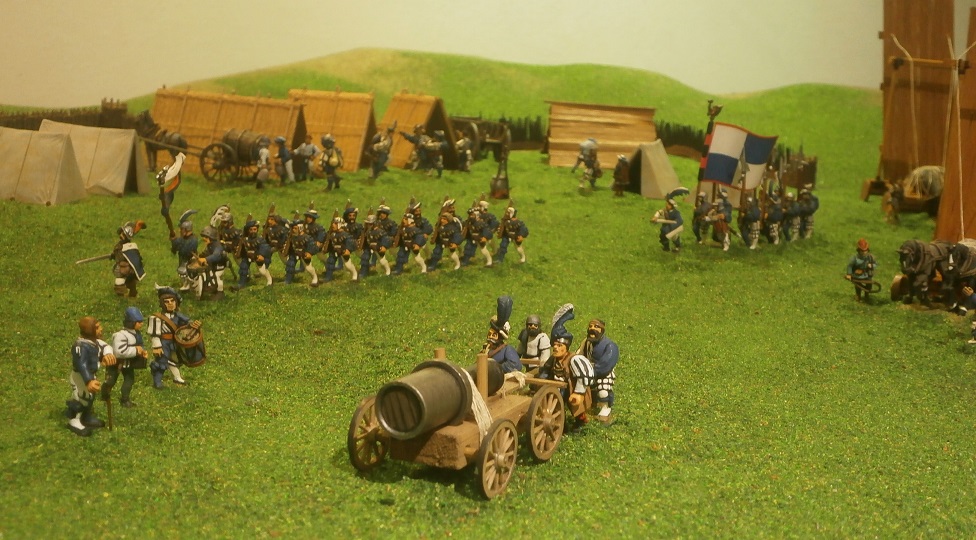
Guccio watched, standing beside the sergeant of the handgunners who had been volunteered as petardiers, a fellow named Vasari. Until now the sergeant had said very little, although from his gruff attitude it was clear he was not thrilled at what he and his men had been ordered to do. A bearded veteran of several wars, which included serving with Lord Alessio in the northern Old World, he was tall and every bit the image of a soldier, albeit one dressed (as so many in the Portomaggioran marching army) in Empire style clothes.
“I was told it would be a simple task,” the sergeant suddenly declared. “Yet here we see how hard it is even just to move it. Tell me, siege master, why don’t we haul it with draft animals like the bridges?”
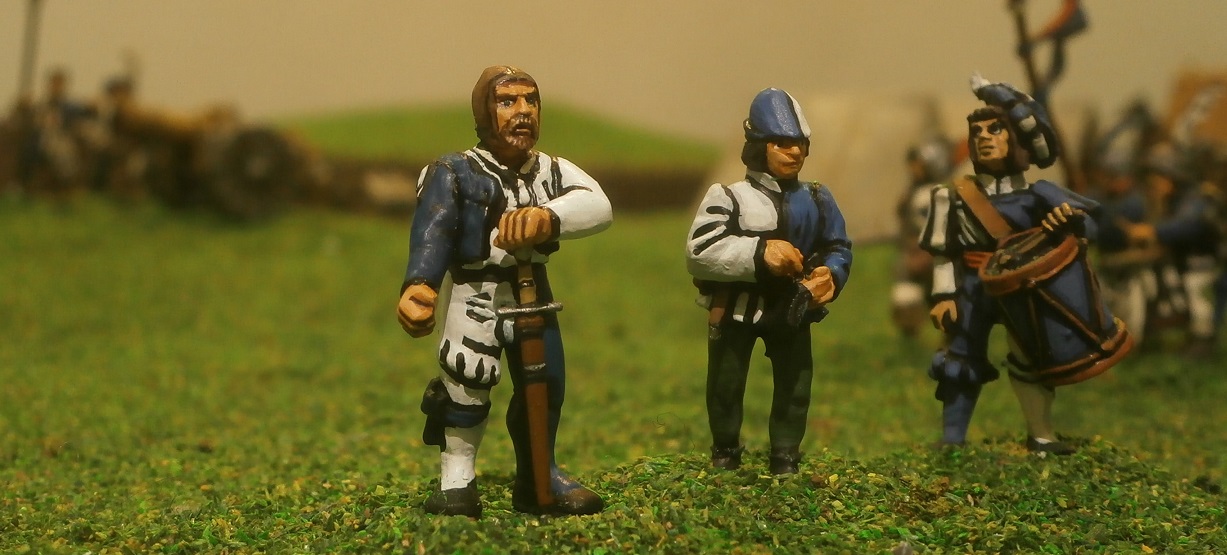
“We could, I suppose, at least until we drew close to the walls,” said Guccio. “If we were not using nearly every horse to haul the bridges instead. Besides, your men will learn how to push it along the way.”
“Ah, the fine and noble art of pushing,” said the sergeant, rolling his eyes.
This made Guccio smile. “Aye, well, not noble, but your men must familiarise themselves with the work, all the better to move speedily and without hindrance when they draw near.”
“Yet such an enemy will not shoot at us. Not once have I seen them so much as lob a stone, never mind span and shoot a crossbow nor load and fire a piece,” said the sergeant. “We could haul it up all leisurely, take a breather now and then, have a little repast as and when we like, and still it would be delivered.”
“The enemy might not shoot, but who knows what might sally forth from the city if we approach so slowly as to allow them to get the measure of us? Who knows what magical incantations their foul masters might conjure against us? And we needs must time our arrival as best we can with the arrival of the bridges and the ladder assault on the walls, so that the enemy cannot concentrate its strength against us.”
“I doubt the bridges will be moving fast at all”
“That’s as may be,” agreed Guccio. “But if we are to coordinate the arrival perfectly, we must light the fuse as we draw near, after which your men cannot afford to slip or stall, otherwise the fuse will have to be pulled out and replaced and re-lit, allowing the enemy even more time to thwart us.”
“My men,” mused the sergeant. “You mean my men and I.”
Guccio fell silent, for what could he say? Every veteran knew the dangerous reputation of petards.
“When the arch-lector was considering attacking Ebino,” said the sergeant, “they say the maestro Angelo da Leoni built him a huge ramp, hauled by his steam engine, up which the army could stroll right up and over the walls into the city.”
Except the maestro failed, thought Guccio. “Would that we could, sergeant” was what he said. “But we have no such engine.”
The construction of a ramp for Da Leoni’s steam engine had taken so long that the vampire Duchess had sallied forth from the city and defeated the living army in the field. The maestro’s engine, stripped bare of its armaments, had sputtered forwards and ground to a halt when swarmed by ghostly monsters. The thought made Guccio’s stomach knot the more. If a genius like Da Leoni had failed, with his unique marvel of an engine, how could his own ‘grenado in a hand cart’ hope to work? Or his clackety timber bridges?
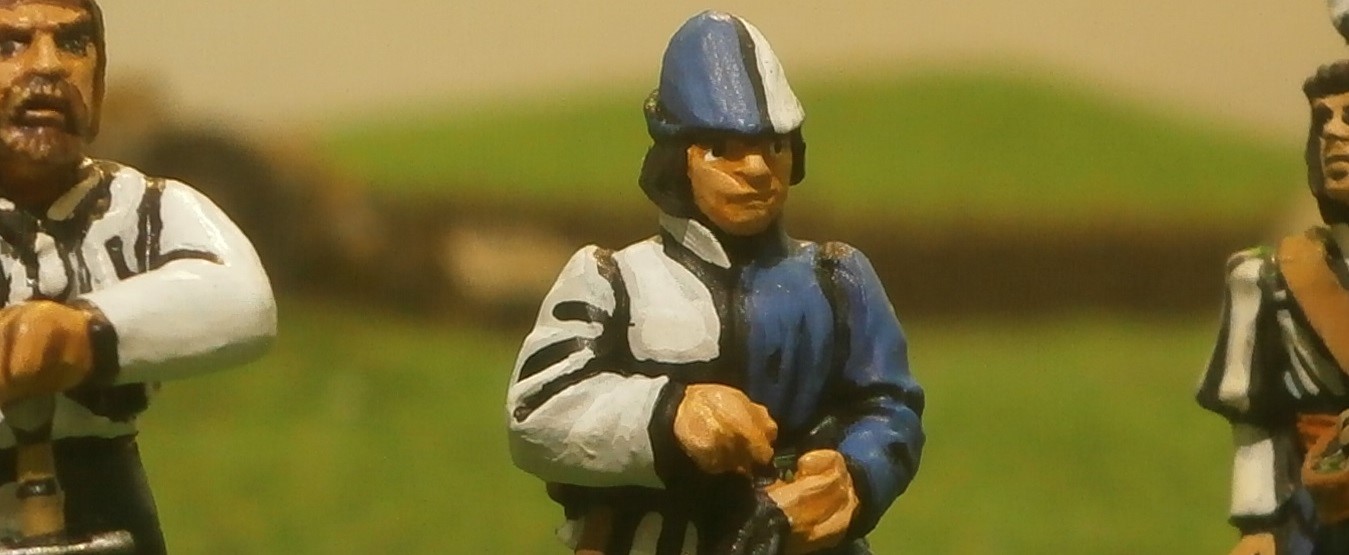
Just now four men were pushing the petard, as indeed his design intended. But when it approached the city, Sergeant Vasari’s whole company would accompany it, to guard it should that prove necessary, and more importantly to assist if it were to get stuck, or one or more of the pushers should fall from whatever harm the enemy inflicted.
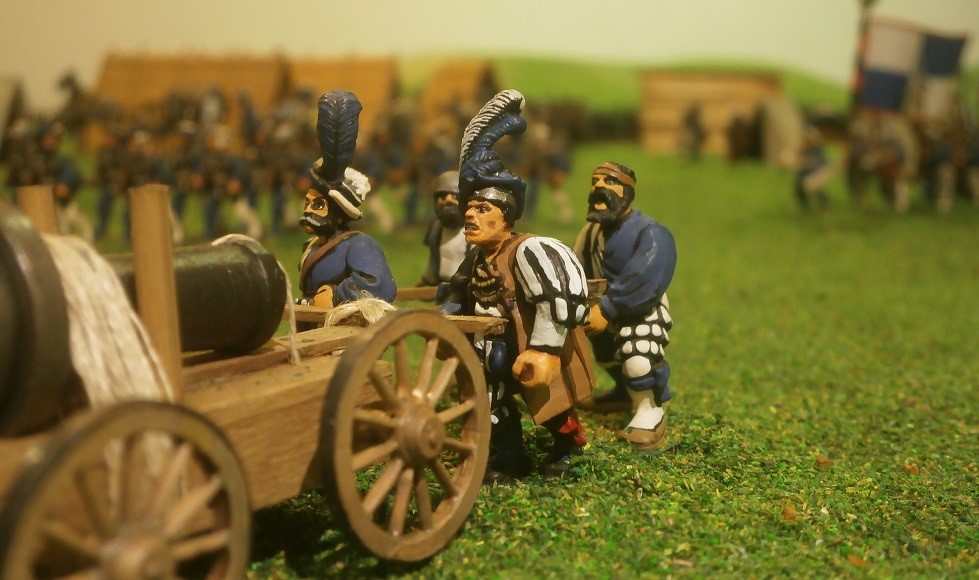
“You’ve tested the fuse, I take it?” asked Sergeant Vasari.
The fuse hung from the touchhole at the rear, a particularly potent, hempen matchcord boiled in a concentrated saltpetre solution, that would spit spluttering sparks when lit, the flame burning up at a speed much faster than that of any handgunner’s ‘slowmatch’.
“That I have. I made four, all exactly the same. Two I tested and timed, the third you see there, the fourth I will have with me should we need to replace that one.”
“You will be with us?” said the sergeant, with evident surprise.
It had not occurred to Guccio that the sergeant did not know he was to stay with the petard. “I will, although I might be of little use should it come to fighting, for my skills with a blade are somewhat rusty.”
“Well, siege-master,” said the sergeant, his tone lightening. “We’ll do any fighting that’s needed, you just make sure that thing goes off when it is supposed to go off, and not a moment before.”
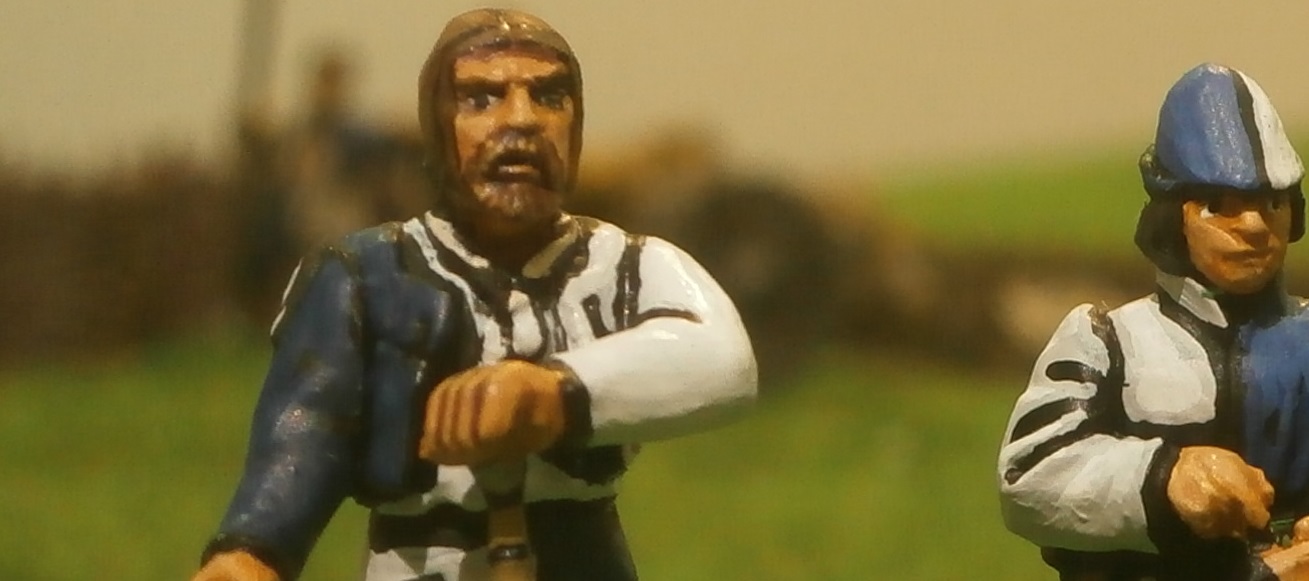
That’s the trick, thought Guccio. And that is what every soldier in Vasari’s company had on his mind. Now that the sergeant knew the petard’s maker was to be with them, he seemed less anxious. Knowing the man responsible for building it was to risk his own life also had to make anyone feel a bit better about the prospect of success, for why would a man make a petard with which to hoist his very own self?
Except Guccio was the maker and knew full well what a man might do when he allows ambition and pride to take the reins of his own voice. It was a good thing that the sergeant could not feel how dry Guccio’s throat was or sense the ever-present knot inside his belly.
Behind them several companies of soldiers had already mustered and begun their march. An Estalian mercenary commanded one band of handgunners …
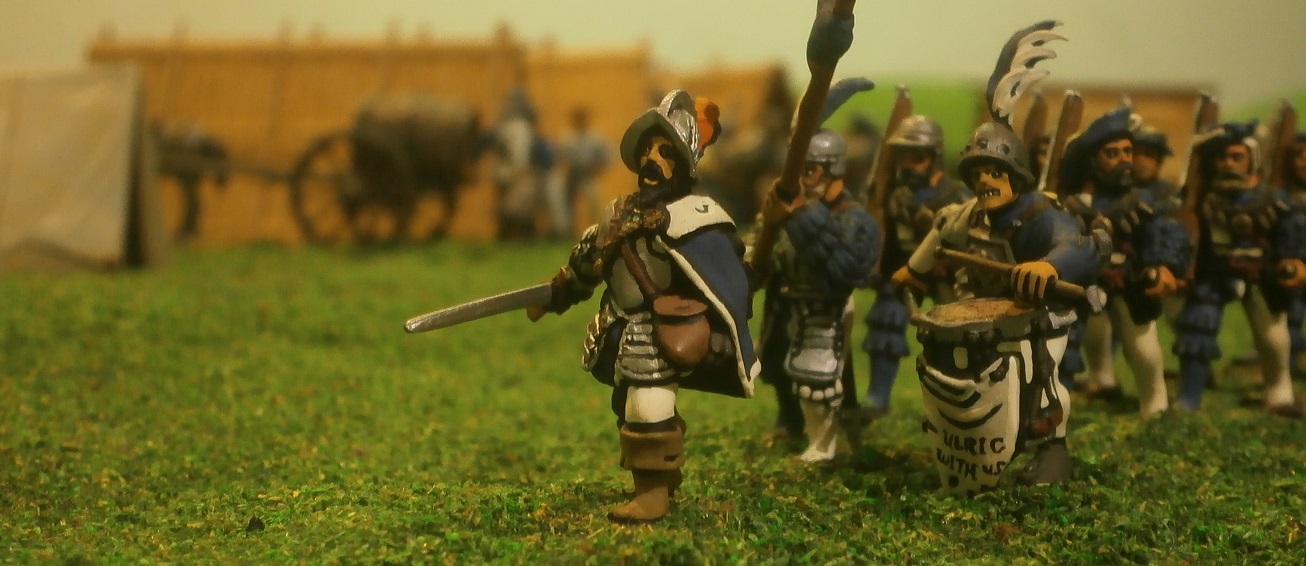
… while a swaggering youth with an oversized panache strode with bared blade ahead of another company.
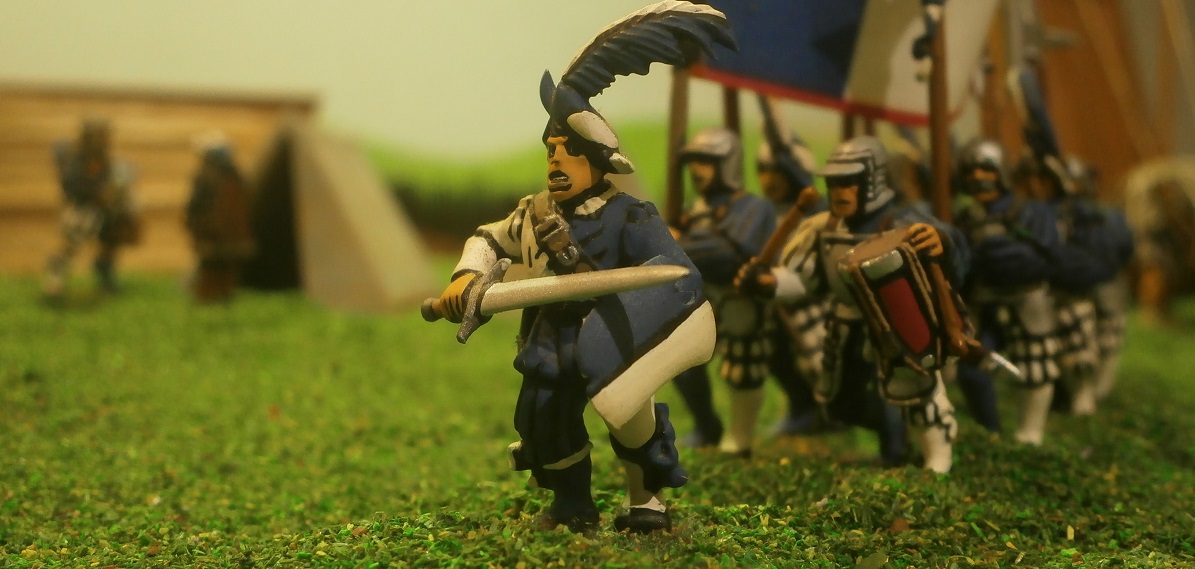
Elsewhere in this part of the camp, soldiers rushed to arm themselves and collect whatever they might need for the short march and the battle ahead. A number were drawing fortified wine from a cart, for it was the custom for every soldier to drink a deep draft before an assault, not just to calm their nerves but to embolden them. It was a practice made all the more appropriate when the enemy consisted of those who had already died!
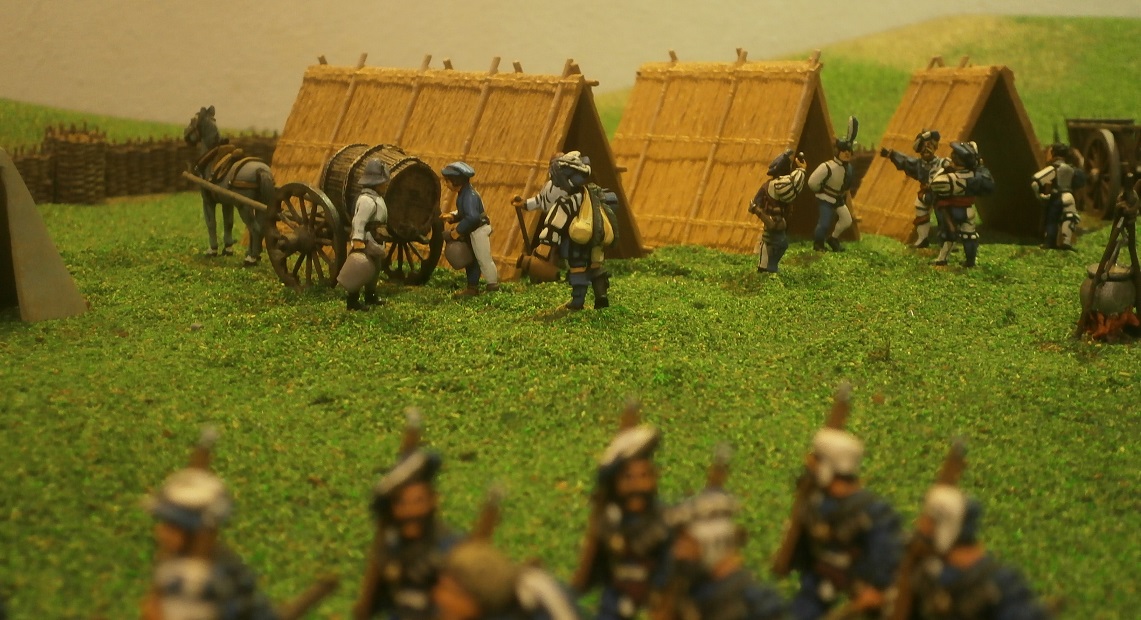
Behind the petard trundled Guccio’s three large bridges, made slow by the huge, counterweight rocks he had ordered lashed to the platforms.
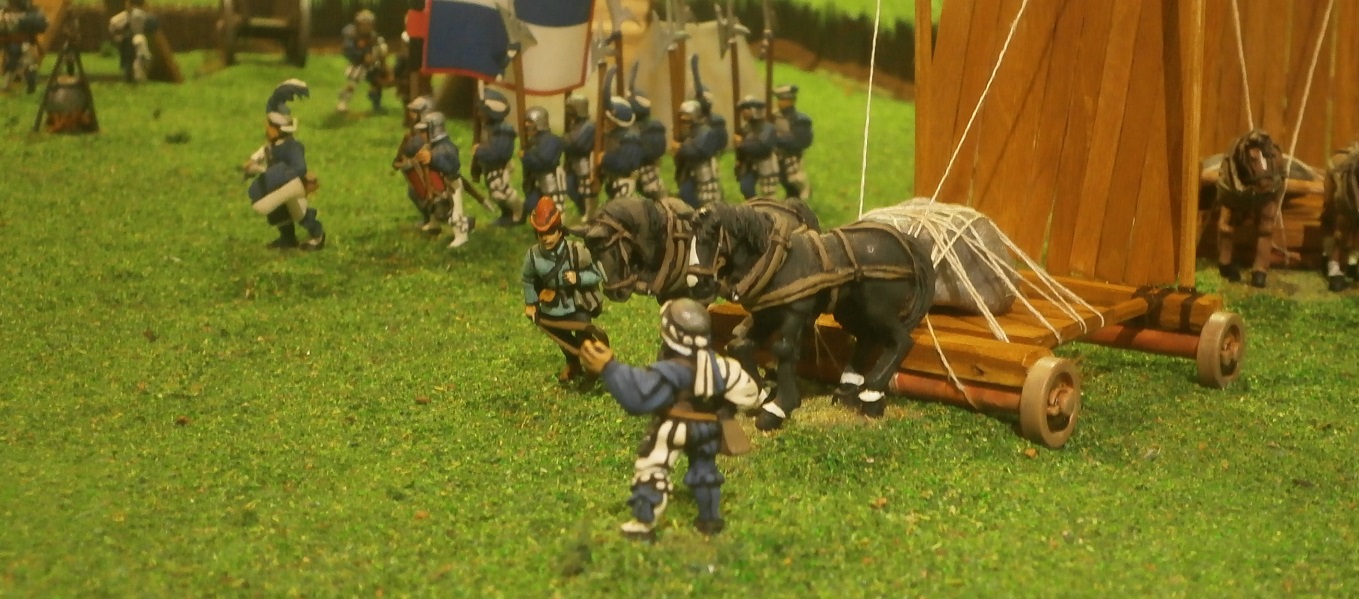
These were to be pulled by beasts to within sight of the walls, and then distributed to three of the larger regiments to be pushed the remainder of the way. To ask soldiers to push them was impractical but entirely necessary, for if the draught animals were to be alarmed by the enemy, startled in such a way as to buck or rear, then the bridges could topple before they reached the moat.
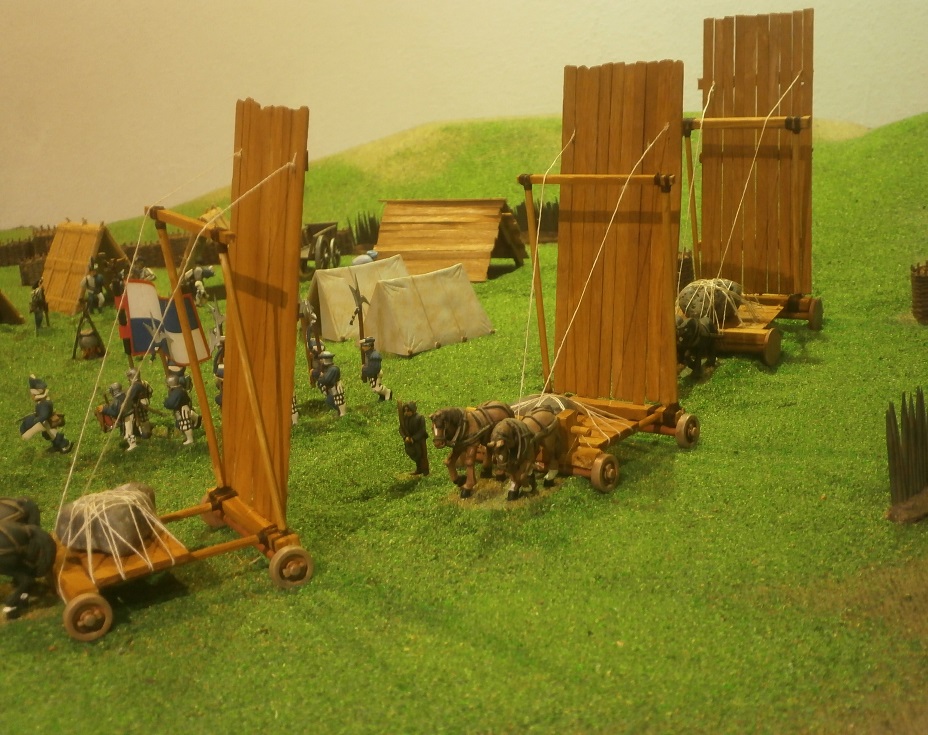
Still, thought Guccio, I will be so busy with the petard I might not even notice such a disaster!
May blessed Myrmidia, he prayed, protect me in the battle to come. And should I die in the blast, then may the goddess take my life as a sacrificial offering in return for breaking the gate, so that my life may not be wasted and that our army, dedicated to her, may gain victory against this the foulest of foes.
Hoist!
Prequel to the Assault on Ebino, IC2404
Guccio had been pondering the audacity of his recent behaviour, and whether the consequences of his boldness might prove the ruin of his career prospects in Lord Alessio Falconi’s army, or indeed any army. Faced with the prospect of attacking the strongly walled and deeply moated city of Ebino, defended by an enemy that not only never slept but who had likely forgotten what sleep was, the general had turned to him, as siege master, for advice. He had immediately offered two solutions, both of which now laced his every waking moment with fearful doubt, somehow even surpassing the fear engendered by the prospect of once again facing the undead in battle.
The moat, he had said to Lord Alessio, required bridging, therefore they should fashion carriages to carry suitably long platforms up to the moat’s edge, there to drop into place. Once made busy by the necessarily hasty construction, he had become so caught up in the practicalities of wheels and axles sufficient at least to travel one, relatively short journey, as well as how to counterweight the carriage so that the large platform hanging at the fore would not cause it to topple over, that he had pushed all other concerns from his mind.
Now, however, that the former difficulties had been overcome, howsoever ingeniously, he had to face up to the several many other considerations. Would the sheer weight of both the primary load and necessary counterweight upon such a hastily built carriage simply cause it to shake itself apart as it negotiated the rough ground it would have to pass before reaching the moat? Could any number of men successfully push the thing that far, now that large boulders had been strapped to the rear to compensate for the force of the large, leaning bridge platform hanging precariously from the front? And when the timber platform was allowed to fall, would it stay in one piece as it crashed into the ground, as well as sufficiently strong to bear the weight of the many armoured men (carrying long ladders) who would then pour over the top of it in order to reach the foot of the wall?
While these were just some of his worries concerning the bridges, all paled into insignificance when compared to his worries regarding the petard.
The scouts had reported that the city’s southern gate had a stone bridge leading to it, which obviously could not be drawn up – a rather unexpected opportunity for access given the fact that the city’s builders had gone to the trouble of digging a moat. Knowing therefore that the gate could be reached relatively easily, Guccio immediately wondered how the gate itself might be broken through. Of course, there were artillery pieces that could do the job, and master gunners to tend them, but only two, and not the half a dozen they had fielded in the Valley of Death. If one or even both should shiver as had the mortar at Pontremola, then the gate might not be beaten. Furthermore, the scouts had reported that it was made of iron-bound oak, ancient and hard, reinforced by a huge iron portcullis, which of course made sense considering the lack of a drawbridge. It was clear that the army needed another string to its bow when it came to the gate. To Guccio’s mind there was no choice - breaking gate had to be attempted, if simply as an alternative mode of access should his doubts concerning his bridges prove warranted.
Thus it was, as if he were a boulder rolling downhill, entirely unable to stop, he found himself making a second proposal to the general, immediately following his first: they would need a petard, one of substantial size and great potency, and he knew where to obtain just such a thing. The mortar that had shivered at Pontremola had not blown itself entirely apart, but rather had merely cracked, rendering itself entirely unsafe for the purpose it was made to perform. Guccio said that if it were loaded with grenade and triple the weight of powder and mounted upon a carriage, then it could be rolled right up to the gate, placed against it, and exploded. It would surely blow itself apart, considering its visibly fractured state, but in so doing most likely tear the gate to pieces, dislodge the portcullis and provide a breach through which the army could pour.
That moment, as all those gathered in the army council nodded appreciatively, including the general himself, should have been a moment of great satisfaction – if he had not immediately realised how little certainty he had that any of what he had claimed was even vaguely likely to succeed.
Thus the knot in his stomach ever since!
…
Its carriage completed - utilising the wheels of one of the army’s better baggage wagons, much to the disgust of the proud carter who had coaxed the carriage all the way from Portomaggiore - the petard was now being rolled out of the camp, just as the rest of the army was readying itself for the challenge ahead.

Guccio watched, standing beside the sergeant of the handgunners who had been volunteered as petardiers, a fellow named Vasari. Until now the sergeant had said very little, although from his gruff attitude it was clear he was not thrilled at what he and his men had been ordered to do. A bearded veteran of several wars, which included serving with Lord Alessio in the northern Old World, he was tall and every bit the image of a soldier, albeit one dressed (as so many in the Portomaggioran marching army) in Empire style clothes.
“I was told it would be a simple task,” the sergeant suddenly declared. “Yet here we see how hard it is even just to move it. Tell me, siege master, why don’t we haul it with draft animals like the bridges?”

“We could, I suppose, at least until we drew close to the walls,” said Guccio. “If we were not using nearly every horse to haul the bridges instead. Besides, your men will learn how to push it along the way.”
“Ah, the fine and noble art of pushing,” said the sergeant, rolling his eyes.
This made Guccio smile. “Aye, well, not noble, but your men must familiarise themselves with the work, all the better to move speedily and without hindrance when they draw near.”
“Yet such an enemy will not shoot at us. Not once have I seen them so much as lob a stone, never mind span and shoot a crossbow nor load and fire a piece,” said the sergeant. “We could haul it up all leisurely, take a breather now and then, have a little repast as and when we like, and still it would be delivered.”
“The enemy might not shoot, but who knows what might sally forth from the city if we approach so slowly as to allow them to get the measure of us? Who knows what magical incantations their foul masters might conjure against us? And we needs must time our arrival as best we can with the arrival of the bridges and the ladder assault on the walls, so that the enemy cannot concentrate its strength against us.”
“I doubt the bridges will be moving fast at all”
“That’s as may be,” agreed Guccio. “But if we are to coordinate the arrival perfectly, we must light the fuse as we draw near, after which your men cannot afford to slip or stall, otherwise the fuse will have to be pulled out and replaced and re-lit, allowing the enemy even more time to thwart us.”
“My men,” mused the sergeant. “You mean my men and I.”
Guccio fell silent, for what could he say? Every veteran knew the dangerous reputation of petards.
“When the arch-lector was considering attacking Ebino,” said the sergeant, “they say the maestro Angelo da Leoni built him a huge ramp, hauled by his steam engine, up which the army could stroll right up and over the walls into the city.”
Except the maestro failed, thought Guccio. “Would that we could, sergeant” was what he said. “But we have no such engine.”
The construction of a ramp for Da Leoni’s steam engine had taken so long that the vampire Duchess had sallied forth from the city and defeated the living army in the field. The maestro’s engine, stripped bare of its armaments, had sputtered forwards and ground to a halt when swarmed by ghostly monsters. The thought made Guccio’s stomach knot the more. If a genius like Da Leoni had failed, with his unique marvel of an engine, how could his own ‘grenado in a hand cart’ hope to work? Or his clackety timber bridges?

Just now four men were pushing the petard, as indeed his design intended. But when it approached the city, Sergeant Vasari’s whole company would accompany it, to guard it should that prove necessary, and more importantly to assist if it were to get stuck, or one or more of the pushers should fall from whatever harm the enemy inflicted.

“You’ve tested the fuse, I take it?” asked Sergeant Vasari.
The fuse hung from the touchhole at the rear, a particularly potent, hempen matchcord boiled in a concentrated saltpetre solution, that would spit spluttering sparks when lit, the flame burning up at a speed much faster than that of any handgunner’s ‘slowmatch’.
“That I have. I made four, all exactly the same. Two I tested and timed, the third you see there, the fourth I will have with me should we need to replace that one.”
“You will be with us?” said the sergeant, with evident surprise.
It had not occurred to Guccio that the sergeant did not know he was to stay with the petard. “I will, although I might be of little use should it come to fighting, for my skills with a blade are somewhat rusty.”
“Well, siege-master,” said the sergeant, his tone lightening. “We’ll do any fighting that’s needed, you just make sure that thing goes off when it is supposed to go off, and not a moment before.”

That’s the trick, thought Guccio. And that is what every soldier in Vasari’s company had on his mind. Now that the sergeant knew the petard’s maker was to be with them, he seemed less anxious. Knowing the man responsible for building it was to risk his own life also had to make anyone feel a bit better about the prospect of success, for why would a man make a petard with which to hoist his very own self?
Except Guccio was the maker and knew full well what a man might do when he allows ambition and pride to take the reins of his own voice. It was a good thing that the sergeant could not feel how dry Guccio’s throat was or sense the ever-present knot inside his belly.
Behind them several companies of soldiers had already mustered and begun their march. An Estalian mercenary commanded one band of handgunners …

… while a swaggering youth with an oversized panache strode with bared blade ahead of another company.

Elsewhere in this part of the camp, soldiers rushed to arm themselves and collect whatever they might need for the short march and the battle ahead. A number were drawing fortified wine from a cart, for it was the custom for every soldier to drink a deep draft before an assault, not just to calm their nerves but to embolden them. It was a practice made all the more appropriate when the enemy consisted of those who had already died!

Behind the petard trundled Guccio’s three large bridges, made slow by the huge, counterweight rocks he had ordered lashed to the platforms.

These were to be pulled by beasts to within sight of the walls, and then distributed to three of the larger regiments to be pushed the remainder of the way. To ask soldiers to push them was impractical but entirely necessary, for if the draught animals were to be alarmed by the enemy, startled in such a way as to buck or rear, then the bridges could topple before they reached the moat.

Still, thought Guccio, I will be so busy with the petard I might not even notice such a disaster!
May blessed Myrmidia, he prayed, protect me in the battle to come. And should I die in the blast, then may the goddess take my life as a sacrificial offering in return for breaking the gate, so that my life may not be wasted and that our army, dedicated to her, may gain victory against this the foulest of foes.
symphonicpoet
Moderator
^Oh, very nice indeed! Thank you, Padre.  It's good to have another chapter in such a splendid story. Beautiful bridges, by the way. Very nice models.
It's good to have another chapter in such a splendid story. Beautiful bridges, by the way. Very nice models.
Padre
Lord
Thanks muchly you two. Here is the next part ...
The Assault on Ebino, Part One: Deployment
Biagino had grown more and more furious on the journey from the defeat at Pontremola to the city of Ebino. When the duchess Maria had died, his mind, twisted with all the proud hatred and dark cruelty of vampirism, had been released from his slavish, besotten enthrallment to her, so that now he was enraged almost to madness by the thought of the glamour she had cast over him. As he passed through the gates, anger had so suffused his being that he cared not a jot for the army that was pursuing him, and instead of fleeing further, as was surely the most sensible course of action considering the recent defeat and the enemy’s obvious strength, he decided he would rule her city, take all that was once hers, as partial recompense for her treatment of him.
He had been a pathetic creature in life, and even in undeath, until Maria’s demise, he had been the same. No more.
Now, however, more than two weeks later, with the enemy soon about to attack the city, and with only his paltry, remnant army to defend it, his fury had abated to be replaced with much more mixed emotions, flavoured throughout with a hearty dose of self-interest. Luckily for her, the witch who Maria had left in charge of the city had not met Biagino immediately upon his arrival, otherwise he would most assuredly have killed her on sight, out of sheer spite. When he finally met her, he had regained sufficient composure to realise he needed to hear her report concerning what forces she commanded within the city, and that he needed whatever help she could give to defend it.
The enemy had been preparing for their assault for days, fashioning up contraptions to allow them entry. He knew very well the strength of their artillery, big and small, having watched the volleys at Norochia tear his massive army to pieces, then witnessed the same yet again at Pontremola. Although the city was circumvallated with strong walls, parapeted throughout, he was unwilling to risk even a fraction of the battering they had delivered previously, not when his own forces were so meagre, and so he commanded that none of his soldiers should mount the walls, but rather slink unseen in the shadows below and await his command before marching up to reveal themselves.
So it was that the Disciplinati di Nagash, commanded by the two remaining thralls of La Fraternita di Morti Irrequieti, were now mustered in their full remaining strength in the yard below him, silently waiting for his order to climb the steps.
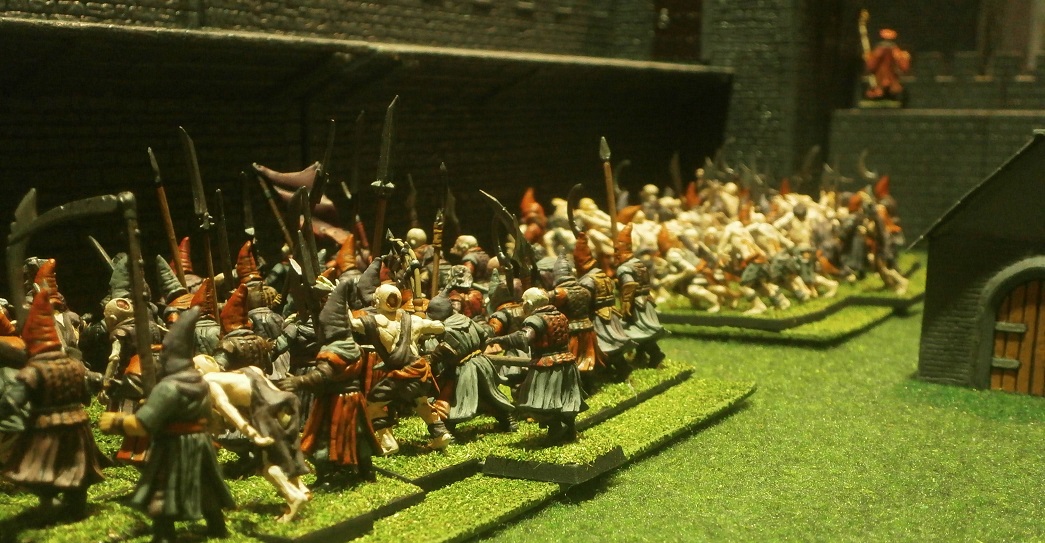
Upon the other side of the city gate the witch’s garrison of skeletons stood similarly …
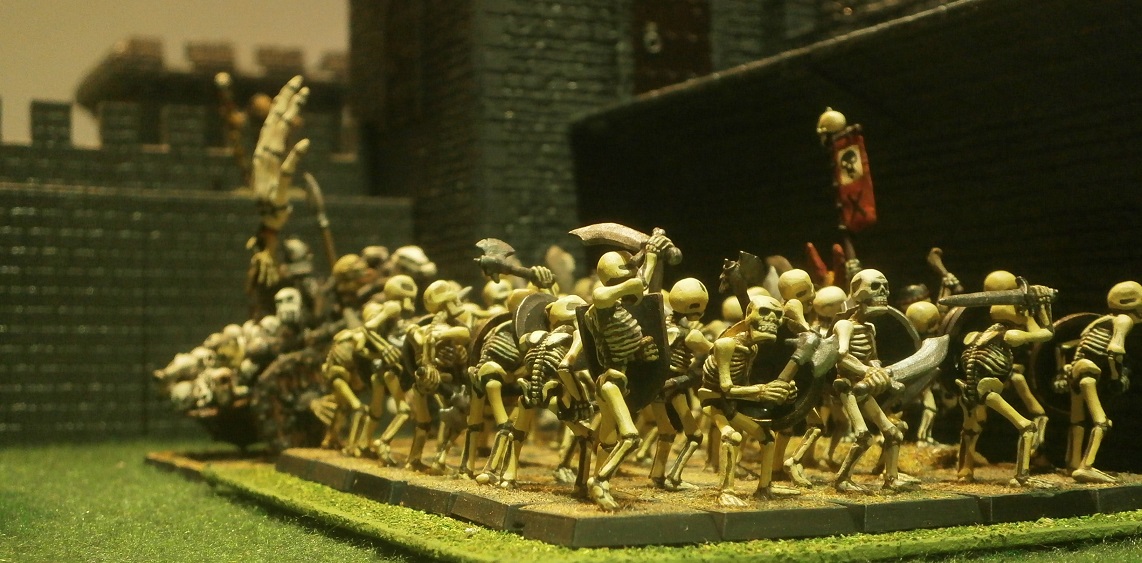
… with a corpse cart close by to augment the magical current feeding their animation.
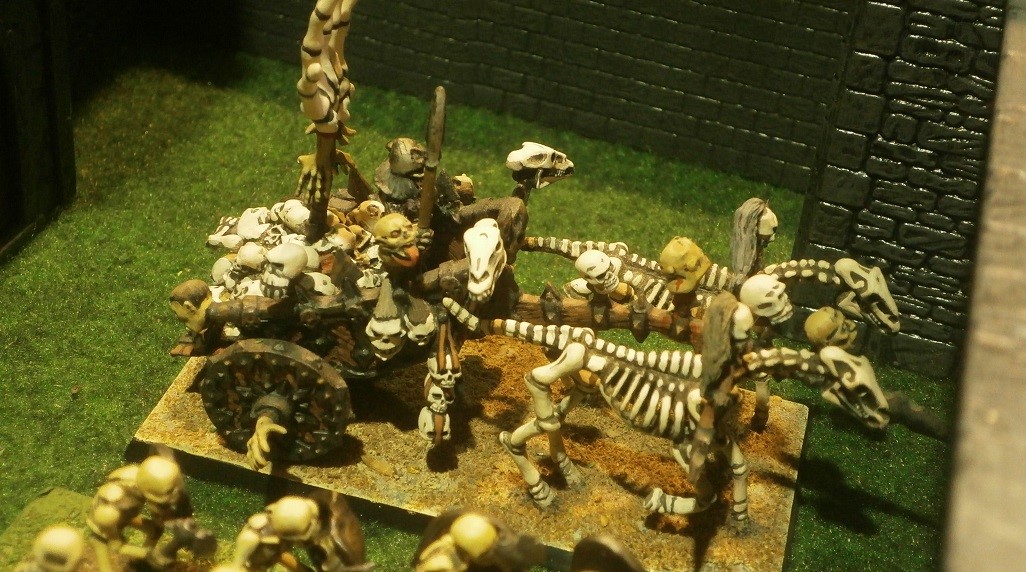
The witch had conjured a host of restless, accursed spirits from the most haunted corners of the city, and they too awaited command, swirling and swooshing around each other like the fronds of water plants might plait and unwind in the eddies of a stream.
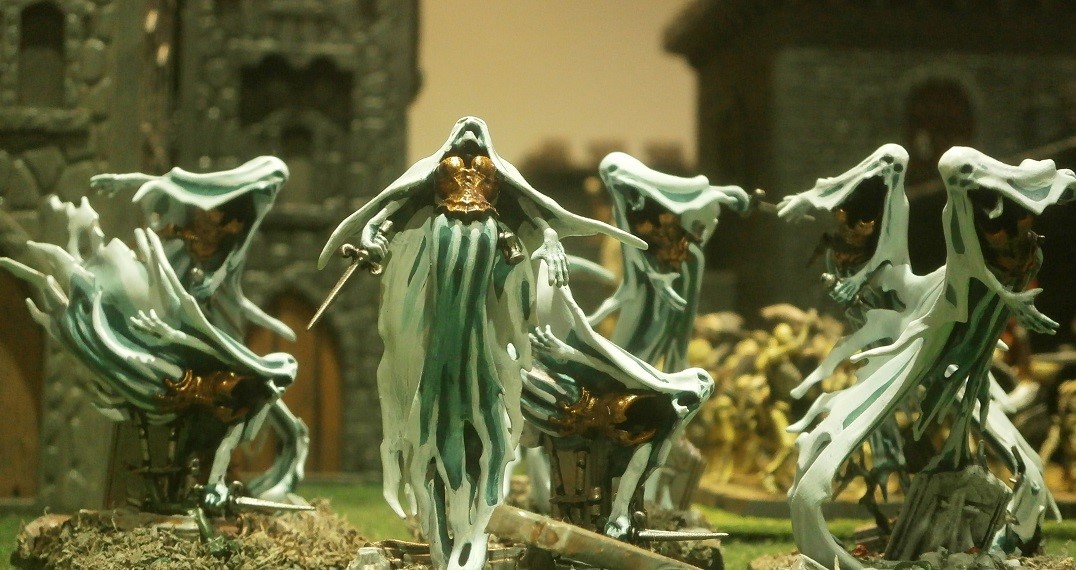
The witch herself, an old crone who had mastered only the most basic rudiments of the necromantic art, yet to her credit had still managed over time to raise the force aforementioned, was hiding too. Like Biagino himself, she was tucked away in a corner of the battlements, under the shadow of a nearby tower, from where she could watch over her garrison force but also take an occasional peek at the enemy.
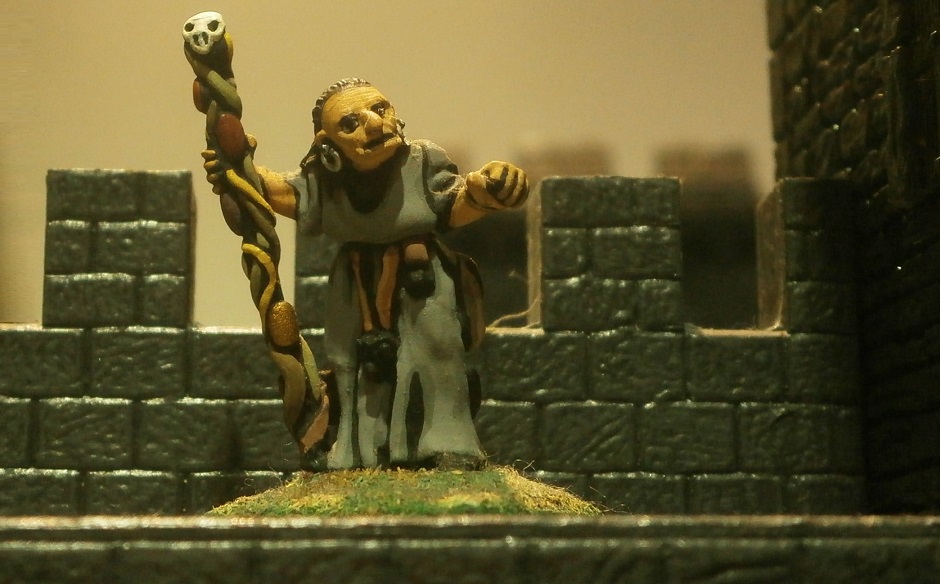
His chess pieces set, Biagino now waited impatiently for the enemy to make the opening move. Upon several recent occasions, one of his thralls had crept out in the darkest hours of the night to spy upon the foe and had reported the mustering of their force and their constructions. He knew they had bridges with which to cross the moat, but only a few. Surely, Biagino mused, there is sufficient strength here to prevent frightened men clambering up ladders at only a few places along the walls? But then, they also had their guns, and their magical colossus; their wizards and priests. At least their mounted men at arms, of which he had spied a good number at Pontremola, would be forced to wade through mud on foot, unable to bring their lances to bear. They would be little better than militia, if somewhat better armoured. With the walls of Ebino in his favour, he rated his chances.
The duchess, he could see now most clearly, had been a vainglorious fool when it came to war. Despite knowing her uncle (and vampiric sire) Duke Alessandro, had perished in battle at the bridge of Pontremola, she had forsaken the stone walls of the city which would hinder the foe tremendously, and had charged out to attack the enemy, entrenched at the very same place, there to die. He was glad of her folly, for her death had freed his mind. Now all he had to do was survive this assault and he would have time to enjoy his freedom, to revel in the power that could now be his.
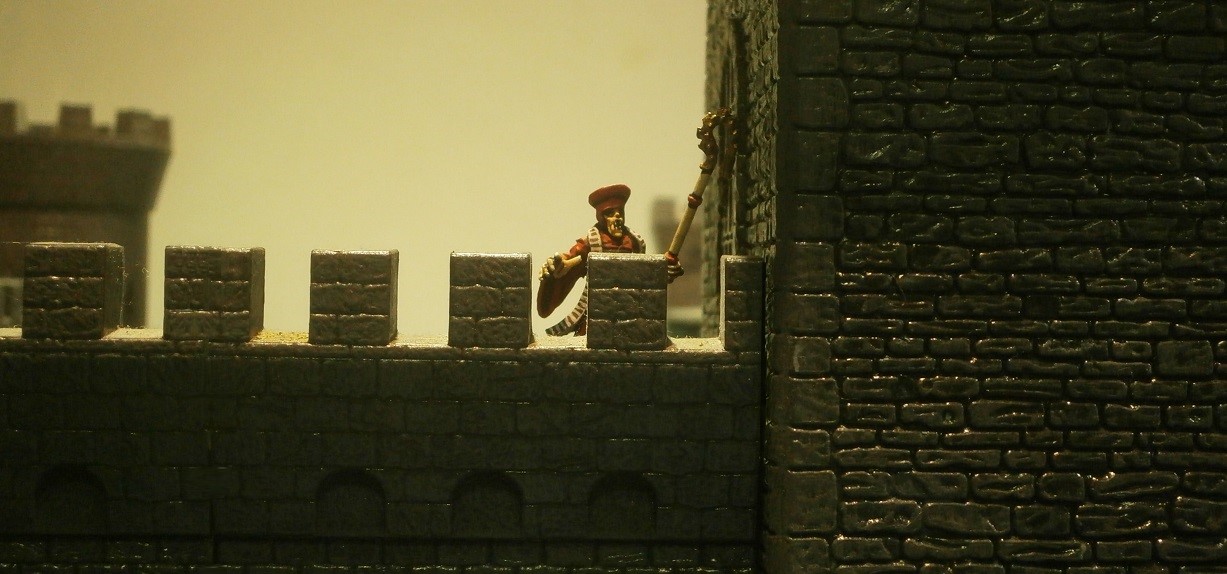
…
Having glanced over the crenelations several times, Biagino saw that the enemy had indeed left all their horses behind, and that even their wooden constructions were being pushed by men not beasts. They were divided unevenly by the road to the city gate, with two of their bridges upon one side and the third on the other. Along the road itself they were pushing what at first appeared to be an ancient bombard, but which Biagino’s wickedly nimble eyes made out to be a huge petard, so heavy it had to be mounted on a carriage.
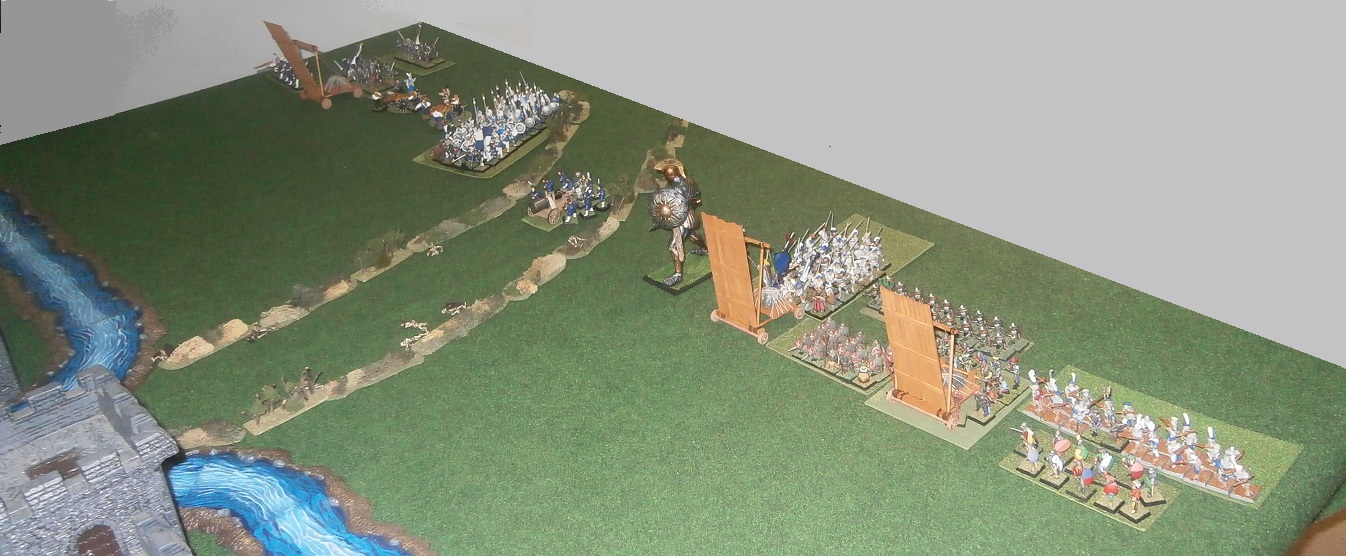
The largest enemy regiment, consisting of spearmen, obliquely flanked the petard, and if he were to guess, he would have said the enemy general intended them to storm the gate once (if) it was blown. The rest of the soldiers on that flank were heavily armoured, and in smaller companies. Biagino knew they must be the nobility, denuded of their steeds by the necessities of an assault. He could not help but smile as he imagined their steel-carapaced bodies sinking deep in the moat or plummeting from a ladder to crash hard into the rock footings. Also on that flank were two cannons, which perhaps explained why the soldiers on that side had only one bridge. They must have been expecting the artillery to breach one spot, while they then poured across the moat to access the gap thus made.
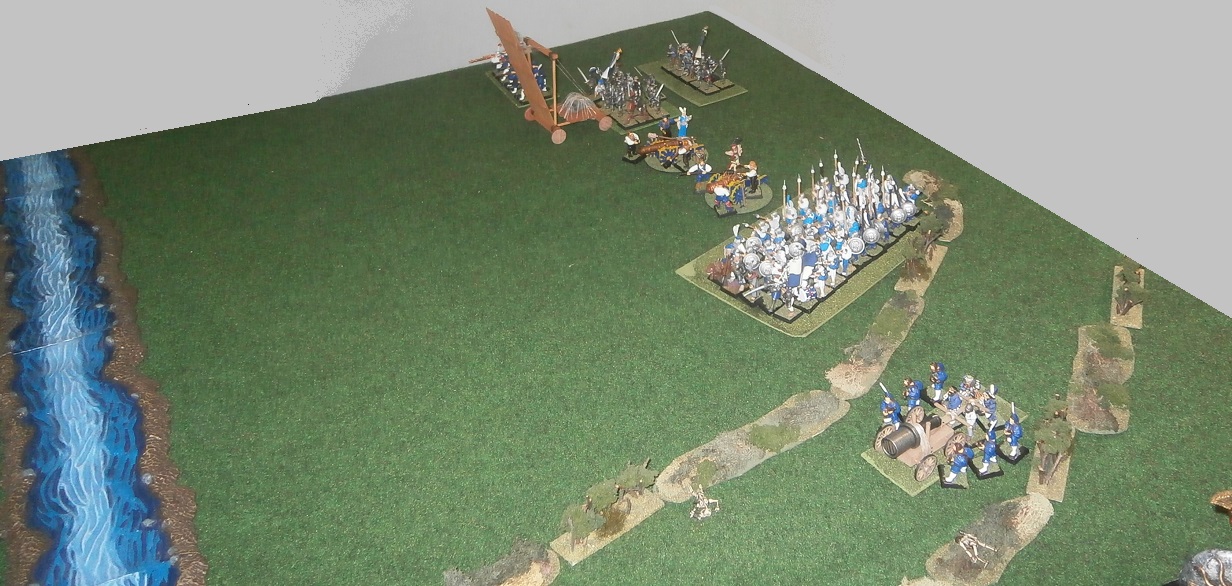
Upon the other side of the road were the Reman contingent as well as more Portomaggiorans. Biagino had seen, when his eyes were alive rather than just not dead, several of the regiments before, including the mercenary regiments of dwarves. The colossus drew his gaze first, as it would anyone’s, but there were also two bridges, a large regiment of armoured footsoldiers and three regiments of crossbowmen, one of which was pushing a bridge. And well they might, he thought, for they nothing to shoot at!
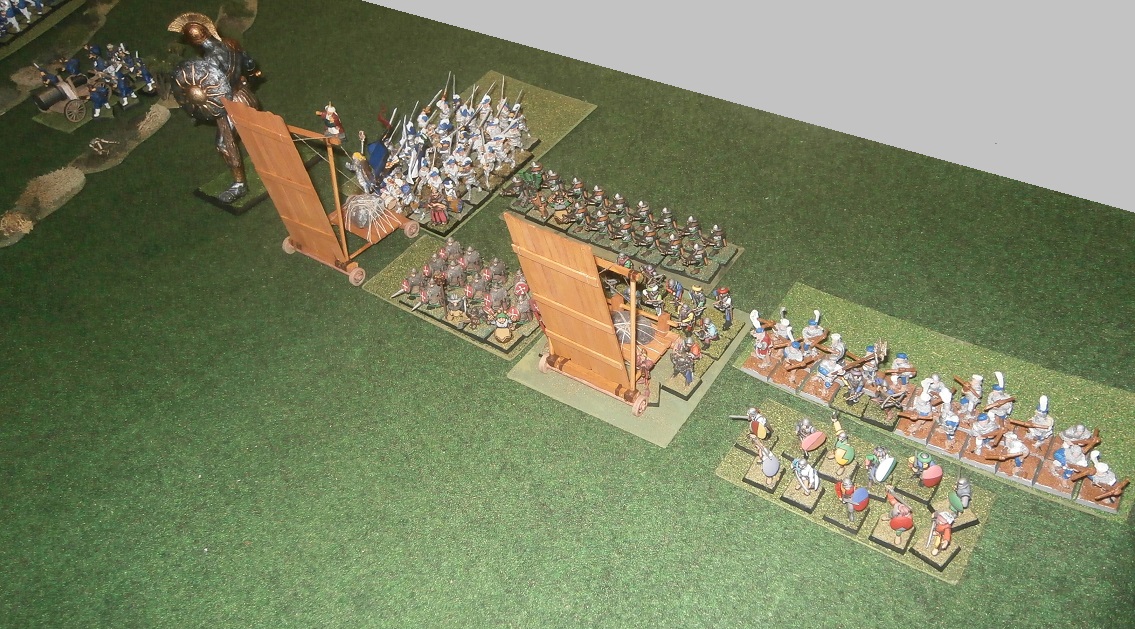
The whole army was on the move. Soon they would discover how much more difficult the fight against him would prove compared to the Duchess!
---------------------
Game Notes
This was our third play-by-email battle. We are getting quite good at it!
The Tabletop
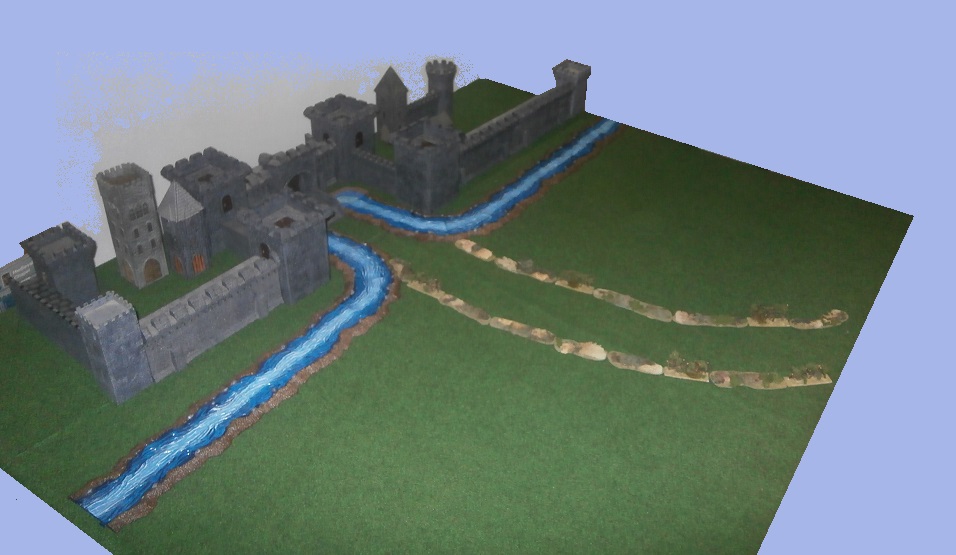
The Living Army Deployment, with labels
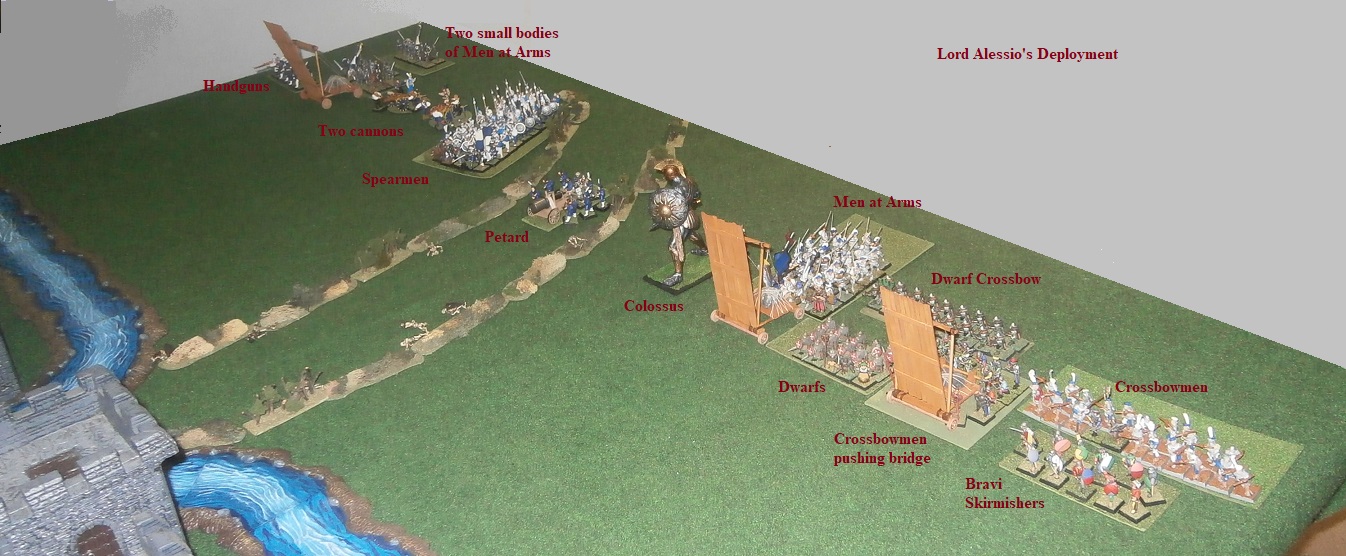
The Reman Brigade

This pic was sent, along with the army list, to the living army player, Damo (aka Lord Alessio Falconi) as orientation. He did not need a pic of his own forces, as they were his own figures which I had picked up several months ago from his house for the previous play-by-email!
The Undead Forces
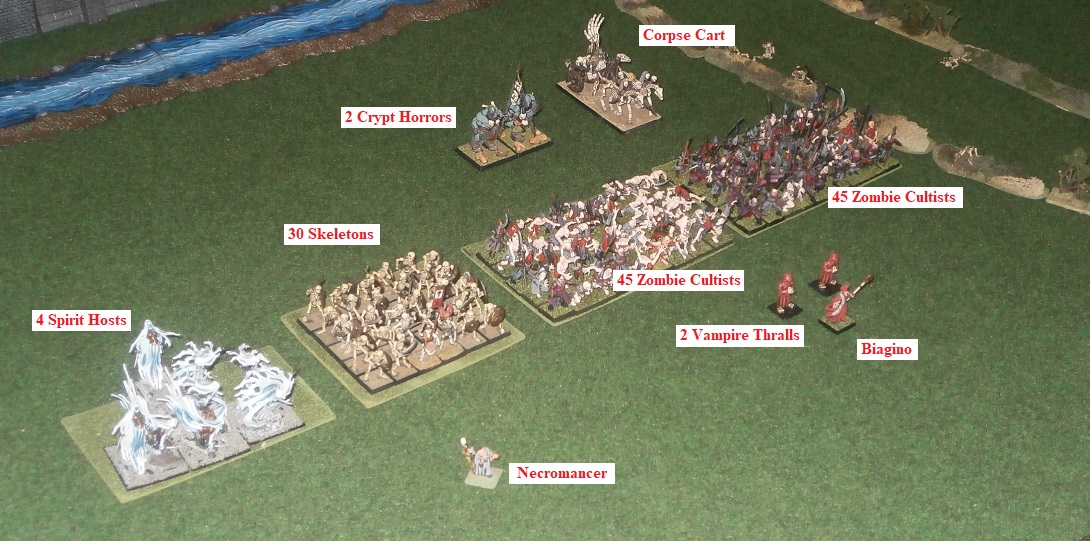
This pic was sent, along with the army list, to the Undead army player, Matt, who is actually the villainous Duke Guidobaldo Gondi of Pavona in our campaign, but who had bravely volunteered to command this NPC force in battle.
The City Sections
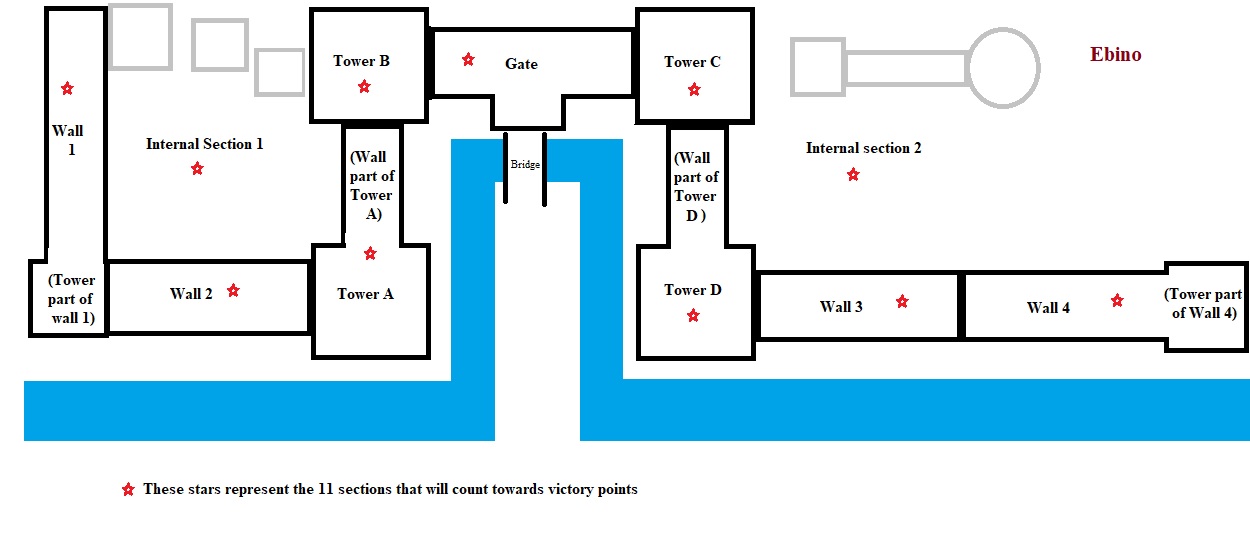
This being a siege game, it would last for 8 turns, and victory was to be decided according to the number of sections held by an unengaged, unfleeing unit by the end of turn 8.
New Rules
PETARD
Movement: With 8 men attending, with 4 of them pushing, it can march move. Once the attendants fall below 2, it cannot march. Once there are no attendants, it loses 1" movement per lost pusher. It must be pushed right up to the gate, then the fuse lit.
(The idea here is that the pushers are the muscle, while the attendants help shift it, direct it, remove obstacles, and add a bit of extra muscle in the moments such is required.)
Explosion: I reckon we should modify the shooting at the gates rules from 6th ed, p.252 -253. Auto hit the gate (for obvious reasons - it will be placed right against it). Roll artillery dice twice for misfire chance (as per the packing an extra charge rule) but the worst misfire result actually counts as a success (except the success also includes potential casualties - D [whatever number of men are present] deaths)! Damage cause = Str 10 + D6 +2. That's a +2 to the standard rules. 15+ breaks the gate, 16 + destroys it utterly (so need a 3+ roll on the D6). If it's a miss a turn type misfire, it can be relit by one of the petardiers for another try!
MOAT BRIDGES
These will start behind the 24" line deployment, with the pushing unit behind. They should therefore be dropped at the start of turn 3, and although technically the carriage has to be pulled aside, I will allow the unit behind to declare a charge over and against the walls (should be a 10" charge). A failed charge means that the rolling aside of the carriage prevented their progress! They can then attempt their charge in turn 4.
Movement: With 15 men pushing, and at least 5 attending, the bridge can march move normally. Once the attendants fall below 5, it can only march move in a straight line, if it turns it is a non-march move. Once it falls below 15 pushers, it cannot march move at all. At only 10 pushers it loses 1" movement, then 2" lost for 7, 3" lost for 4. At 3 or less, it cannot move at all.
‘Other considerations’ (as passed on to the players) ...
In past battles, including the recent Ravola game, it occurs to me that not all non-missile defenders, were on the walls, thus minimising further the damage from the attacker's missiles. There are no missile troops in the undead army, and so they could perhaps (as Matt and I have already discussed briefly) deploy behind the walls, ready to mount the parapets as the enemy close in?
If the defenders are not on the walls (apart from tower window wizards (perhaps) then the first few turns will be about the cannons' battering and whatever magic is conjured. I can't really discuss anything else here and will shift to individual e-mail threads for that. BUT if there's an issue with any of the above, you can and should say here!
A last consideration ....
Taking a walled and moated city should be hard, although in this case the lack of defender missiles makes it easier, the fact that they are undead might make it much, much harder to take the walls! The Portomaggiorans might finally face a real challenge, after two great, if easy, victories!
This could be a great and hard fought battle, and as such a great 'finale' for Biagino (if it is his finale).
The Assault on Ebino, Part One: Deployment
Biagino had grown more and more furious on the journey from the defeat at Pontremola to the city of Ebino. When the duchess Maria had died, his mind, twisted with all the proud hatred and dark cruelty of vampirism, had been released from his slavish, besotten enthrallment to her, so that now he was enraged almost to madness by the thought of the glamour she had cast over him. As he passed through the gates, anger had so suffused his being that he cared not a jot for the army that was pursuing him, and instead of fleeing further, as was surely the most sensible course of action considering the recent defeat and the enemy’s obvious strength, he decided he would rule her city, take all that was once hers, as partial recompense for her treatment of him.
He had been a pathetic creature in life, and even in undeath, until Maria’s demise, he had been the same. No more.
Now, however, more than two weeks later, with the enemy soon about to attack the city, and with only his paltry, remnant army to defend it, his fury had abated to be replaced with much more mixed emotions, flavoured throughout with a hearty dose of self-interest. Luckily for her, the witch who Maria had left in charge of the city had not met Biagino immediately upon his arrival, otherwise he would most assuredly have killed her on sight, out of sheer spite. When he finally met her, he had regained sufficient composure to realise he needed to hear her report concerning what forces she commanded within the city, and that he needed whatever help she could give to defend it.
The enemy had been preparing for their assault for days, fashioning up contraptions to allow them entry. He knew very well the strength of their artillery, big and small, having watched the volleys at Norochia tear his massive army to pieces, then witnessed the same yet again at Pontremola. Although the city was circumvallated with strong walls, parapeted throughout, he was unwilling to risk even a fraction of the battering they had delivered previously, not when his own forces were so meagre, and so he commanded that none of his soldiers should mount the walls, but rather slink unseen in the shadows below and await his command before marching up to reveal themselves.
So it was that the Disciplinati di Nagash, commanded by the two remaining thralls of La Fraternita di Morti Irrequieti, were now mustered in their full remaining strength in the yard below him, silently waiting for his order to climb the steps.

Upon the other side of the city gate the witch’s garrison of skeletons stood similarly …

… with a corpse cart close by to augment the magical current feeding their animation.

The witch had conjured a host of restless, accursed spirits from the most haunted corners of the city, and they too awaited command, swirling and swooshing around each other like the fronds of water plants might plait and unwind in the eddies of a stream.

The witch herself, an old crone who had mastered only the most basic rudiments of the necromantic art, yet to her credit had still managed over time to raise the force aforementioned, was hiding too. Like Biagino himself, she was tucked away in a corner of the battlements, under the shadow of a nearby tower, from where she could watch over her garrison force but also take an occasional peek at the enemy.

His chess pieces set, Biagino now waited impatiently for the enemy to make the opening move. Upon several recent occasions, one of his thralls had crept out in the darkest hours of the night to spy upon the foe and had reported the mustering of their force and their constructions. He knew they had bridges with which to cross the moat, but only a few. Surely, Biagino mused, there is sufficient strength here to prevent frightened men clambering up ladders at only a few places along the walls? But then, they also had their guns, and their magical colossus; their wizards and priests. At least their mounted men at arms, of which he had spied a good number at Pontremola, would be forced to wade through mud on foot, unable to bring their lances to bear. They would be little better than militia, if somewhat better armoured. With the walls of Ebino in his favour, he rated his chances.
The duchess, he could see now most clearly, had been a vainglorious fool when it came to war. Despite knowing her uncle (and vampiric sire) Duke Alessandro, had perished in battle at the bridge of Pontremola, she had forsaken the stone walls of the city which would hinder the foe tremendously, and had charged out to attack the enemy, entrenched at the very same place, there to die. He was glad of her folly, for her death had freed his mind. Now all he had to do was survive this assault and he would have time to enjoy his freedom, to revel in the power that could now be his.

…
Having glanced over the crenelations several times, Biagino saw that the enemy had indeed left all their horses behind, and that even their wooden constructions were being pushed by men not beasts. They were divided unevenly by the road to the city gate, with two of their bridges upon one side and the third on the other. Along the road itself they were pushing what at first appeared to be an ancient bombard, but which Biagino’s wickedly nimble eyes made out to be a huge petard, so heavy it had to be mounted on a carriage.

The largest enemy regiment, consisting of spearmen, obliquely flanked the petard, and if he were to guess, he would have said the enemy general intended them to storm the gate once (if) it was blown. The rest of the soldiers on that flank were heavily armoured, and in smaller companies. Biagino knew they must be the nobility, denuded of their steeds by the necessities of an assault. He could not help but smile as he imagined their steel-carapaced bodies sinking deep in the moat or plummeting from a ladder to crash hard into the rock footings. Also on that flank were two cannons, which perhaps explained why the soldiers on that side had only one bridge. They must have been expecting the artillery to breach one spot, while they then poured across the moat to access the gap thus made.

Upon the other side of the road were the Reman contingent as well as more Portomaggiorans. Biagino had seen, when his eyes were alive rather than just not dead, several of the regiments before, including the mercenary regiments of dwarves. The colossus drew his gaze first, as it would anyone’s, but there were also two bridges, a large regiment of armoured footsoldiers and three regiments of crossbowmen, one of which was pushing a bridge. And well they might, he thought, for they nothing to shoot at!

The whole army was on the move. Soon they would discover how much more difficult the fight against him would prove compared to the Duchess!
---------------------
Game Notes
This was our third play-by-email battle. We are getting quite good at it!
The Tabletop

The Living Army Deployment, with labels

The Reman Brigade

This pic was sent, along with the army list, to the living army player, Damo (aka Lord Alessio Falconi) as orientation. He did not need a pic of his own forces, as they were his own figures which I had picked up several months ago from his house for the previous play-by-email!
The Undead Forces

This pic was sent, along with the army list, to the Undead army player, Matt, who is actually the villainous Duke Guidobaldo Gondi of Pavona in our campaign, but who had bravely volunteered to command this NPC force in battle.
The City Sections

This being a siege game, it would last for 8 turns, and victory was to be decided according to the number of sections held by an unengaged, unfleeing unit by the end of turn 8.
New Rules
PETARD
Movement: With 8 men attending, with 4 of them pushing, it can march move. Once the attendants fall below 2, it cannot march. Once there are no attendants, it loses 1" movement per lost pusher. It must be pushed right up to the gate, then the fuse lit.
(The idea here is that the pushers are the muscle, while the attendants help shift it, direct it, remove obstacles, and add a bit of extra muscle in the moments such is required.)
Explosion: I reckon we should modify the shooting at the gates rules from 6th ed, p.252 -253. Auto hit the gate (for obvious reasons - it will be placed right against it). Roll artillery dice twice for misfire chance (as per the packing an extra charge rule) but the worst misfire result actually counts as a success (except the success also includes potential casualties - D [whatever number of men are present] deaths)! Damage cause = Str 10 + D6 +2. That's a +2 to the standard rules. 15+ breaks the gate, 16 + destroys it utterly (so need a 3+ roll on the D6). If it's a miss a turn type misfire, it can be relit by one of the petardiers for another try!
MOAT BRIDGES
These will start behind the 24" line deployment, with the pushing unit behind. They should therefore be dropped at the start of turn 3, and although technically the carriage has to be pulled aside, I will allow the unit behind to declare a charge over and against the walls (should be a 10" charge). A failed charge means that the rolling aside of the carriage prevented their progress! They can then attempt their charge in turn 4.
Movement: With 15 men pushing, and at least 5 attending, the bridge can march move normally. Once the attendants fall below 5, it can only march move in a straight line, if it turns it is a non-march move. Once it falls below 15 pushers, it cannot march move at all. At only 10 pushers it loses 1" movement, then 2" lost for 7, 3" lost for 4. At 3 or less, it cannot move at all.
‘Other considerations’ (as passed on to the players) ...
In past battles, including the recent Ravola game, it occurs to me that not all non-missile defenders, were on the walls, thus minimising further the damage from the attacker's missiles. There are no missile troops in the undead army, and so they could perhaps (as Matt and I have already discussed briefly) deploy behind the walls, ready to mount the parapets as the enemy close in?
If the defenders are not on the walls (apart from tower window wizards (perhaps) then the first few turns will be about the cannons' battering and whatever magic is conjured. I can't really discuss anything else here and will shift to individual e-mail threads for that. BUT if there's an issue with any of the above, you can and should say here!
A last consideration ....
Taking a walled and moated city should be hard, although in this case the lack of defender missiles makes it easier, the fact that they are undead might make it much, much harder to take the walls! The Portomaggiorans might finally face a real challenge, after two great, if easy, victories!
This could be a great and hard fought battle, and as such a great 'finale' for Biagino (if it is his finale).
symphonicpoet
Moderator
^Ooh, this does sound exciting! As always, I love your spirit of improvisation to create a real feeling battle, and I love how all the battles stitch together into a quite convincing campaign. And most of all, your story telling is, as always, fabulous! 
Padre
Lord
Thanks muchly Symphonic. I should hope it all stitches together - this is a 6 player campaign, with the stories deriving from those players and the NPC characters involved, all driven my gameplay (tabletop and campaign - diplomacy, politics, supplies, etc etc).
Here is the next installment!
...
The Assault Begins
Turns 1 – 3
Biagino chanced a better look at the enemy, to ascertain what, if anything, he might have missed before. The wheeled petard was making progress up the road, but at a pace that meant it would be some considerable time before it reached the gate – time he intended to make use of as best he could. His keen eyes could make out that the men pushing it were already tired - even from this distance he could see the throbbing arteries at their throats as their hearts pumped hard and fast to feed their muscles with sanguine sustenance. The thought caused a pang of hunger to suffuse his being – it had been some time since he drank!
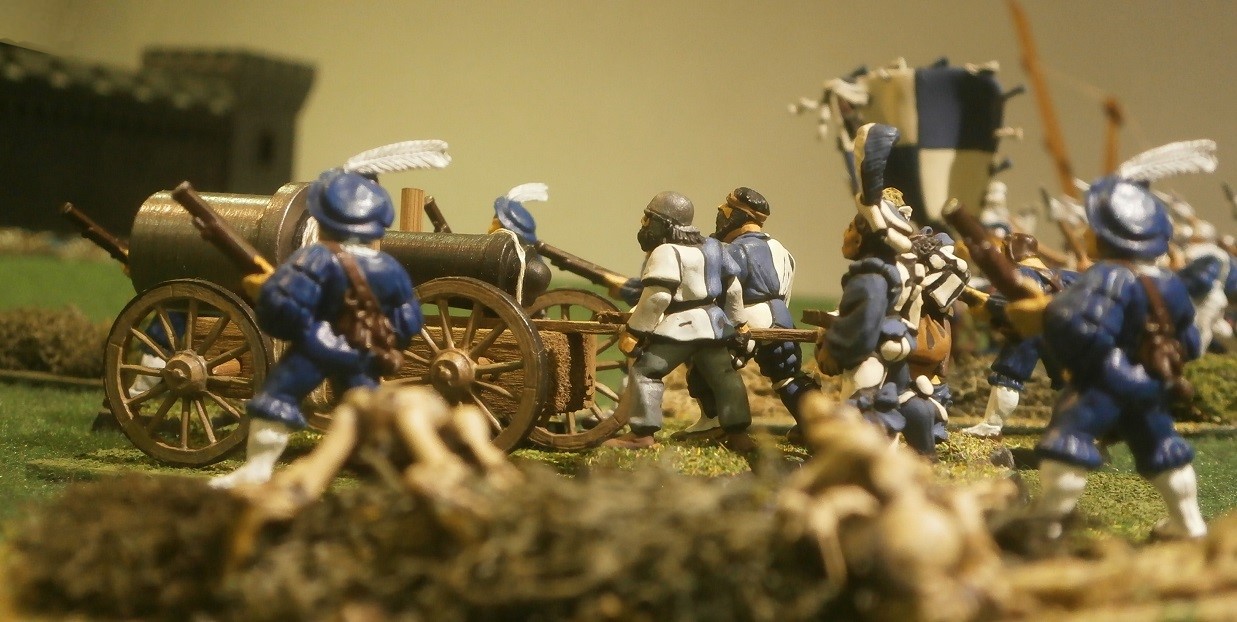
Several handgunners escorted the petard and in its rear the large regiment of spearmen had angled their march to bring them onto the road behind. Biagino’s earlier guess was proving more likely to be correct – they obviously intended to swarm the gate once it was broken.
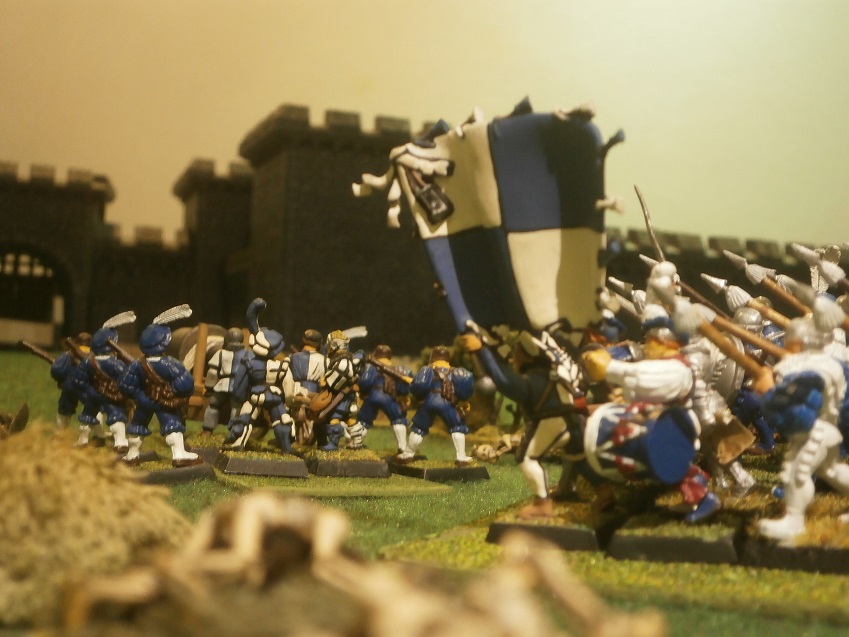
It occurred to him that all the enemy could presently see were stone walls, as if they were attacking an entirely undefended city.
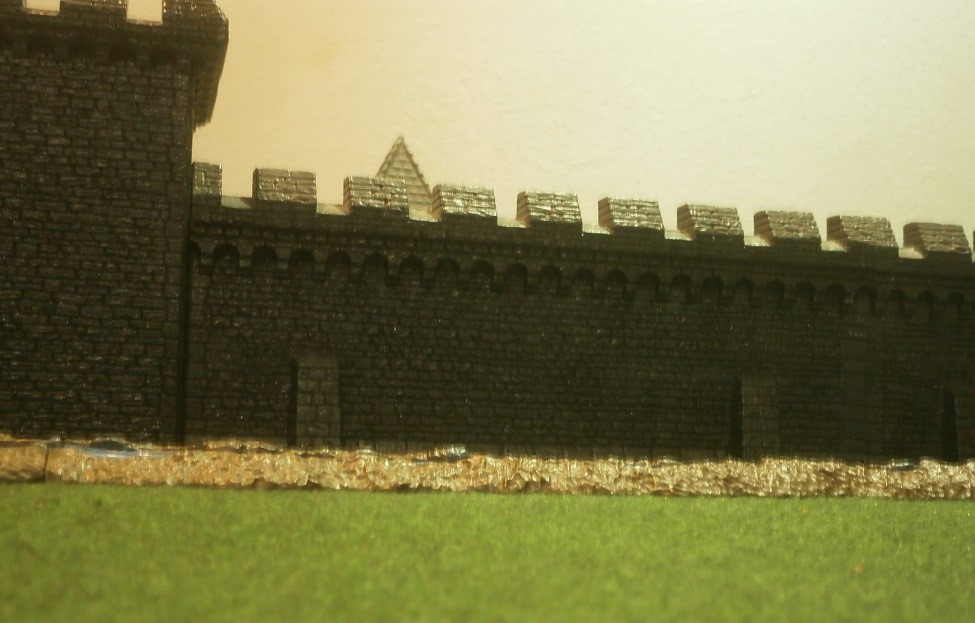
He wondered now whether the sight would encourage or worry them. The living always feared his kind – he remembered feeling that fear himself before receiving the gift of his curse. He laid his hand upon the stone wall, his mighty ally in this fight, and allowed himself a moment to recall his mortal years. What could be learned from his murky memories of that life which might help him here and now? Suddenly, however, his nascent train of thought was lost completely, as pain surged through him, sapping the unholy vigour that sustained his corpse-body in the material world. Clutching tight at the stone to prevent himself falling, he turned to look across the front of the gate at the wall upon the other side.

There was the witch, visibly reeling from a similar shock, and he knew full well what must have happened. Her amateurish bungling of the winds of magic, no doubt intended to supplement the ranks of the osseous warriors below her, had whirled uncontrollably from her grasp and so surged savagely as to sting both her and he!
Hissing in anger, he knew he been weakened by the hurt, before the enemy had so much as fired a shot or loosed a bolt! Why, he asked himself, had he not killed the witch as soon as he found her?
Shaking his head in an effort to clear it, he snuck another peek at the enemy. More time had passed than he had thought – his pain had been quite a distraction – and they were considerably closer than the last time he looked. The colossus strode ahead of all the rest, directly towards the moat. This intrigued Biagino, for he had watched the monstrous artefact move on two previous occasions, and knew its gait was stiff if steady, imbued with a sturdy deliberateness. He would be very surprised if it were able to cross the moat, for such a feat would surely require a nimbleness it did not possess?
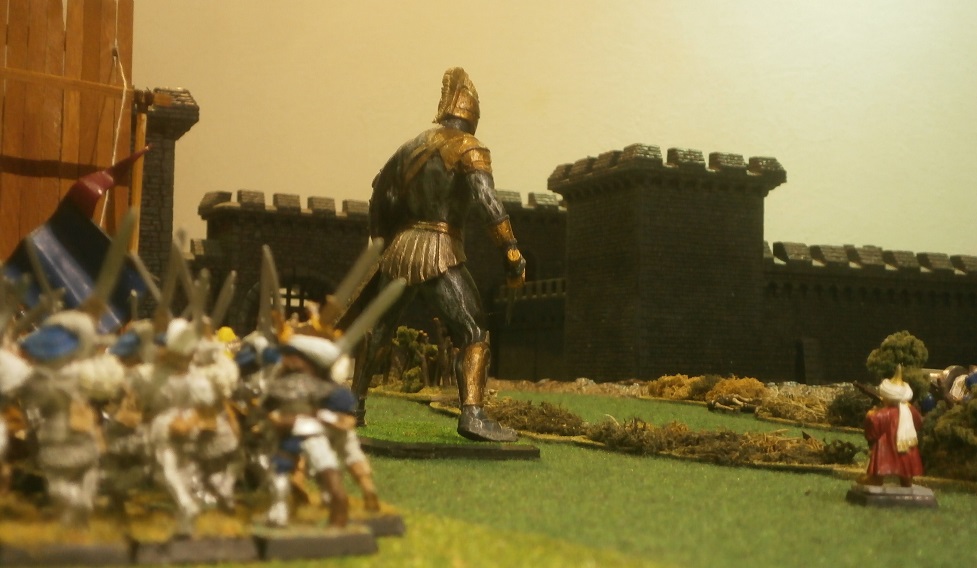
Beside the colossus were two of the moat bridges. Perhaps the enemy intended their metal giant to step over one of those? This too seemed an unlikely prospect, for its weight would surely splinter the timbers to send its foot into the water and so topple the whole?
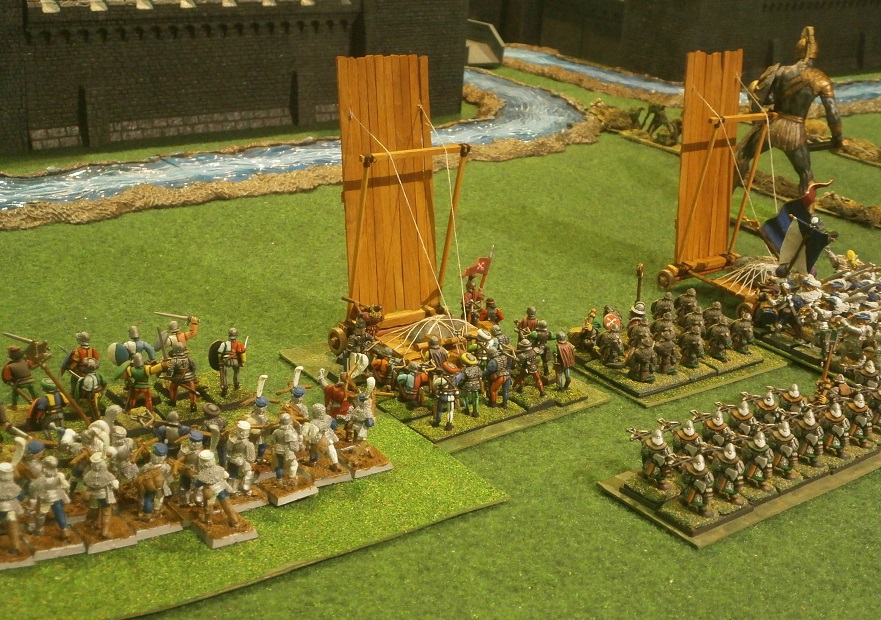
Lurching to one side, still dizzied by the magical harm, Biagino glanced instead at the enemy’s other flank. There the third bridge had made similar progress, pushed by the dismounted noblemen and flanked by more handgunners.
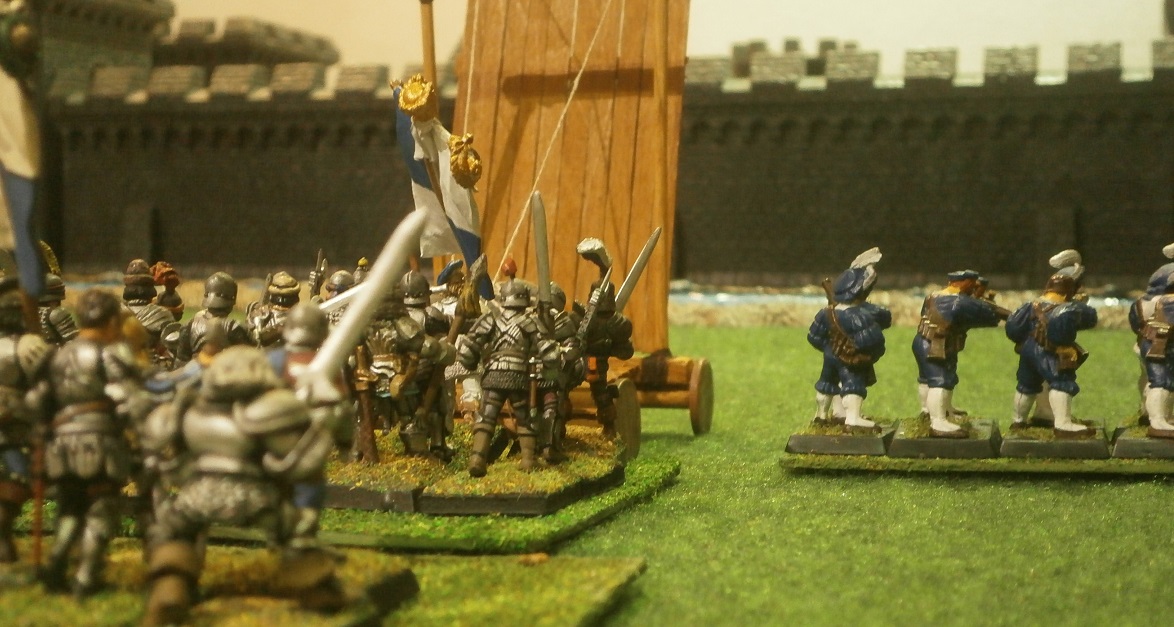
Just then he felt the enemy’s magic – not any harm from it, but merely its use. The etheric winds flowed through the foe, and he realised the fellow he had spied earlier walking behind the colossus, red robed with a white turban, was their strongest wizard. Perhaps it was that man who gave the colossus its purpose, directing its mindless activities? Again, however, he sensed a burning sourness to the etheric flow, just enough to reveal that the enemy had also suffered harm in their attempts at conjuration. At first, he smiled in satisfaction, but that did not last long, for it now occurred to him that something might be tainting the winds of magic, as if to make them noxious, so that his own attempts to cast magic might prove further detrimental to his health.
(Game Note: In turn 1 alone, in the Undead magic phase a miscast roll of 9 had wounded both undead magic users, then in the Living magic phase a similar miscast result wounded Hakim the wizard and all three priests!)
Two loud thuds followed the sound of the enemy’s cannon blasts, announcing the first of their artillery shots, likely intended for the gate but hitting the wall it that bore it. Splinters of stone spattered out to splash in the waters of the moat below. They would have to do much better than that, thought Biagino, then turned to look at the courtyard behind him. There his bambinos, commanded by his thralls, stood waiting, satisfactorily unperturbed by the sound of shooting.

Both Biagino and the witch now thought to cure themselves magically of the injuries they had suffered, but Biagino attempt was quelled by the enemy’s countermagic, while the witch simply fumbled the words of her incantation. No matter, he thought, there is plenty of time yet. At least the winds were becoming more favourable, or at the least, less dangerous to the caster.
Outside the enemy pushed onwards. Unknown to Biagino, Lord Alessio himself commanded his regiment of Sea Wolves, armed with great-swords and clad in plate armour, urging them on as they shoved their burden towards the defences.
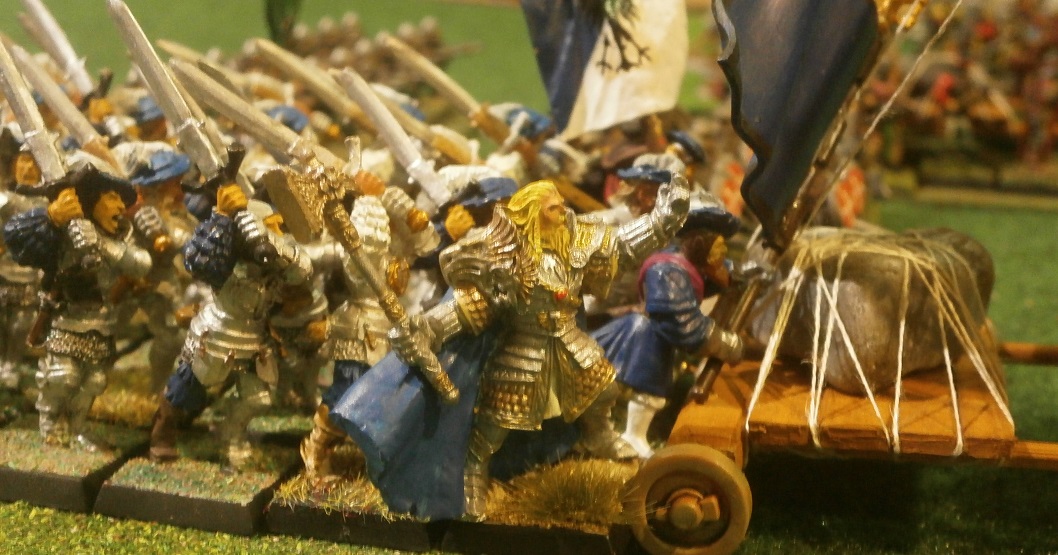
Again, Biagino sensed the workings of the enemy’s magic, and although not all seemed to be successful, he knew that at least one of their spells had come to fruition. If he had been looking over the parapet just then, he would have seen the dismounted knights momentarily move with unnatural swiftness to push their bridge that bit closer to the moat. He did, however, look just in time to see all three moat bridges come crashing down to span the moat. The first had mercenary crossbowmen pushing it …
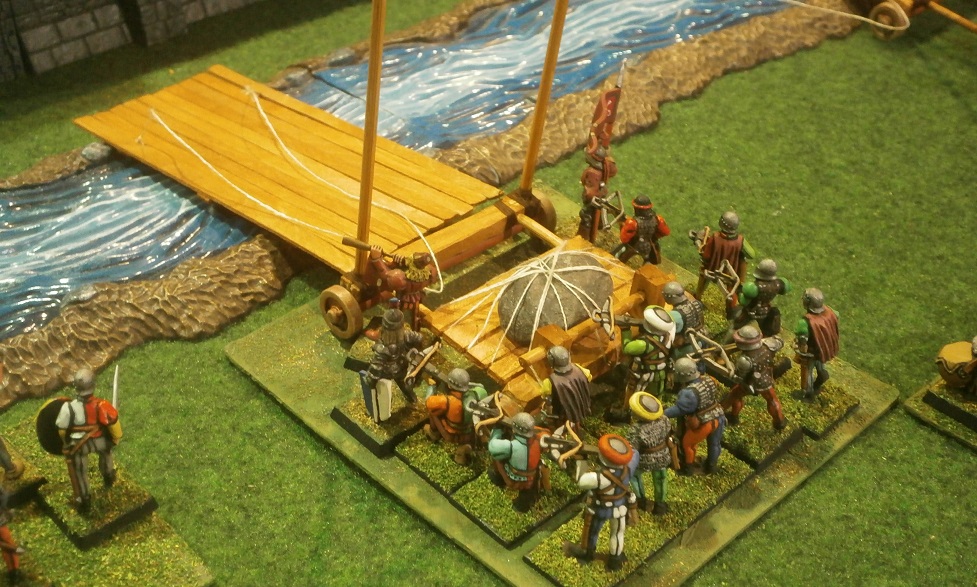
… the second was moved by the plate armoured footsoldiers …
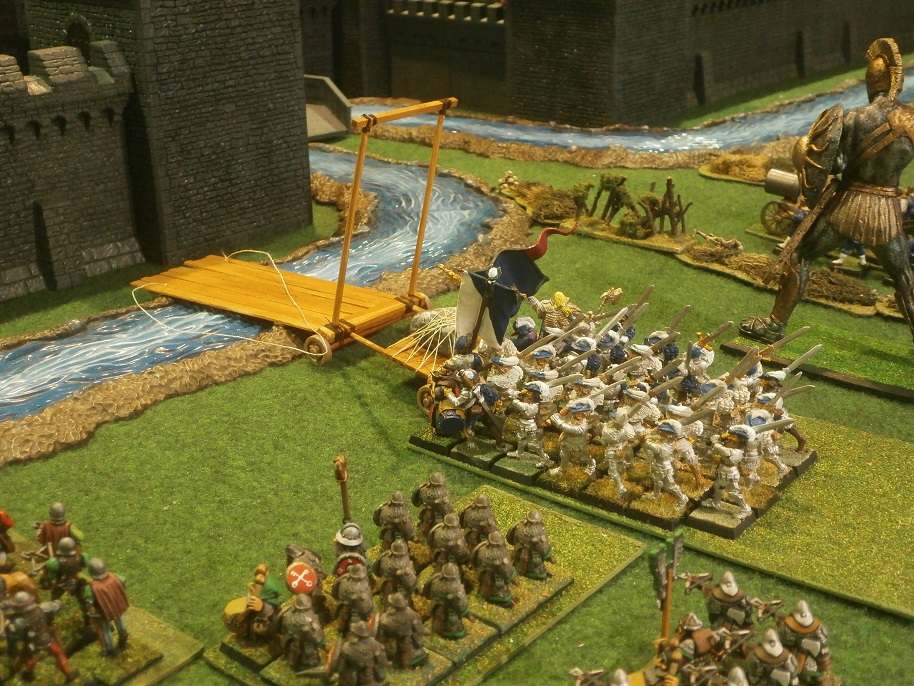
… and the third was accompanied by the dismounted nobility of Portomaggiore.
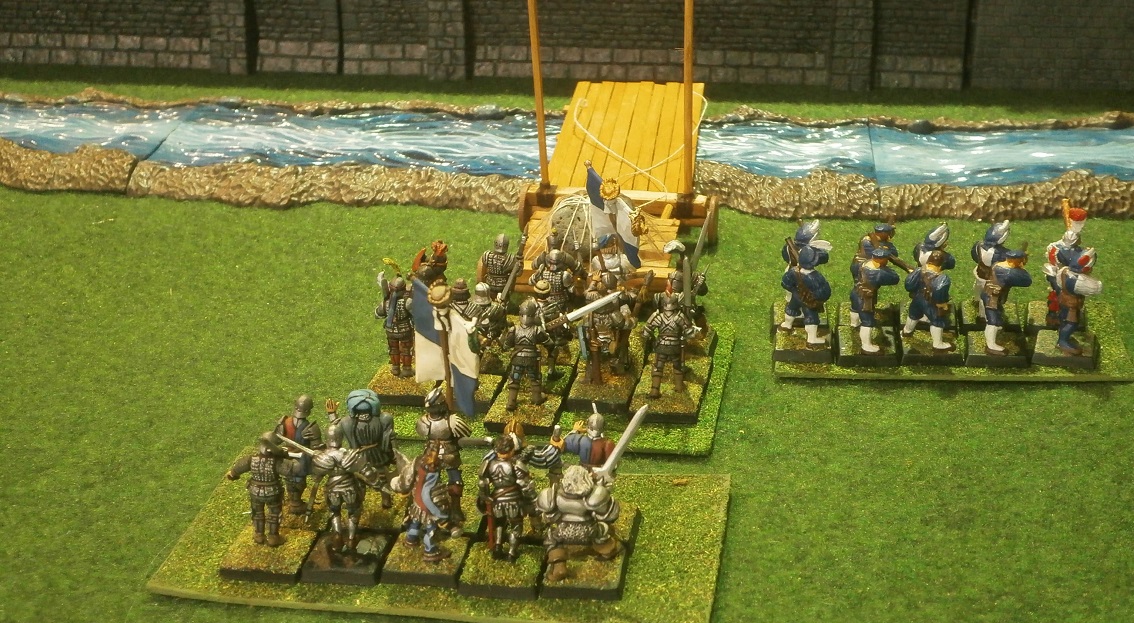
The men at the second, led by their general himself, were champing at the bit to get at the walls, and swiftly pulled aside the bridge’s carriage to allow themselves to begin pouring over it immediately.
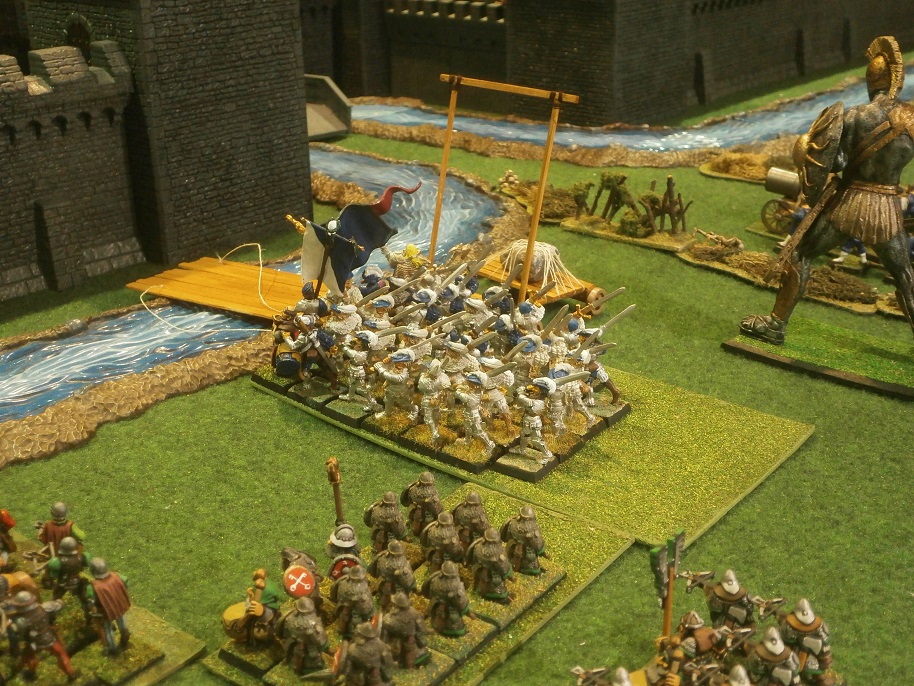
The enemy’s cannons now shifted their aim and lobbed two iron roundshots at the wall to the east of the gate. Once again, the shots buried themselves into the stone, flaring cracks from their points of impact, but the wall stood.
Now, thought Biagino, was the time to mount the walls. His command was unspoken, and indeed little more than a thought, for his bambinos and thralls were like unto marionettes for him to make dance as he pleased. Up went the Disciplinati di Nagash, but not onto the wall targeted by the enemy artillery, which no doubt the enemy intended to breach rather than assault with ladders. There his horde of zombies stayed put, to face whatever attempted to climb through any breach caused. Now the men at the third bridge could see Ebino was not undefended!
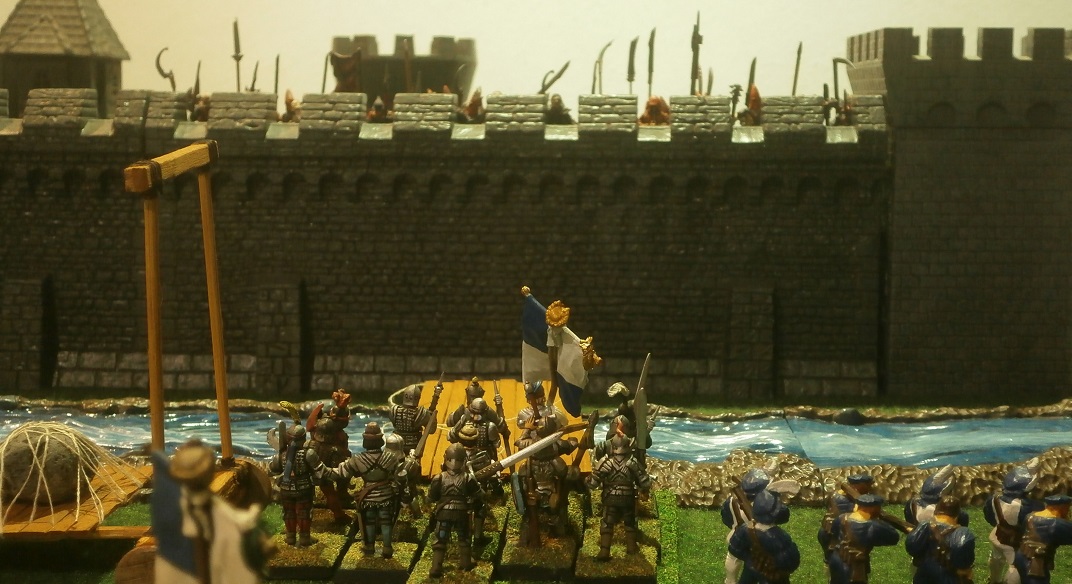
The witch too ordered her city garrison up, so that the enemy commander would be required to do work very hard if he was to take possession of the wall before him.
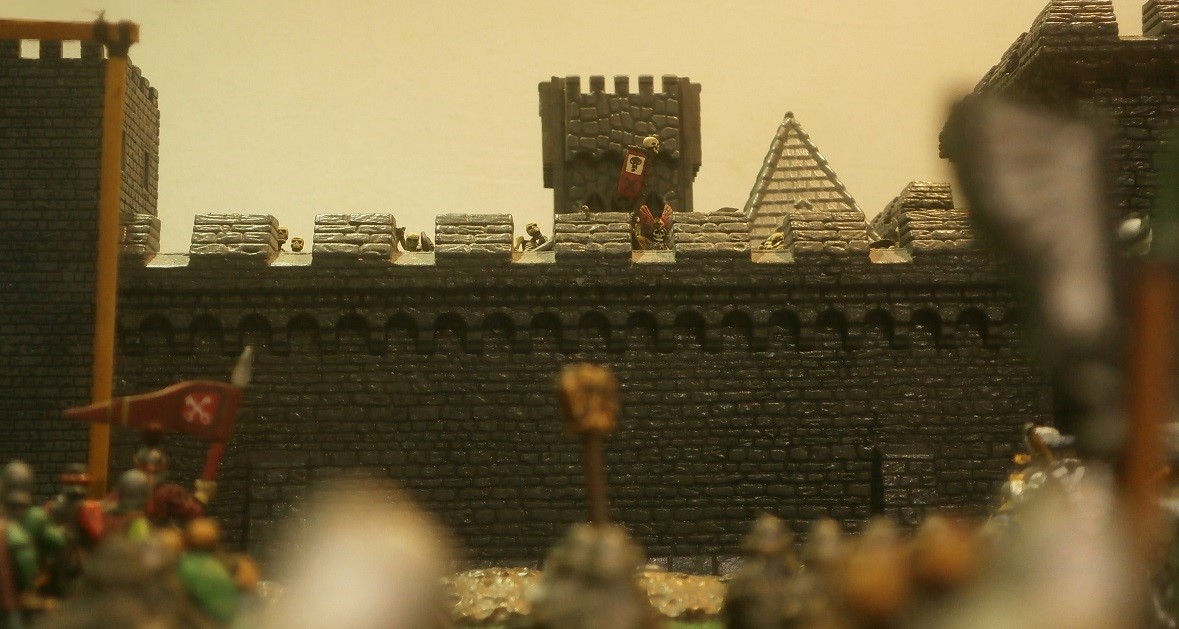
Embarrassed by her earlier failure, perhaps, the witch now wound together as many magical eddies as she could muster to cast the Invocation of Nehek, if only to restore herself to full strength, and so be best prepared to face the fight ahead. But the curse Biagino had sensed earlier still lingered, so that she lost her hold again on the slippery swirl of arcane energies and they spun instead into an uncontrollable maelstrom which once again knocked the (foetid) wind out of her. So befuddled was she by what had happened, she failed entirely to notice that this time, just like the last, several skeletons had indeed been raised to join the ranks of the regiment now climbing onto the wall.
Biagino felt the blow too, and as the pain of his fresh injuries fuelled the fury of his anger, he staggered on the battlements, struggling merely to stay on his feet. Somewhere in his mind, little more than a flicker within the whirling rage engulfing the rest, real doubt had crept in. Perhaps, said a whispered voice, today is not your time after all?
(Game Note: Biagino down to one wound. The witch was a more complicated matter – which began a debate concerning the rules. See the note below this post, but if you do, brace yourself for a full and frantic foray deep into the 8th ed WFB rules!)
As both the undead commanders reeled, Lord General Alessio Falconi of Portomaggiore led his Sea Wolves in a ladder assault of the wall.
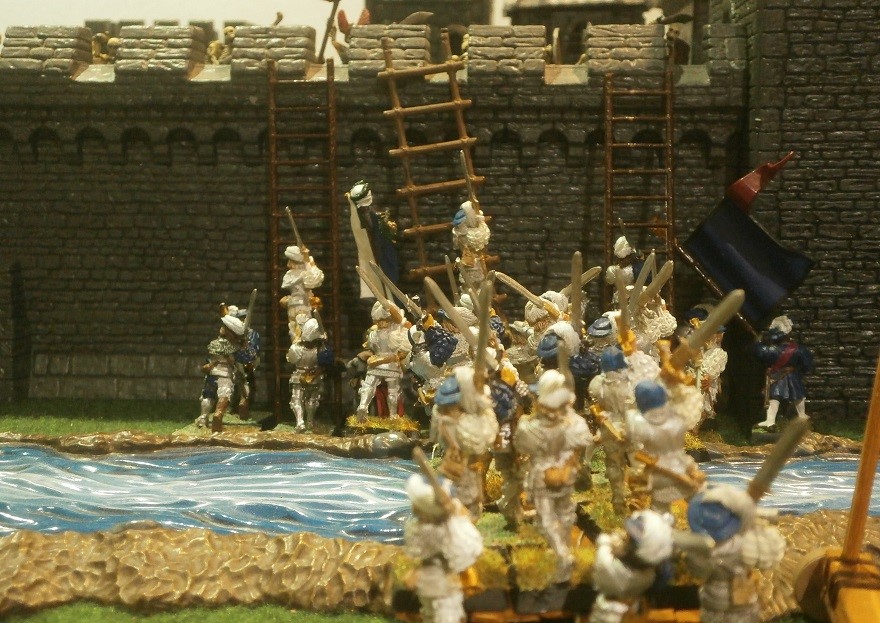
Yet this was the only bridge used for an assault. At the first bridge, the crossbowmen lugged the carriage away to allow a company of skirmishing bravi to cross, led by the Reman brigade’s commander Captain Soldatovya, while at the second the dismounted knights simply waited, watching as another roundshot shook the wall to the left of their bridge. Then they shuddered as a second, louder sound rolled over them, after which they turned to see that one of the guns had shivered apart, killing the crew and master gunner serving it.
(Game Note: Each gun had an ‘artillerist’ serving it, being the Tilean list equivalent of an Empire engineer, the second having bought their ‘mercenary skill’ at double the usual cost as per the rules. Both guns could thus re-roll misfires. Apparently, that does not always save a gun. Statistically I supposed it fails to save a gun 1 in 36 times, or fails to save an already misfired gun 1 in 6 times).
On the road the petard was gaining momentum, its pushers thankful that they had a road to traverse and not rough ground.
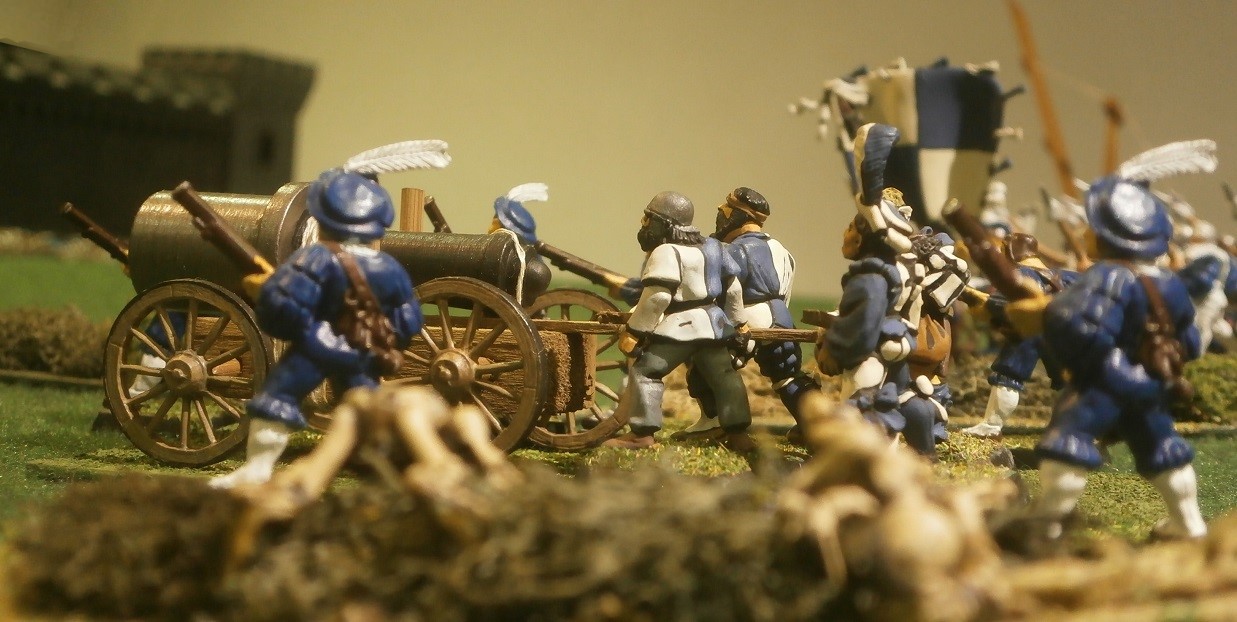
Behind it, the spearmen came on too, with the famous Reman Morrite priest ‘Fighting’ Father Antonello at their head, along with the Portomaggioran nobleman Marcus Portelli.
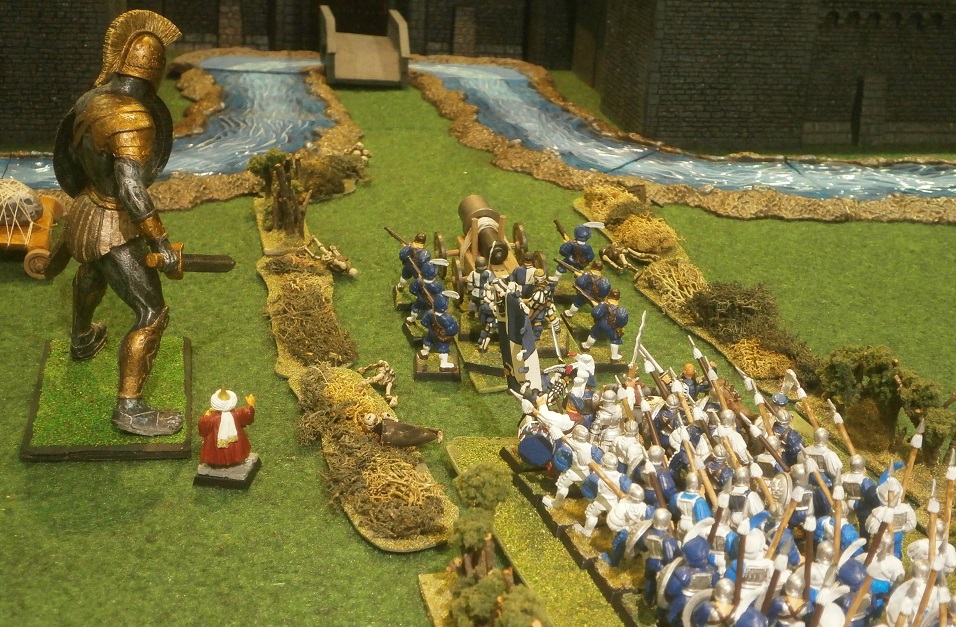
Biagino was vaguely aware of the flow of magic channelled by the enemy, but so dazed was he that he only managed to dispel one of their conjurations, and even then, he knew not what he had prevented. One spell that did get through was a Lore of Light blessing which enlivened the climbing Sea Wolves and perhaps was the reason the fully pate armoured Lord Alessio was the first to top the wall, great hammer in one hand, and commence the first close combat of the assault.
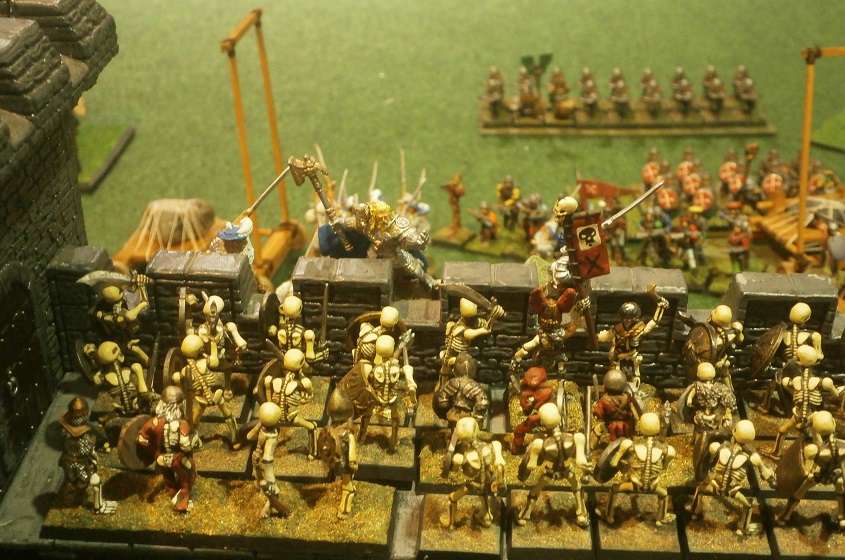
Despite all the advantages gained when defending a wall against ladder climbing attackers (Game Note: And there are a lot!) the attackers, filled with hatred for the foe (being divinely inspired by the presence of the Morrite priest, Father Dado Bendali), enspelled to move with unnatural speed and with their leader armed with an enchanted warhammer, rained down blow after blow. The fleshless defenders began tumbling from the wall in droves.
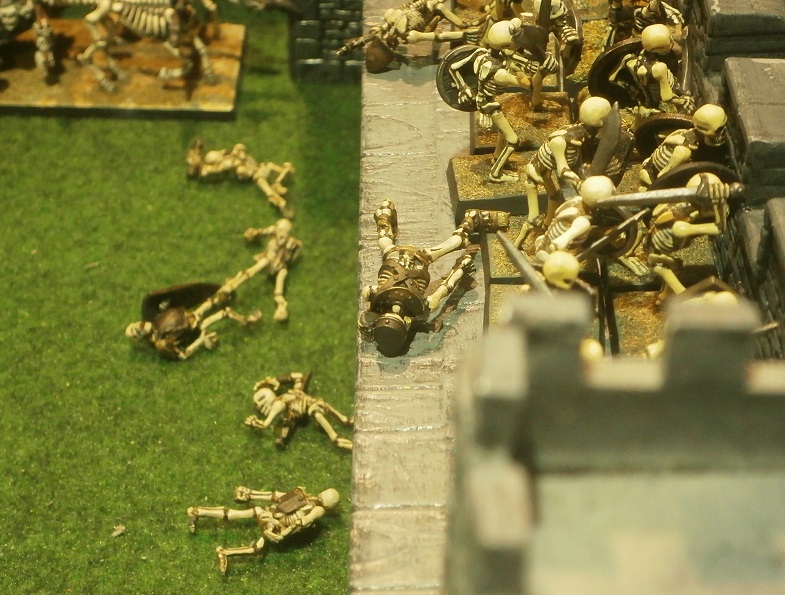
…
Turn 3 Completed. Turns 4-8 to follow!
……………………………………
Appendix to Turns 1 – 3 (for players who like detailed analysis of the rules)
Game Note
The miscasting witch (a level one necromancer) had been on her last wound, but just before I removed the figure as dead, I read the rules. There I was surprised by what I found and did not remove the figure! I began the inevitable debate with the players, which I fully expected as I too had initially believed the witch’s death was surely inevitable, but luckily I had just joined the ‘Eighth Edition For Life’ forum. So, looking for back up from a more knowledgeable and entirely disinterested source, I posted the following in the “Get the Rules Right” section of said forum …
Fidelis Von Sigmaringen, self-styled “Attorney-at-RAW”, who has helped me several times on other forums, reassured me by posting the following …
Here is the next installment!
...
The Assault Begins
Turns 1 – 3
Biagino chanced a better look at the enemy, to ascertain what, if anything, he might have missed before. The wheeled petard was making progress up the road, but at a pace that meant it would be some considerable time before it reached the gate – time he intended to make use of as best he could. His keen eyes could make out that the men pushing it were already tired - even from this distance he could see the throbbing arteries at their throats as their hearts pumped hard and fast to feed their muscles with sanguine sustenance. The thought caused a pang of hunger to suffuse his being – it had been some time since he drank!

Several handgunners escorted the petard and in its rear the large regiment of spearmen had angled their march to bring them onto the road behind. Biagino’s earlier guess was proving more likely to be correct – they obviously intended to swarm the gate once it was broken.

It occurred to him that all the enemy could presently see were stone walls, as if they were attacking an entirely undefended city.

He wondered now whether the sight would encourage or worry them. The living always feared his kind – he remembered feeling that fear himself before receiving the gift of his curse. He laid his hand upon the stone wall, his mighty ally in this fight, and allowed himself a moment to recall his mortal years. What could be learned from his murky memories of that life which might help him here and now? Suddenly, however, his nascent train of thought was lost completely, as pain surged through him, sapping the unholy vigour that sustained his corpse-body in the material world. Clutching tight at the stone to prevent himself falling, he turned to look across the front of the gate at the wall upon the other side.

There was the witch, visibly reeling from a similar shock, and he knew full well what must have happened. Her amateurish bungling of the winds of magic, no doubt intended to supplement the ranks of the osseous warriors below her, had whirled uncontrollably from her grasp and so surged savagely as to sting both her and he!
Hissing in anger, he knew he been weakened by the hurt, before the enemy had so much as fired a shot or loosed a bolt! Why, he asked himself, had he not killed the witch as soon as he found her?
Shaking his head in an effort to clear it, he snuck another peek at the enemy. More time had passed than he had thought – his pain had been quite a distraction – and they were considerably closer than the last time he looked. The colossus strode ahead of all the rest, directly towards the moat. This intrigued Biagino, for he had watched the monstrous artefact move on two previous occasions, and knew its gait was stiff if steady, imbued with a sturdy deliberateness. He would be very surprised if it were able to cross the moat, for such a feat would surely require a nimbleness it did not possess?

Beside the colossus were two of the moat bridges. Perhaps the enemy intended their metal giant to step over one of those? This too seemed an unlikely prospect, for its weight would surely splinter the timbers to send its foot into the water and so topple the whole?

Lurching to one side, still dizzied by the magical harm, Biagino glanced instead at the enemy’s other flank. There the third bridge had made similar progress, pushed by the dismounted noblemen and flanked by more handgunners.

Just then he felt the enemy’s magic – not any harm from it, but merely its use. The etheric winds flowed through the foe, and he realised the fellow he had spied earlier walking behind the colossus, red robed with a white turban, was their strongest wizard. Perhaps it was that man who gave the colossus its purpose, directing its mindless activities? Again, however, he sensed a burning sourness to the etheric flow, just enough to reveal that the enemy had also suffered harm in their attempts at conjuration. At first, he smiled in satisfaction, but that did not last long, for it now occurred to him that something might be tainting the winds of magic, as if to make them noxious, so that his own attempts to cast magic might prove further detrimental to his health.
(Game Note: In turn 1 alone, in the Undead magic phase a miscast roll of 9 had wounded both undead magic users, then in the Living magic phase a similar miscast result wounded Hakim the wizard and all three priests!)
Two loud thuds followed the sound of the enemy’s cannon blasts, announcing the first of their artillery shots, likely intended for the gate but hitting the wall it that bore it. Splinters of stone spattered out to splash in the waters of the moat below. They would have to do much better than that, thought Biagino, then turned to look at the courtyard behind him. There his bambinos, commanded by his thralls, stood waiting, satisfactorily unperturbed by the sound of shooting.

Both Biagino and the witch now thought to cure themselves magically of the injuries they had suffered, but Biagino attempt was quelled by the enemy’s countermagic, while the witch simply fumbled the words of her incantation. No matter, he thought, there is plenty of time yet. At least the winds were becoming more favourable, or at the least, less dangerous to the caster.
Outside the enemy pushed onwards. Unknown to Biagino, Lord Alessio himself commanded his regiment of Sea Wolves, armed with great-swords and clad in plate armour, urging them on as they shoved their burden towards the defences.

Again, Biagino sensed the workings of the enemy’s magic, and although not all seemed to be successful, he knew that at least one of their spells had come to fruition. If he had been looking over the parapet just then, he would have seen the dismounted knights momentarily move with unnatural swiftness to push their bridge that bit closer to the moat. He did, however, look just in time to see all three moat bridges come crashing down to span the moat. The first had mercenary crossbowmen pushing it …

… the second was moved by the plate armoured footsoldiers …

… and the third was accompanied by the dismounted nobility of Portomaggiore.

The men at the second, led by their general himself, were champing at the bit to get at the walls, and swiftly pulled aside the bridge’s carriage to allow themselves to begin pouring over it immediately.

The enemy’s cannons now shifted their aim and lobbed two iron roundshots at the wall to the east of the gate. Once again, the shots buried themselves into the stone, flaring cracks from their points of impact, but the wall stood.
Now, thought Biagino, was the time to mount the walls. His command was unspoken, and indeed little more than a thought, for his bambinos and thralls were like unto marionettes for him to make dance as he pleased. Up went the Disciplinati di Nagash, but not onto the wall targeted by the enemy artillery, which no doubt the enemy intended to breach rather than assault with ladders. There his horde of zombies stayed put, to face whatever attempted to climb through any breach caused. Now the men at the third bridge could see Ebino was not undefended!

The witch too ordered her city garrison up, so that the enemy commander would be required to do work very hard if he was to take possession of the wall before him.

Embarrassed by her earlier failure, perhaps, the witch now wound together as many magical eddies as she could muster to cast the Invocation of Nehek, if only to restore herself to full strength, and so be best prepared to face the fight ahead. But the curse Biagino had sensed earlier still lingered, so that she lost her hold again on the slippery swirl of arcane energies and they spun instead into an uncontrollable maelstrom which once again knocked the (foetid) wind out of her. So befuddled was she by what had happened, she failed entirely to notice that this time, just like the last, several skeletons had indeed been raised to join the ranks of the regiment now climbing onto the wall.
Biagino felt the blow too, and as the pain of his fresh injuries fuelled the fury of his anger, he staggered on the battlements, struggling merely to stay on his feet. Somewhere in his mind, little more than a flicker within the whirling rage engulfing the rest, real doubt had crept in. Perhaps, said a whispered voice, today is not your time after all?
(Game Note: Biagino down to one wound. The witch was a more complicated matter – which began a debate concerning the rules. See the note below this post, but if you do, brace yourself for a full and frantic foray deep into the 8th ed WFB rules!)
As both the undead commanders reeled, Lord General Alessio Falconi of Portomaggiore led his Sea Wolves in a ladder assault of the wall.

Yet this was the only bridge used for an assault. At the first bridge, the crossbowmen lugged the carriage away to allow a company of skirmishing bravi to cross, led by the Reman brigade’s commander Captain Soldatovya, while at the second the dismounted knights simply waited, watching as another roundshot shook the wall to the left of their bridge. Then they shuddered as a second, louder sound rolled over them, after which they turned to see that one of the guns had shivered apart, killing the crew and master gunner serving it.
(Game Note: Each gun had an ‘artillerist’ serving it, being the Tilean list equivalent of an Empire engineer, the second having bought their ‘mercenary skill’ at double the usual cost as per the rules. Both guns could thus re-roll misfires. Apparently, that does not always save a gun. Statistically I supposed it fails to save a gun 1 in 36 times, or fails to save an already misfired gun 1 in 6 times).
On the road the petard was gaining momentum, its pushers thankful that they had a road to traverse and not rough ground.

Behind it, the spearmen came on too, with the famous Reman Morrite priest ‘Fighting’ Father Antonello at their head, along with the Portomaggioran nobleman Marcus Portelli.

Biagino was vaguely aware of the flow of magic channelled by the enemy, but so dazed was he that he only managed to dispel one of their conjurations, and even then, he knew not what he had prevented. One spell that did get through was a Lore of Light blessing which enlivened the climbing Sea Wolves and perhaps was the reason the fully pate armoured Lord Alessio was the first to top the wall, great hammer in one hand, and commence the first close combat of the assault.

Despite all the advantages gained when defending a wall against ladder climbing attackers (Game Note: And there are a lot!) the attackers, filled with hatred for the foe (being divinely inspired by the presence of the Morrite priest, Father Dado Bendali), enspelled to move with unnatural speed and with their leader armed with an enchanted warhammer, rained down blow after blow. The fleshless defenders began tumbling from the wall in droves.

…
Turn 3 Completed. Turns 4-8 to follow!
……………………………………
Appendix to Turns 1 – 3 (for players who like detailed analysis of the rules)
Game Note
The miscasting witch (a level one necromancer) had been on her last wound, but just before I removed the figure as dead, I read the rules. There I was surprised by what I found and did not remove the figure! I began the inevitable debate with the players, which I fully expected as I too had initially believed the witch’s death was surely inevitable, but luckily I had just joined the ‘Eighth Edition For Life’ forum. So, looking for back up from a more knowledgeable and entirely disinterested source, I posted the following in the “Get the Rules Right” section of said forum …
Here is a ruling I have (as GM) just made in the play-by-email game we are running right now.
A Vampire Count's army level 1 necromancer had only 1 wound left after a previous turn's miscast had caused a S6 hit on him.
The necromancer now irresistibly casts 'Invocation of Nehek'. The Lore attribute 'Curse of Undeath' says that "When a spell from the Lore of the Vampires is successfully cast, the wizard (or another friendly model with 12 inches) instantly recovers a single wound lost earlier in the battle". The WFB core rulebook says (p.33) "A spell cast with irresistible force automatically succeeds..." so it is a 'success'. And (p.34) it says that one should "... first resolve the effects of the spell the wizard was attempting to cast ... [&] The casting player can enjoy the effects of his spell before something ... bad happens to the wizard ..." so the spell's effects are sorted before rolling on the miscast table.
Thus I ruled that in terms of ‘rules as written’ (RAW), exactly in the order stated in the rules, the necromancer casts the spell successfully, instantly recovers her wound (part of the effects of the spell which the rules say she must 'enjoy' first), then when she then rolled 9 on the Miscast table and received another S6 wound, wounding her on a roll of 2, she goes back to 1 wound.
I checked and rechecked, made sure of the actual wording, and this seemed right. The non-vampire player however, disagreed, saying "As it is a lore bonus that happens after the spell" BUT as there is a GM in the game he then graciously wrote "but that is an argument for over a cold beer so happy with [the GM's] view of the rules”.
I was very glad we could carry on. And [was] reminded how having a GM can really help (although we once lost a player from the campaign over his annoyance at army lists, etc)
I had tried to fully research the decision and felt I had gained a level of clarity that meant I didn't even think we should 'roll to decide'. However, I knew that my [own] initial perception before reading all the rules was that he surely must die and so I had dreaded the debate …
Fidelis Von Sigmaringen, self-styled “Attorney-at-RAW”, who has helped me several times on other forums, reassured me by posting the following …
Your judgment was correct. As specified in their respective rules, different Lore Attributes take effect at different times. It can be:
- when the spell is being cast by the Wizard (e.g. Wildheart, Kindleflame)
- when the spell has been cast succesfully (e.g. Lifebloom)
- when the spell is being resolved (e.g. Metalshifting, Exorcism, Roiling Skies)
- after the spell has been resolved (e.g. Smoke and Mirrors, Life Leeching).
It can even be later in the same Magic phase, when a spell is being cast by another Wizard. Indeed, it can even be in a later Magic phase (Roiling Skies in the case of Casandora’s Comet per FAQ – an error IMHO).
The relevant rules have already been quoted above:
Vampire AB p.60: "When a spell from the Lore of the Vampires is successfully cast, the Wizard (or another friendly model within 12 ") instantly recovers a single Wound lost earlier in the battle."
BRB p. 34: "When irresistible force occurs, first resolve the effect of the spell that the Wizard was attempting to cast. As the spell has been cast with irresistible force, the casting player can at least enjoy the effect of his spell before something almost indescribably bad happens to the Wizard and everyone nearby. Once the effect of the spell has been resolved, the Wizard now needs to roll 2D6 on the Miscast table to see what happens to him."
As far as I can tell, the BRB does not specifically state that the Lore Attribute as such is a spell effect, but it is indicated in the description of Roiling skies (BRB p. 497): "When a spell from the Lore of Heavens targets an enemy flying unit or a model with the Fly special rule, the target suffers , D6 Strength 4 hits, in addition to any other effects caused by the spell" (Italics mine).
In any case, the Curse of Undeath Lore Attribute takes instantly effect when the spell has been successfully cast, ergo before the spell resolution, ergo before rolling on the miscast table.
symphonicpoet
Moderator
Oh, bravo! You have built the suspense through a masterful crescendo. What storms will follow in the development, I wonder? Whose motives inverted and fragmented, and whose elongated and repeated in glorious sequenza? (Why I suddenly feel like using the Italian, or should I say Tilean? I cannot say.) Well done, Padre, well done!
